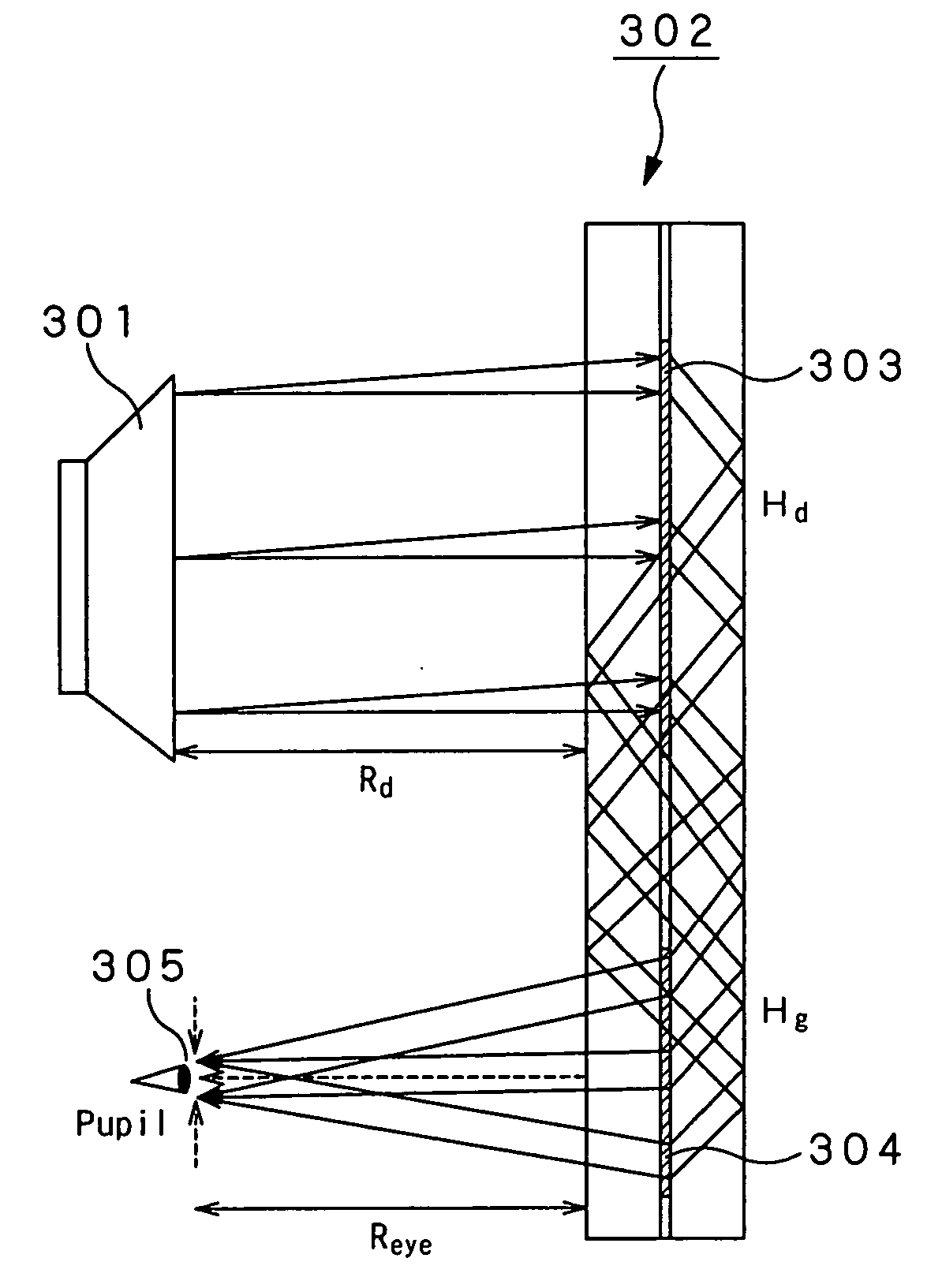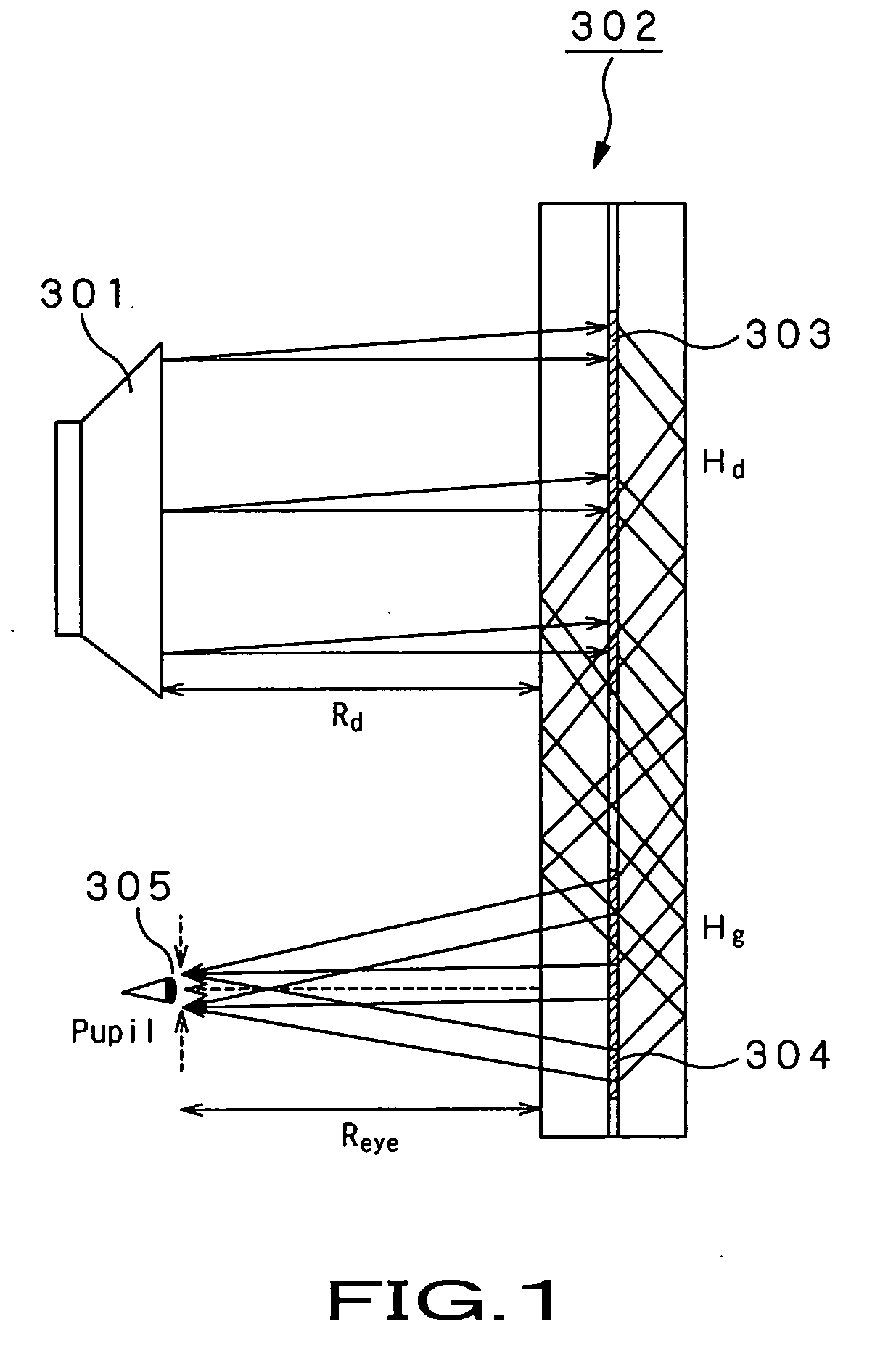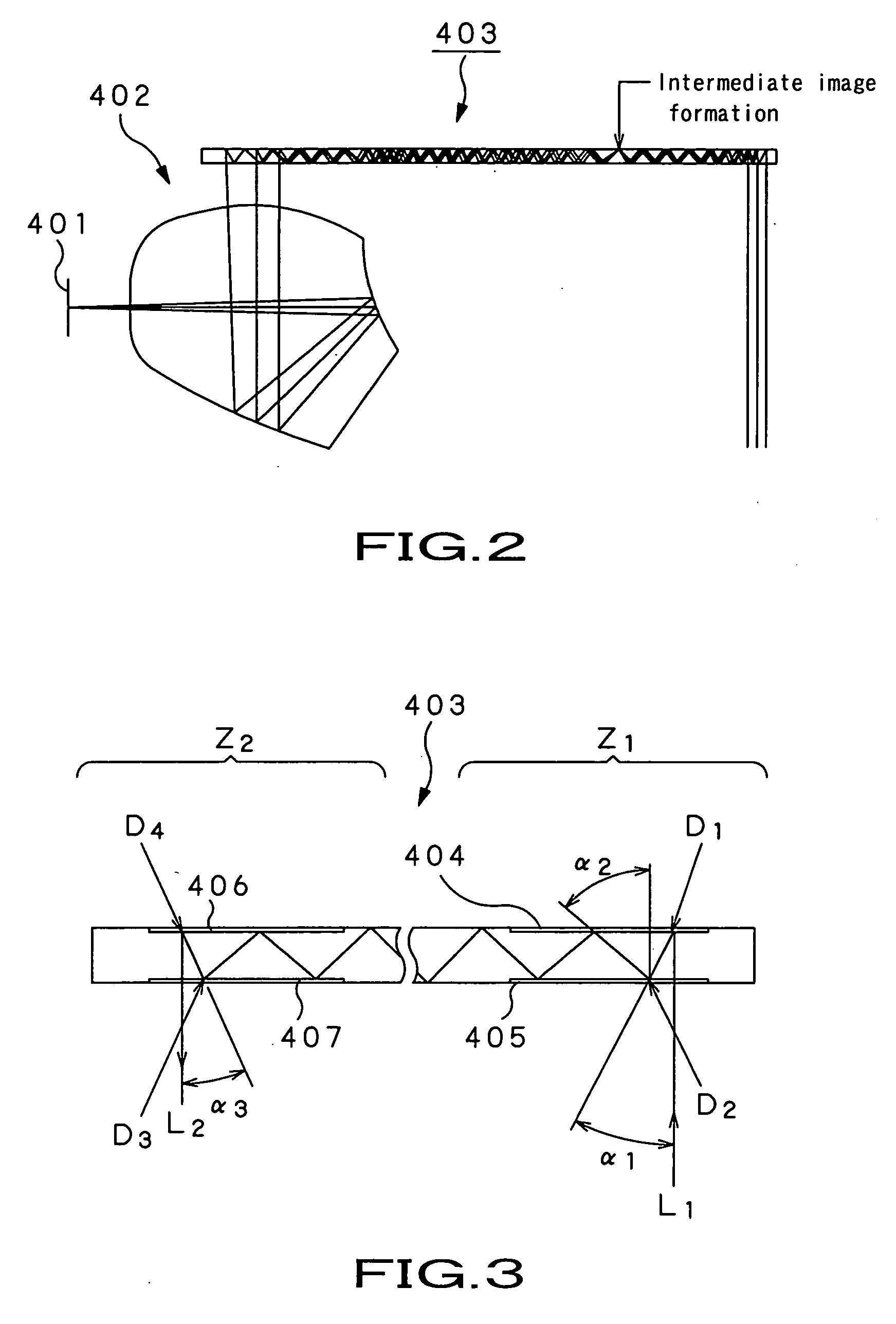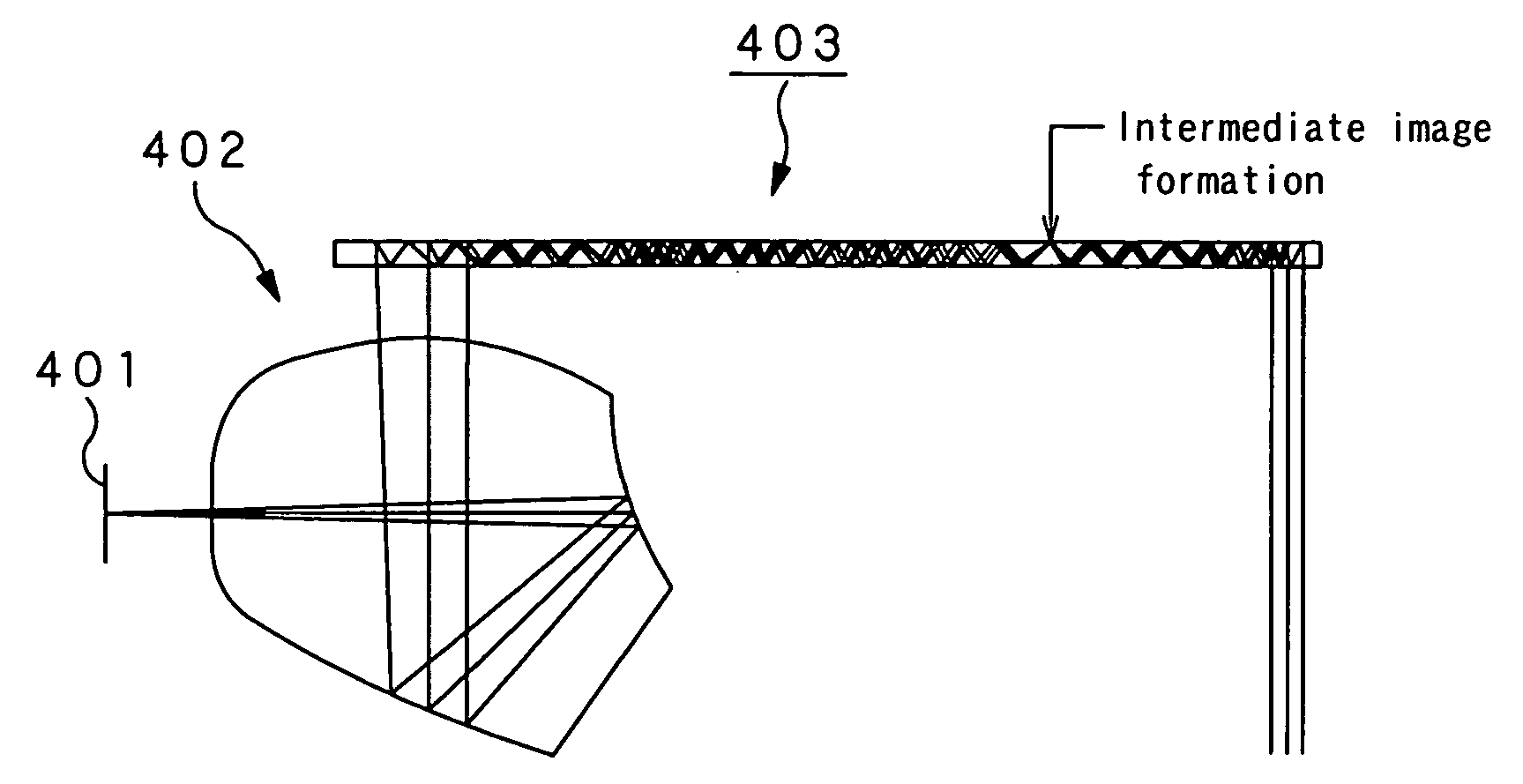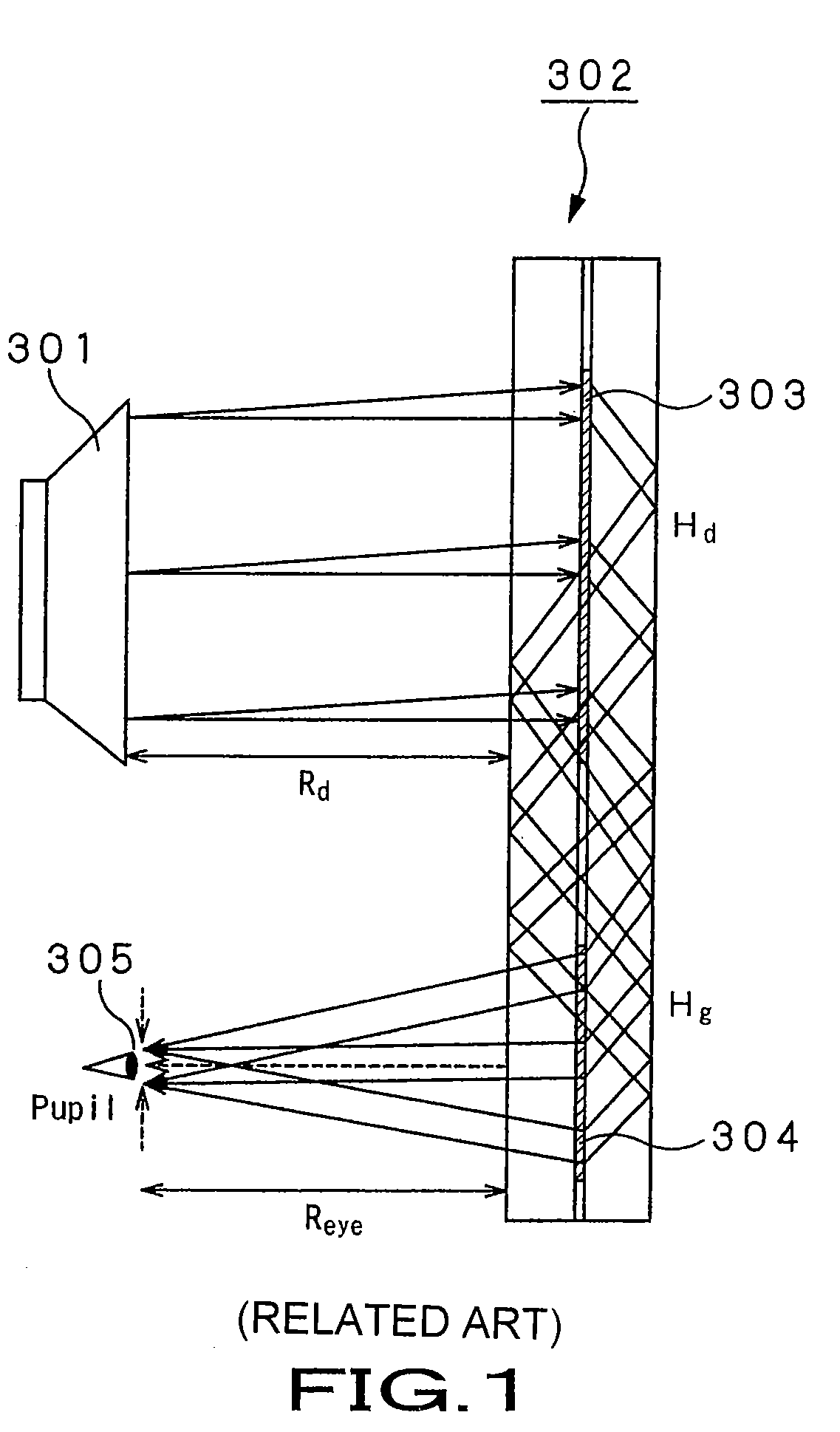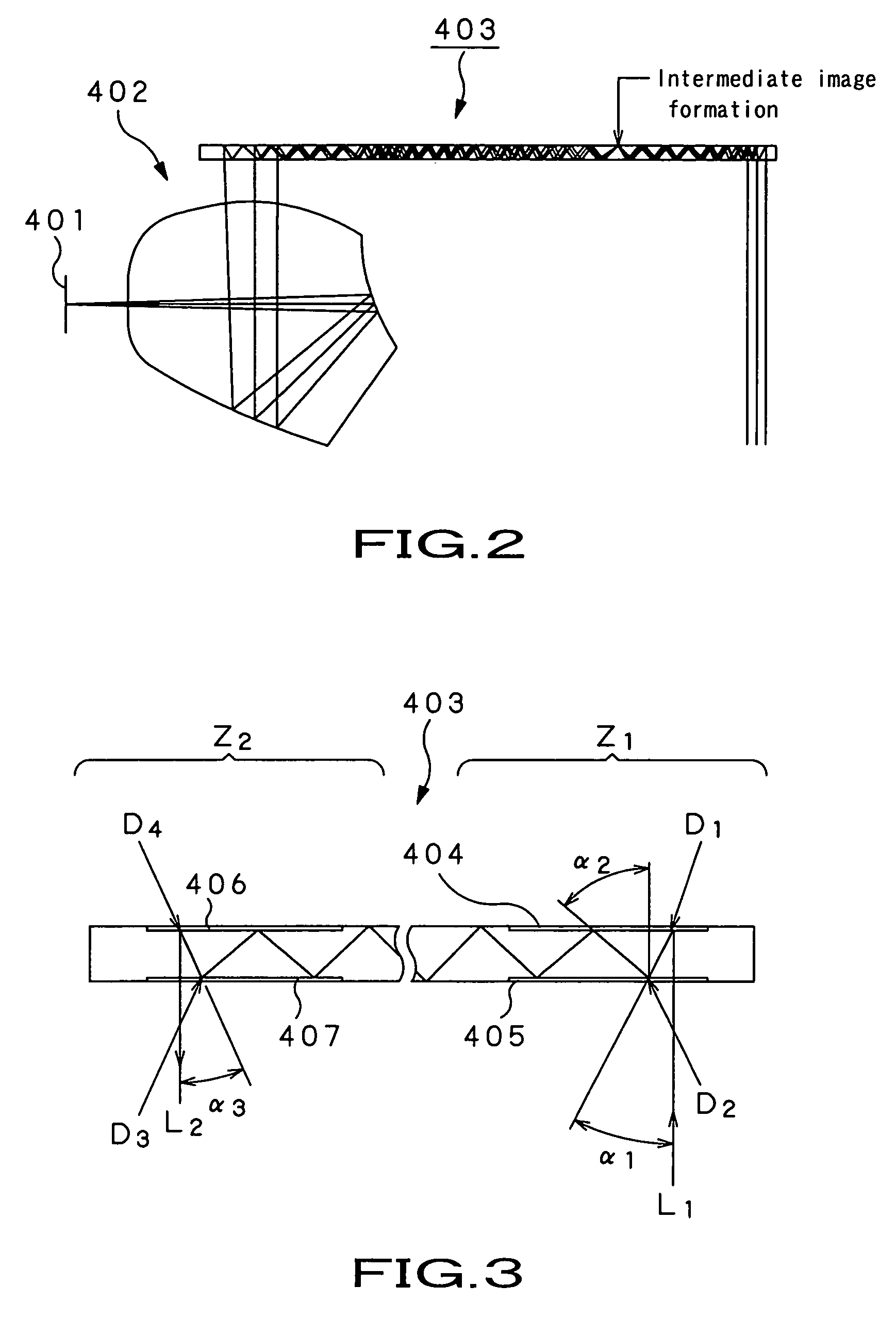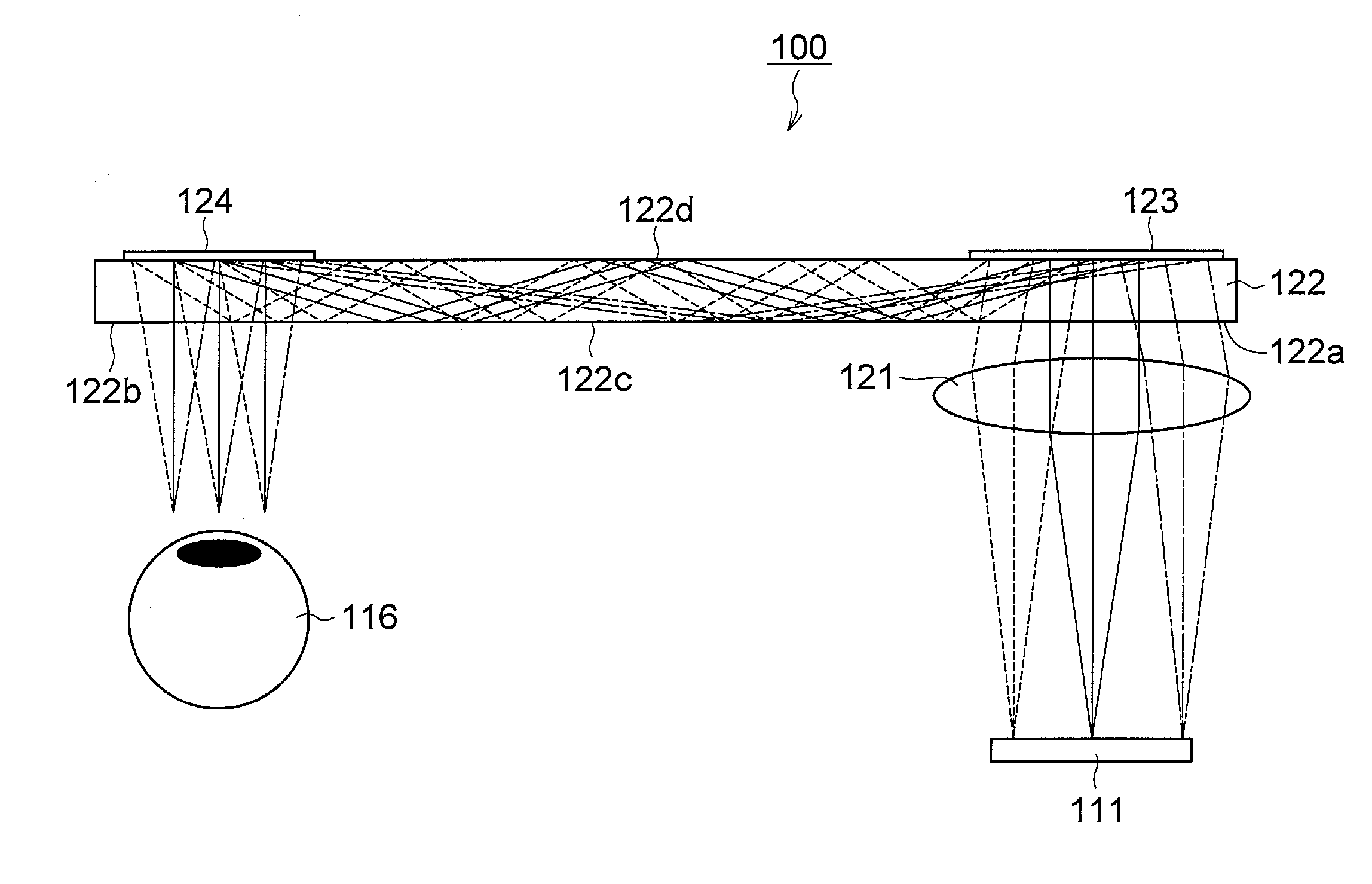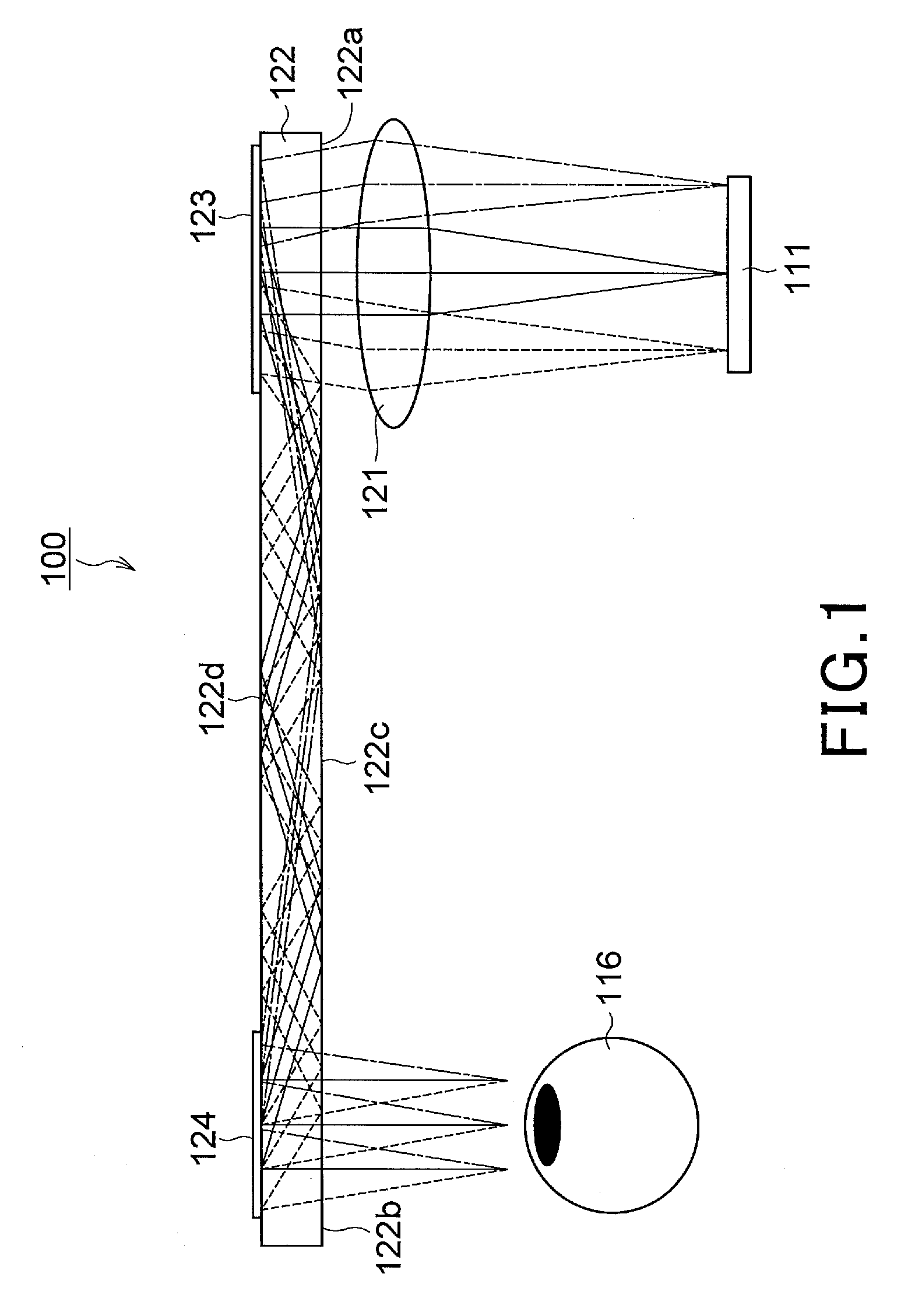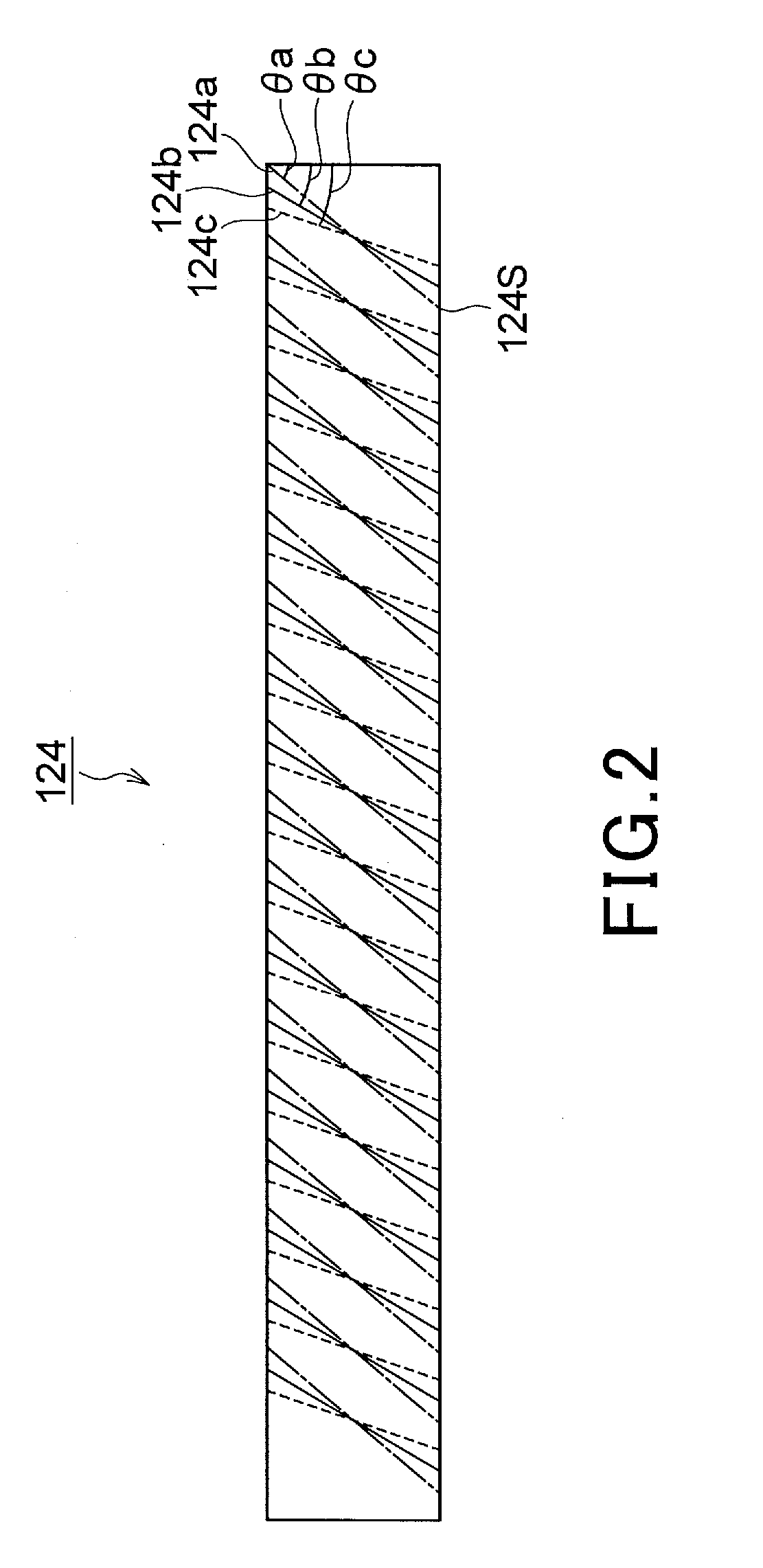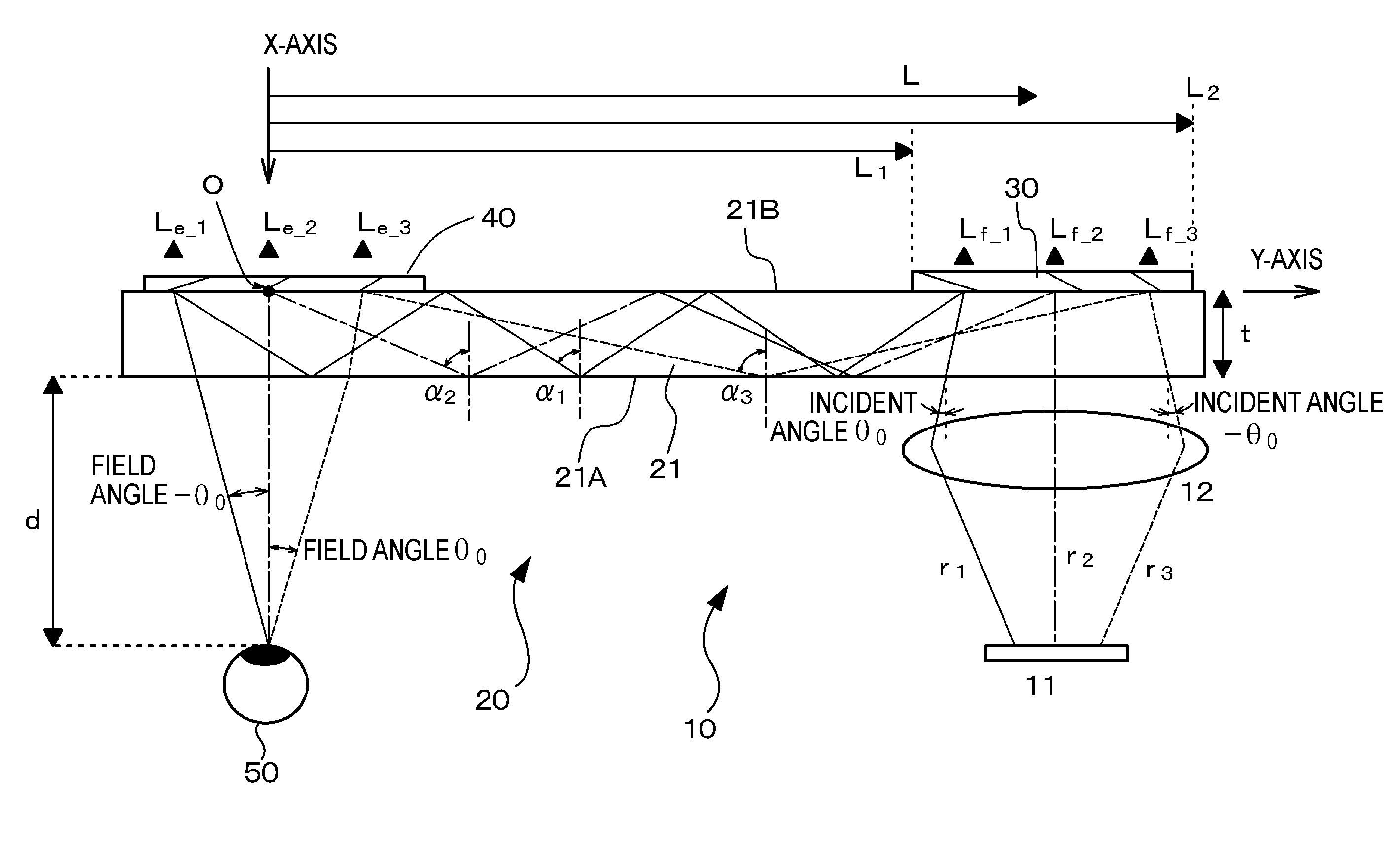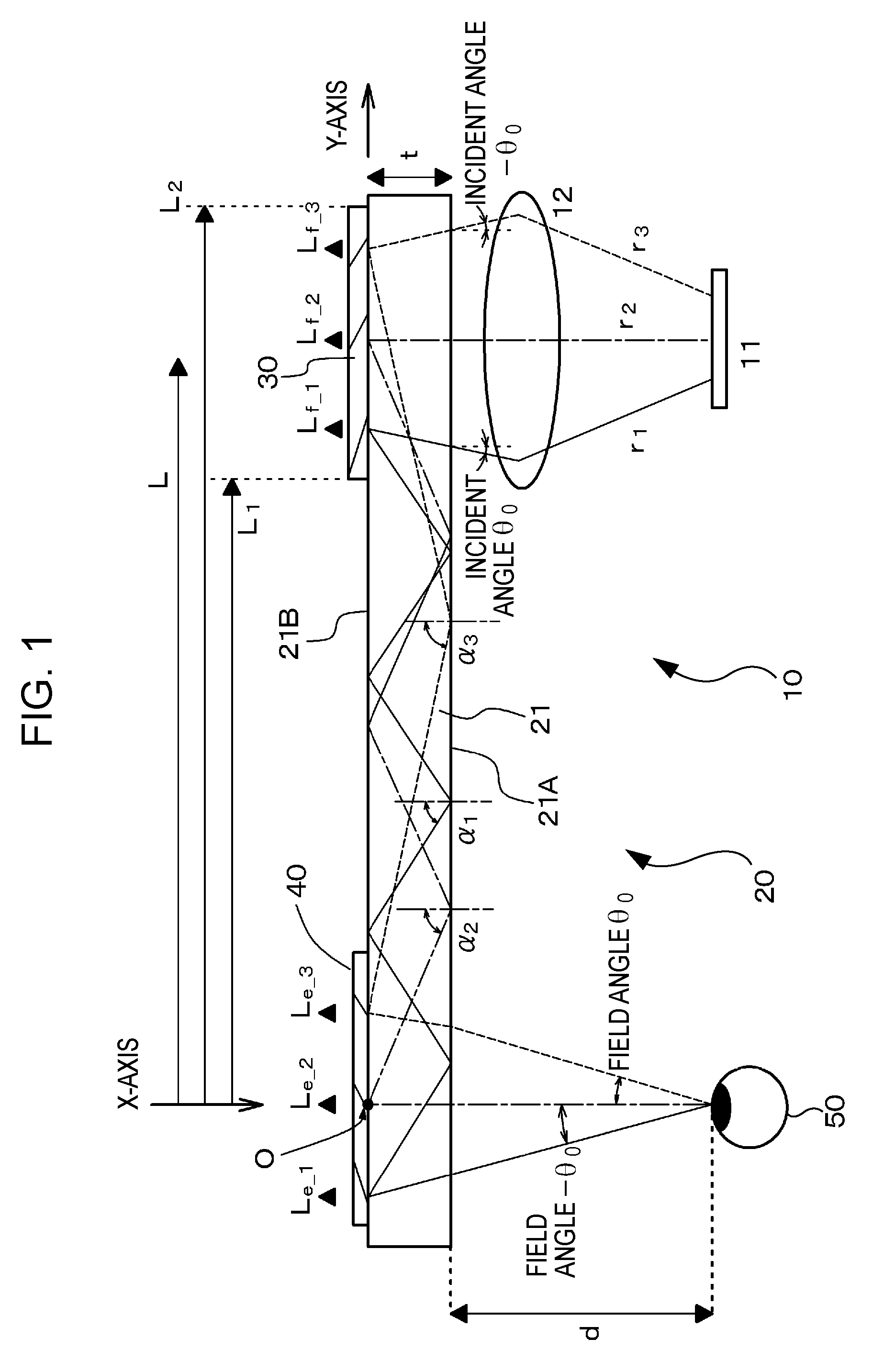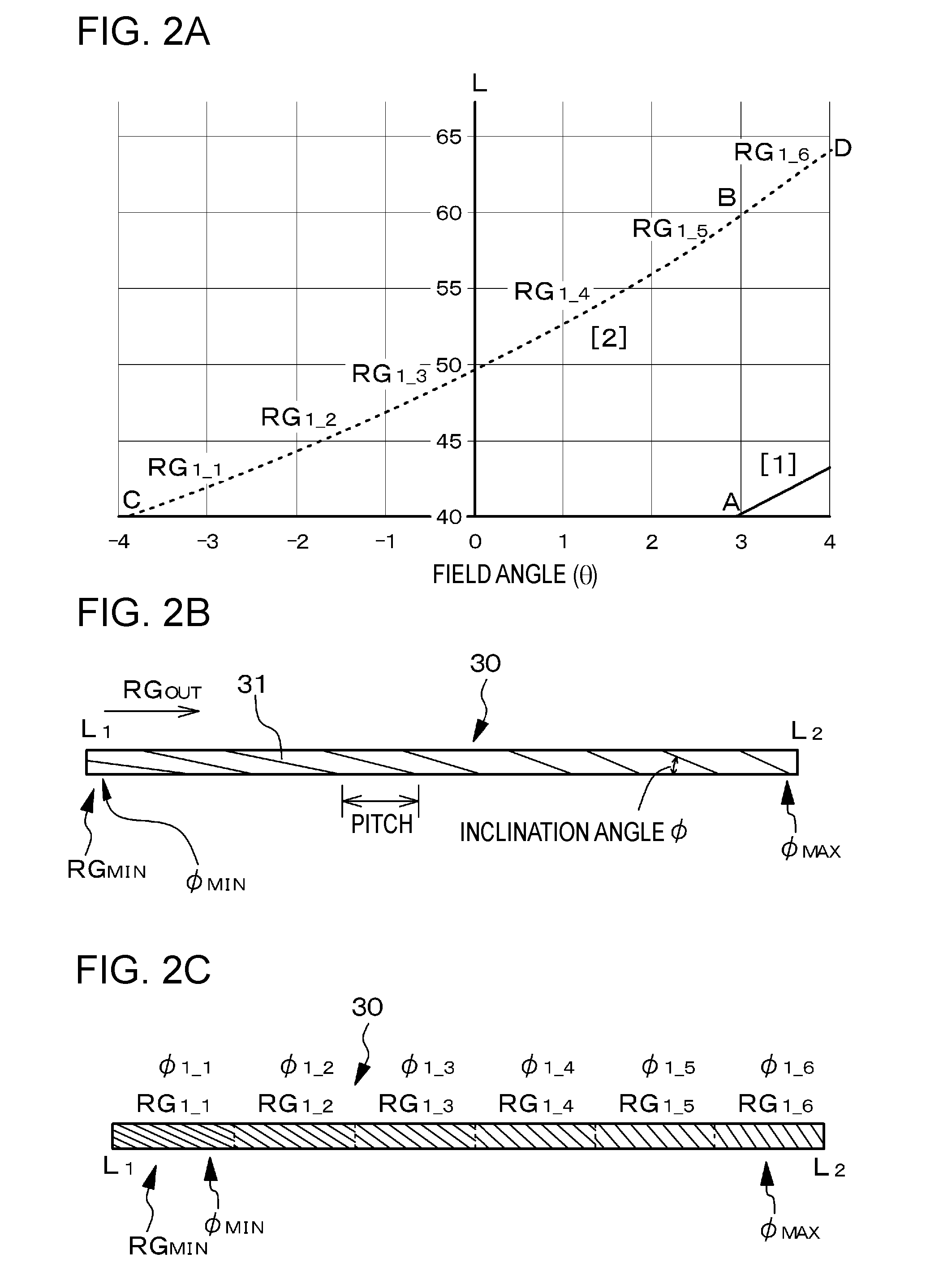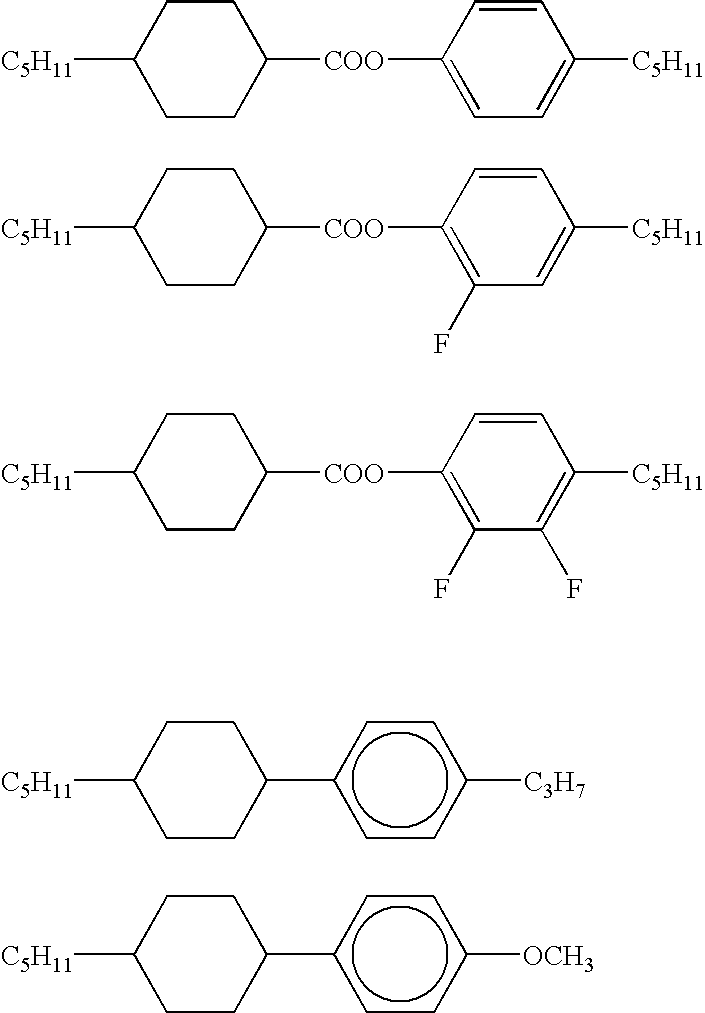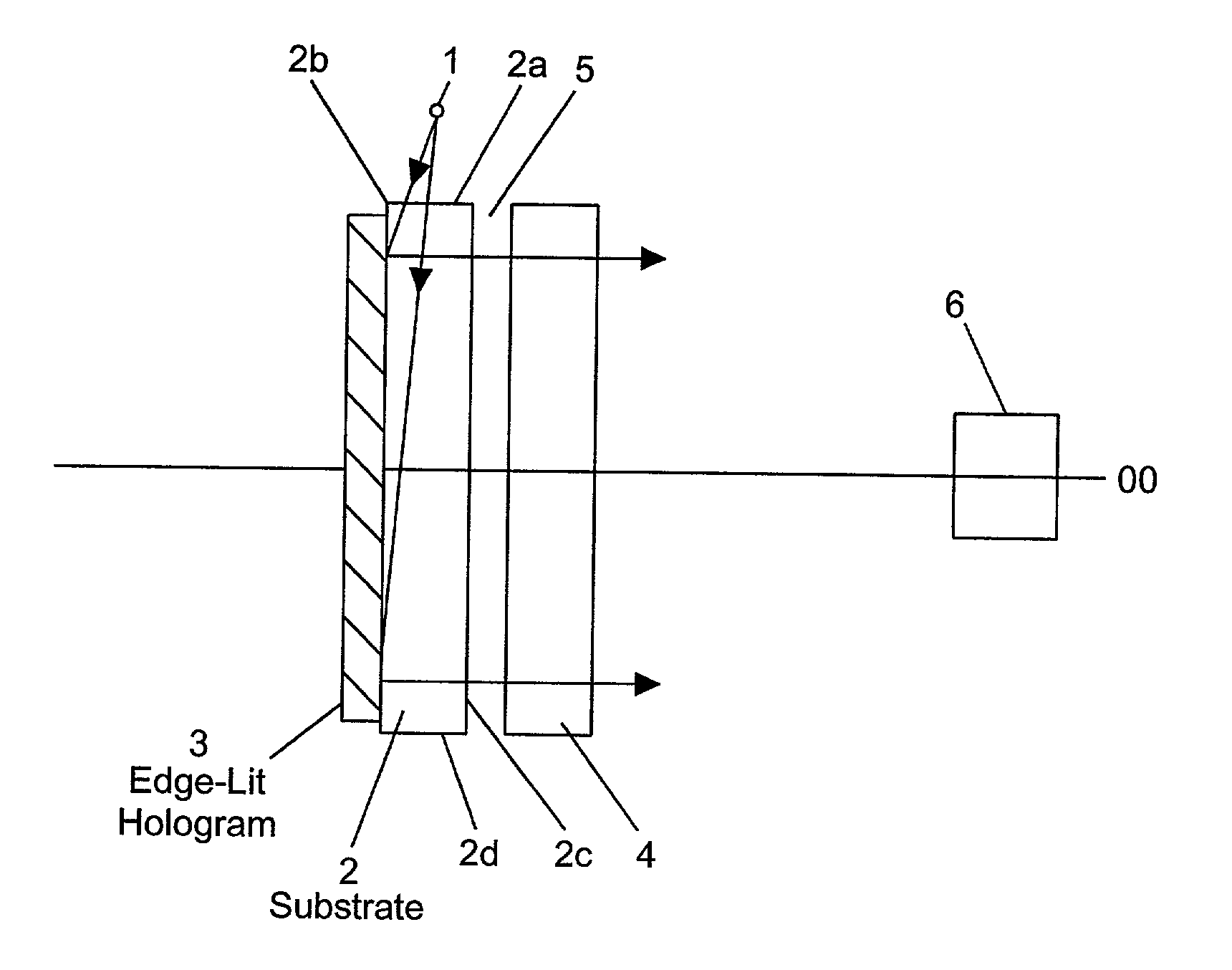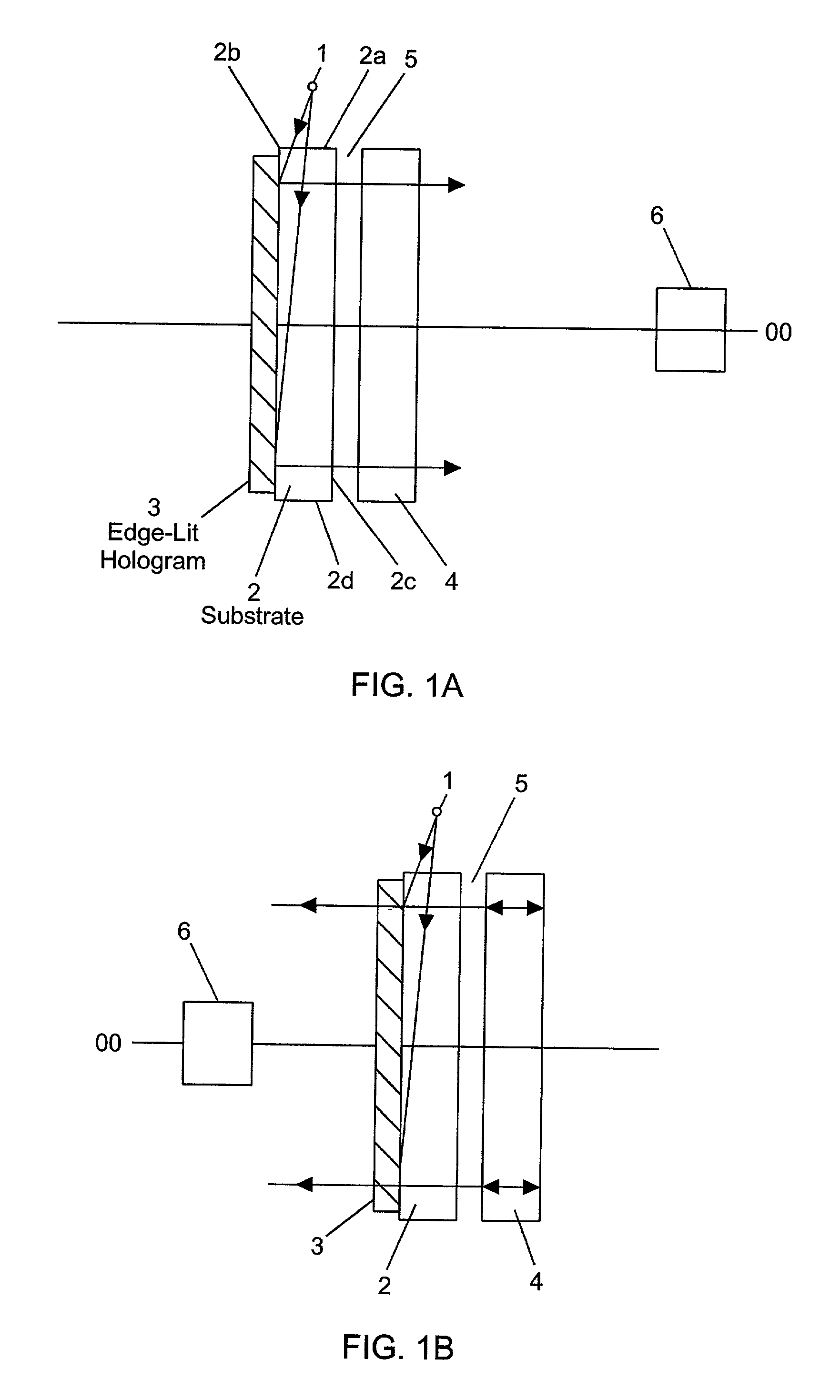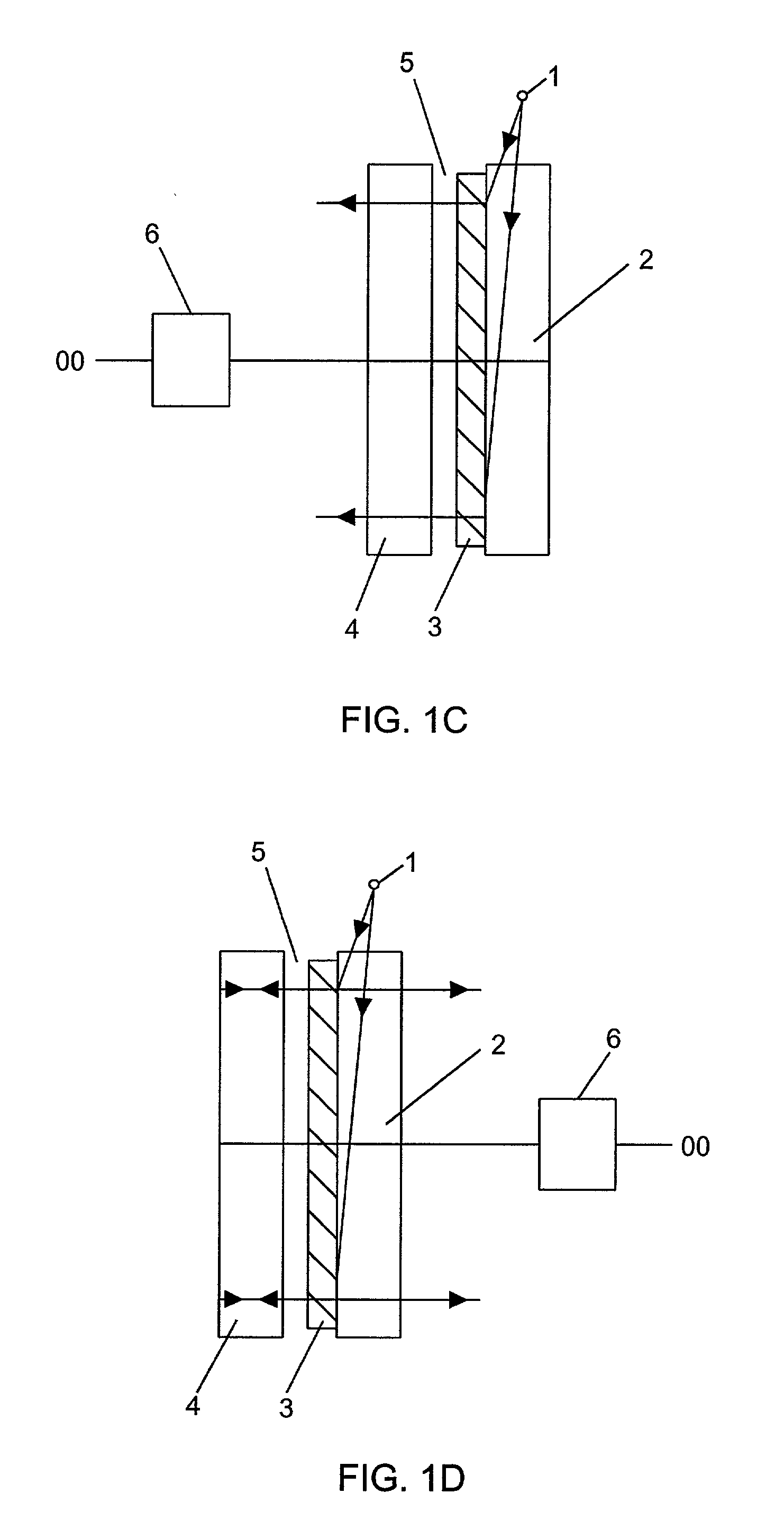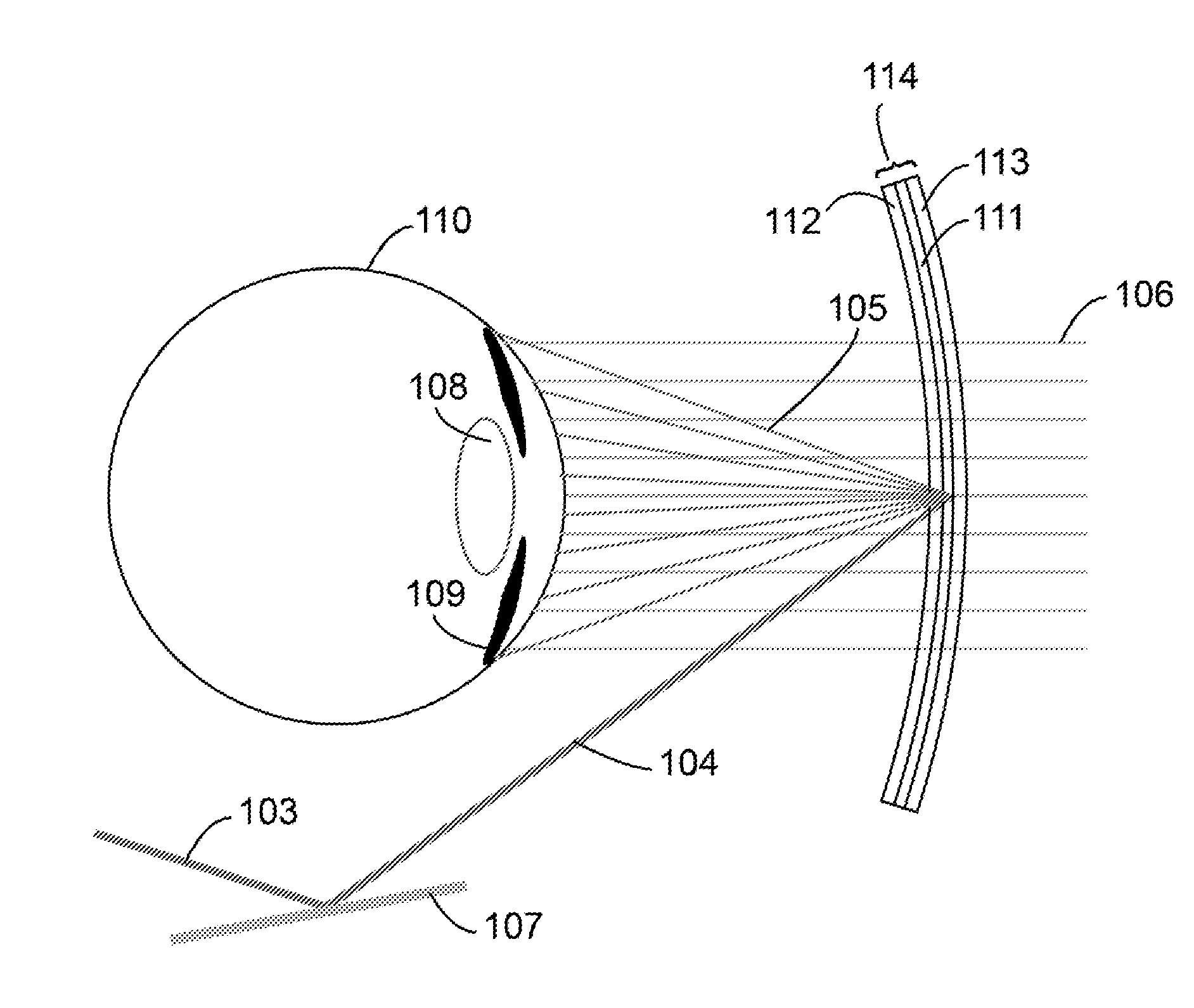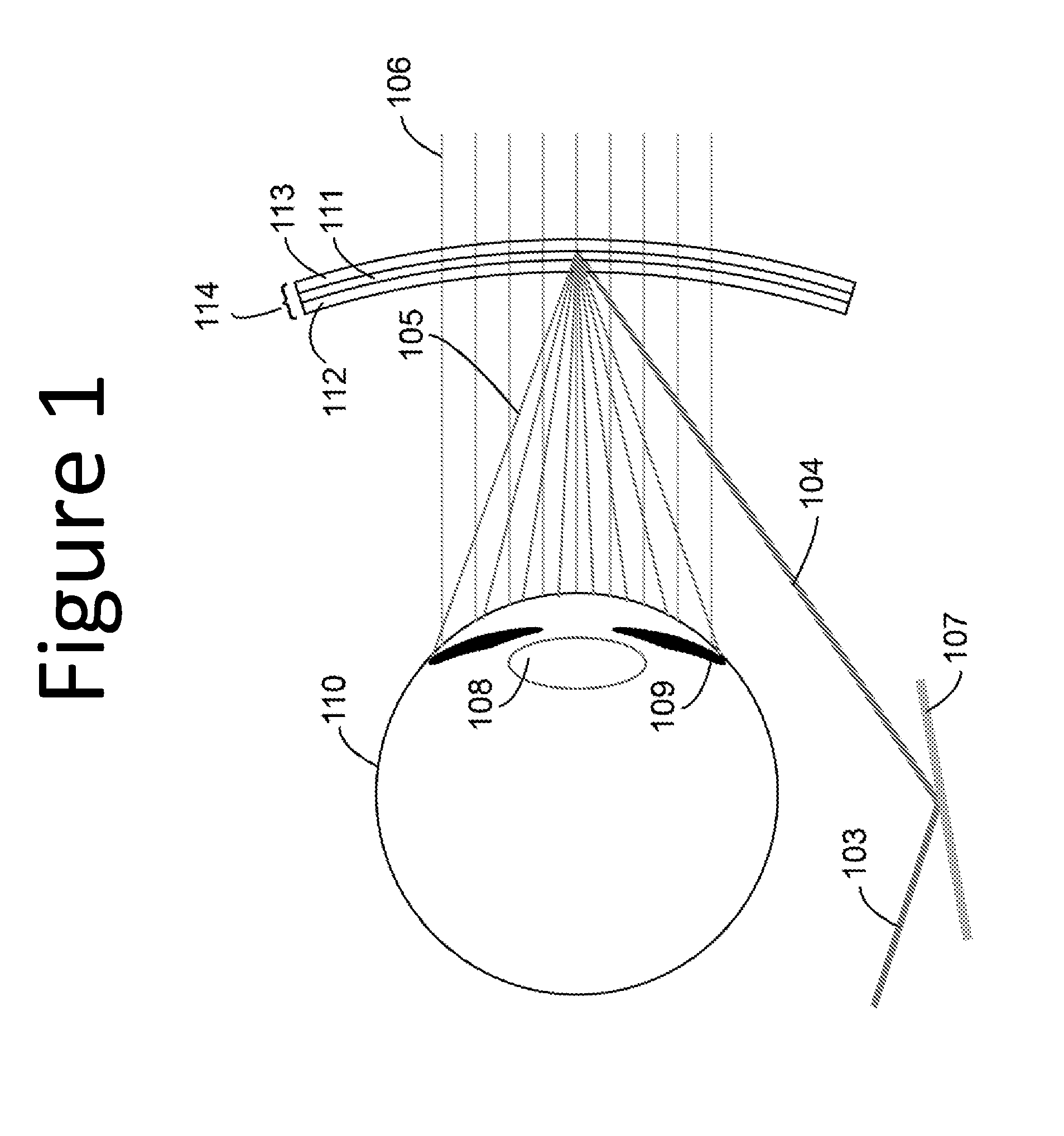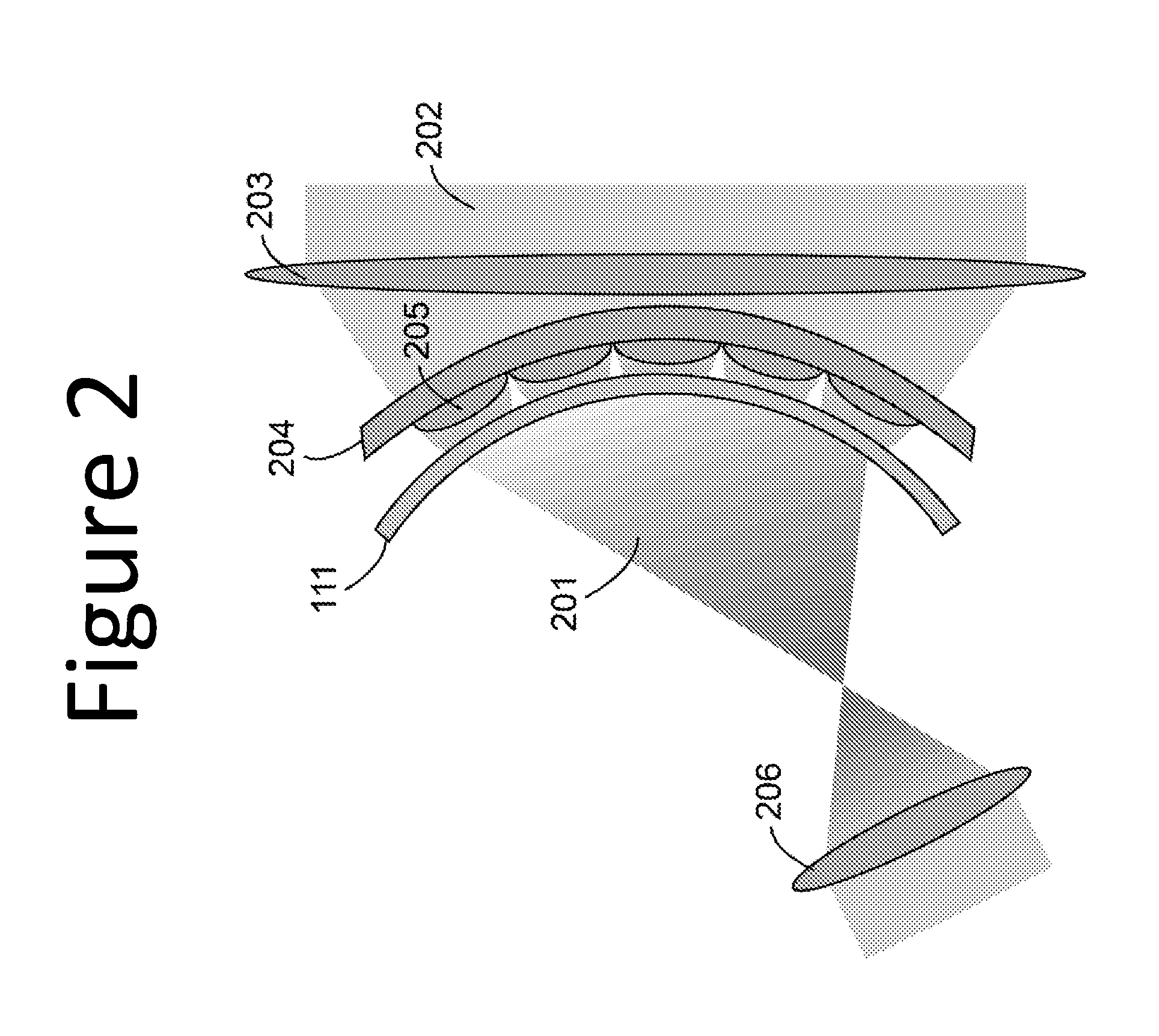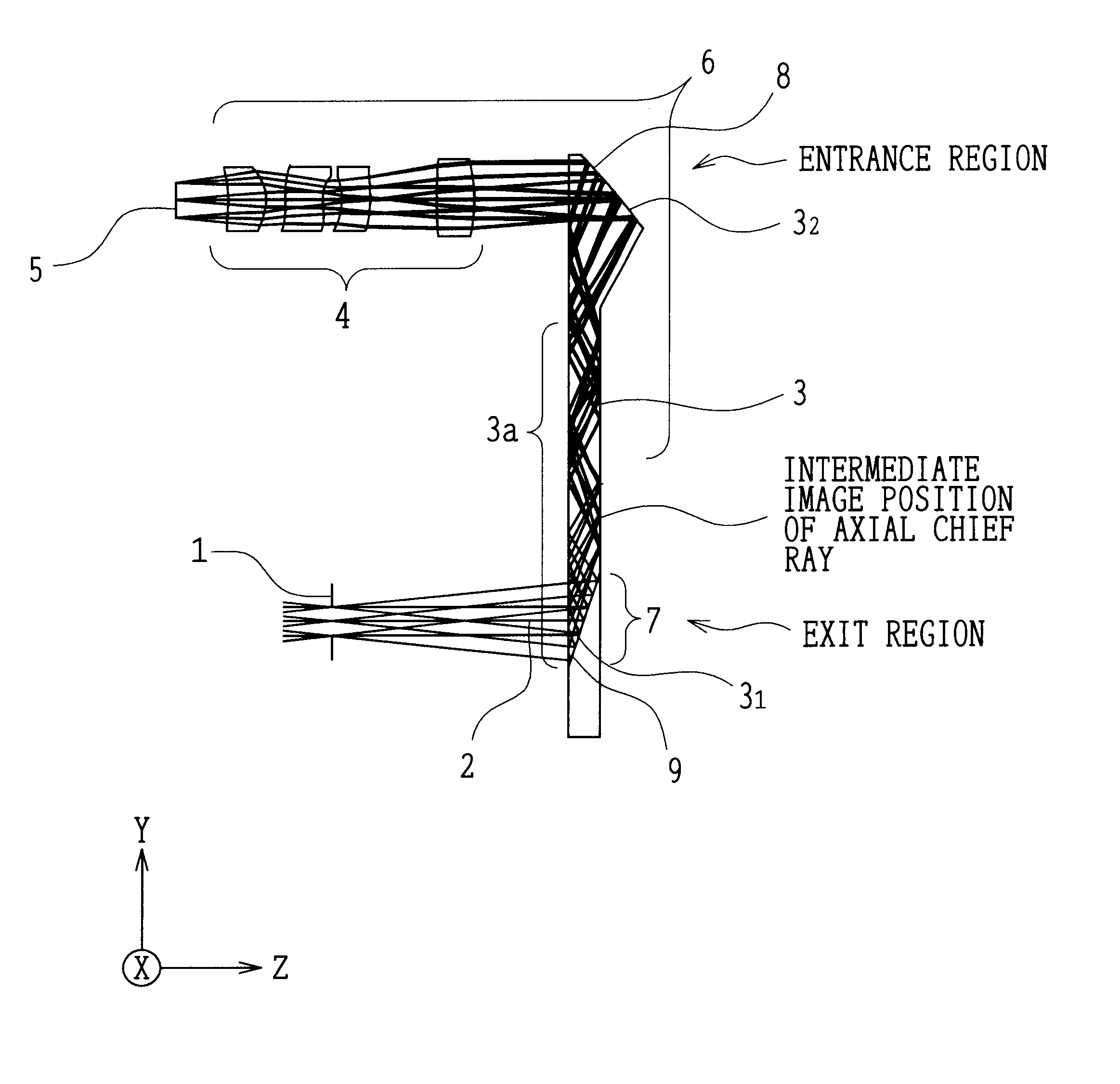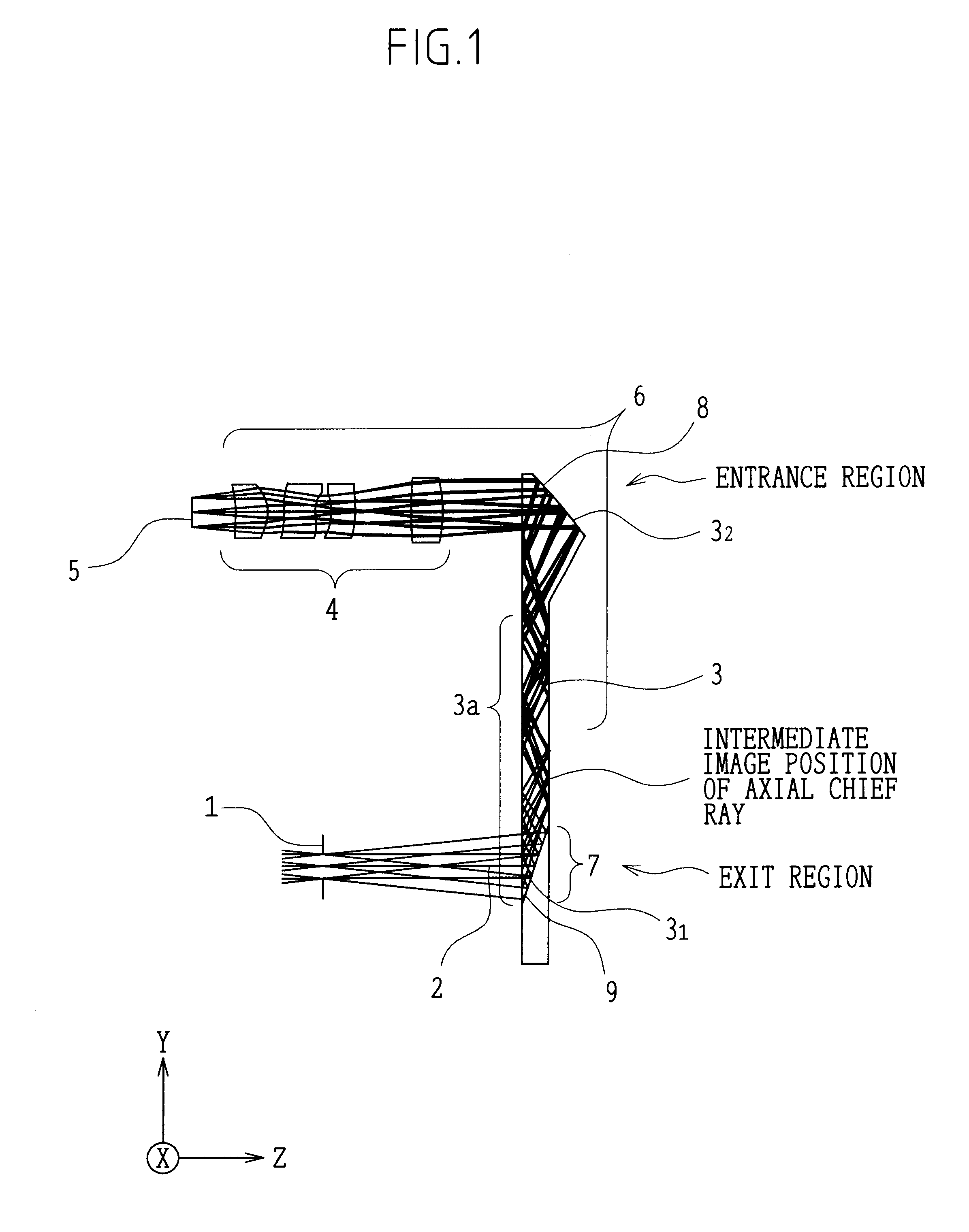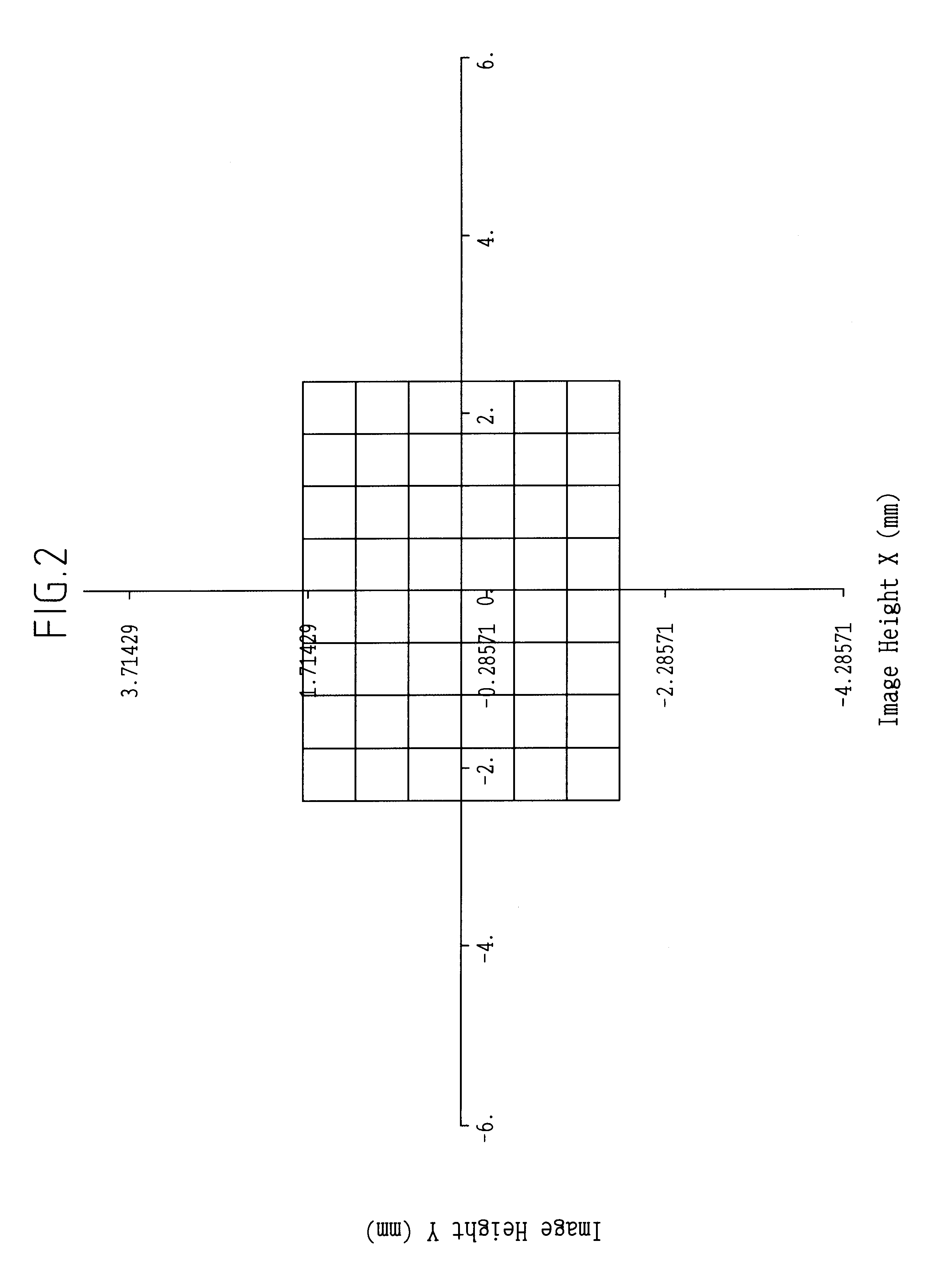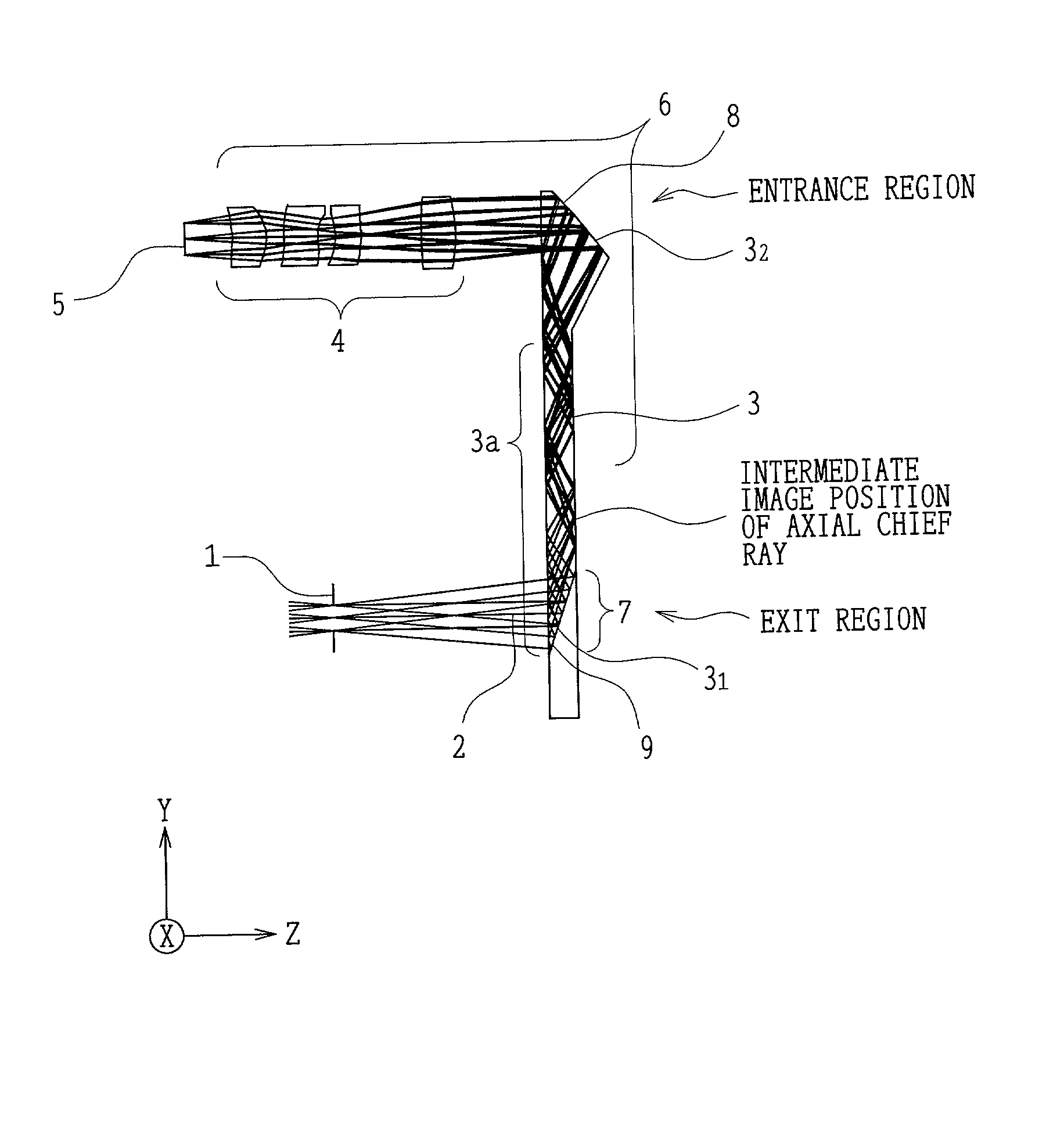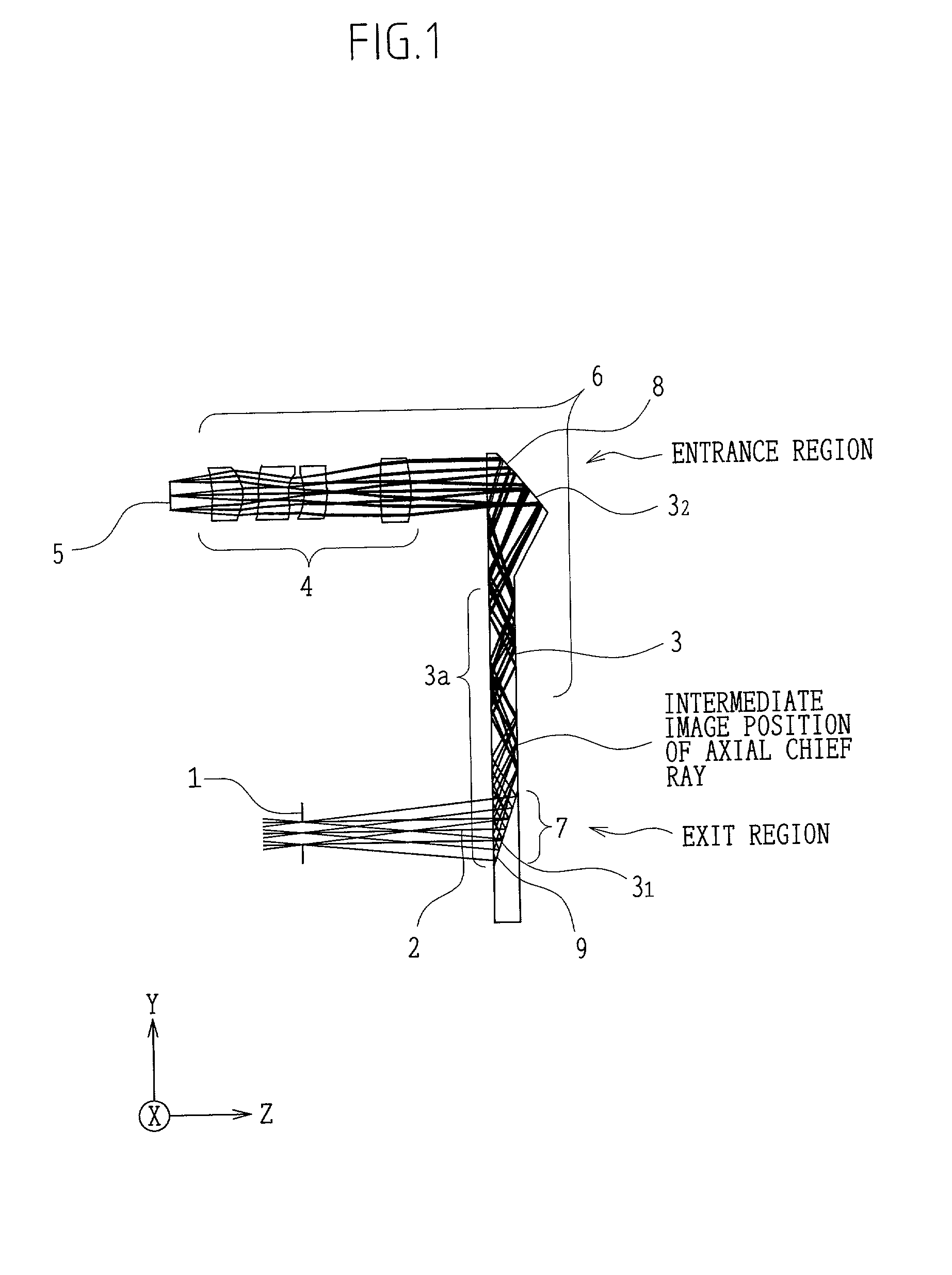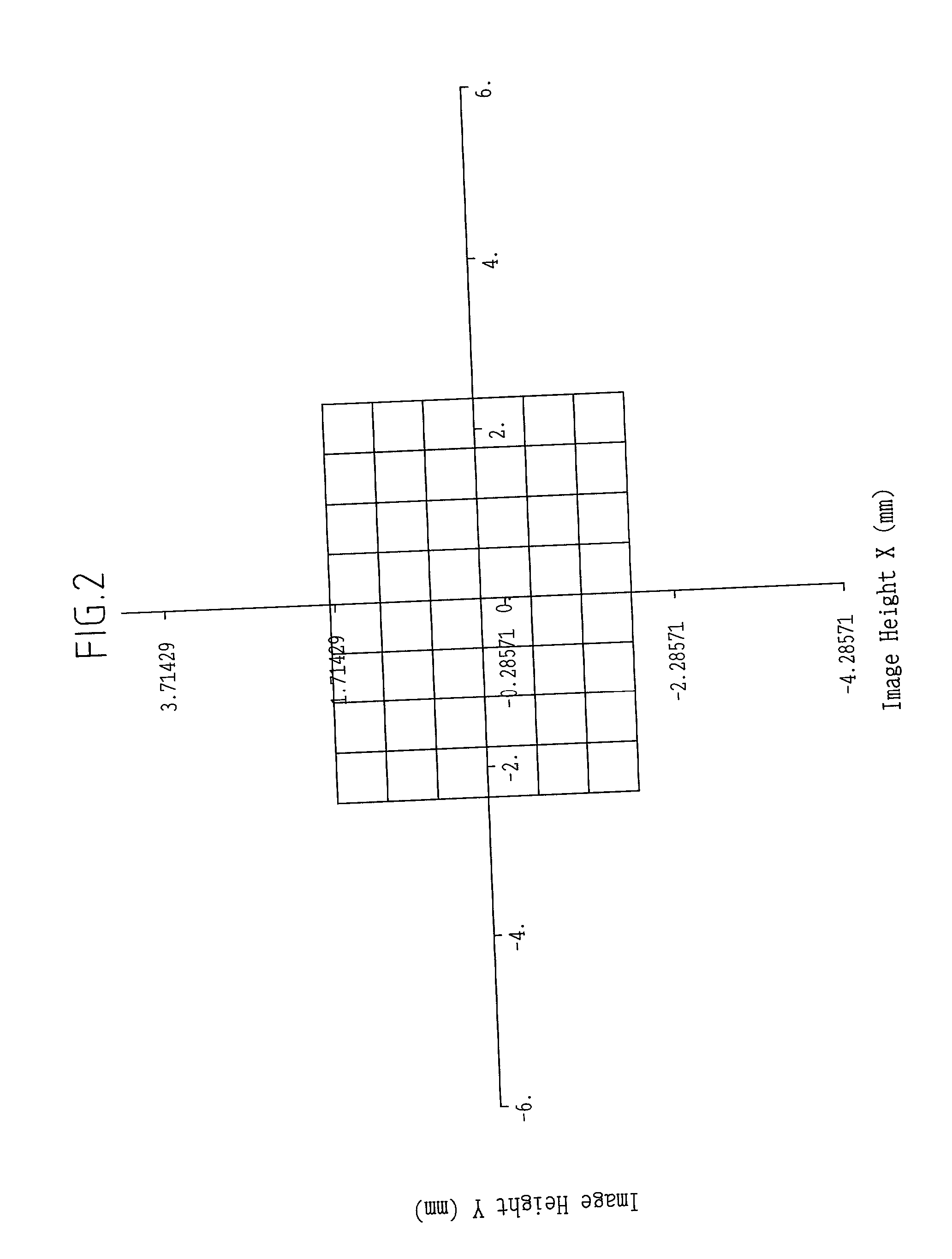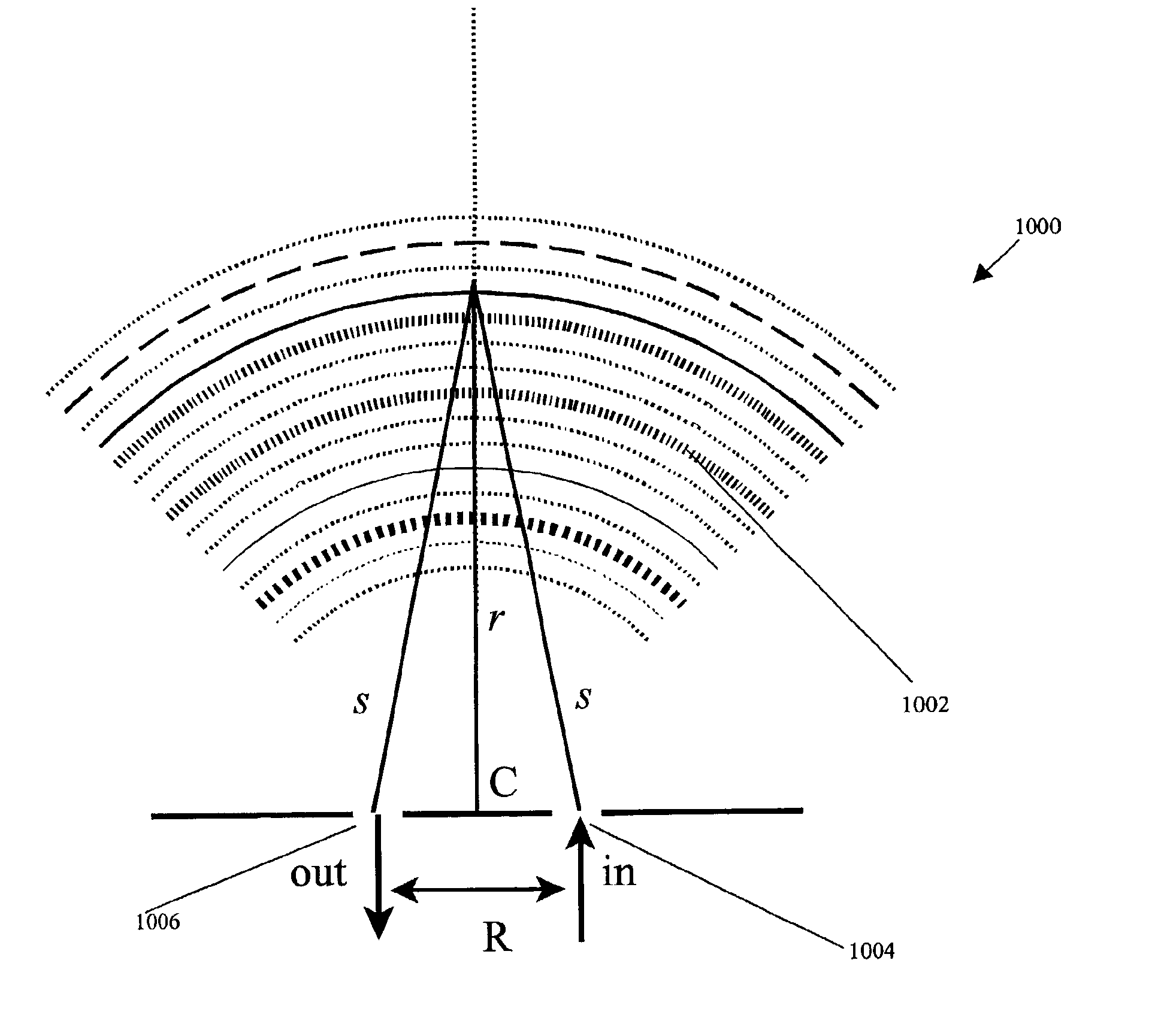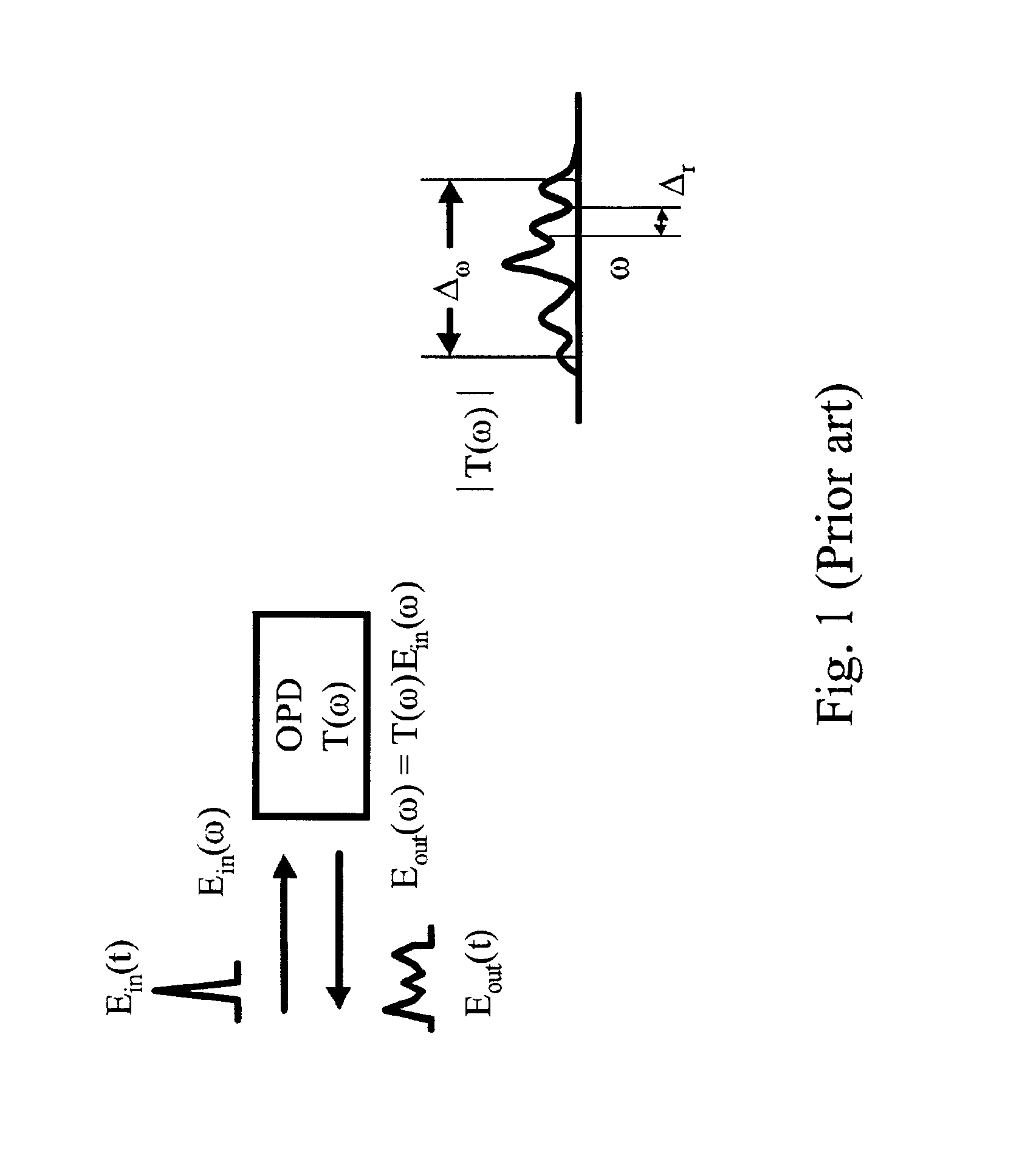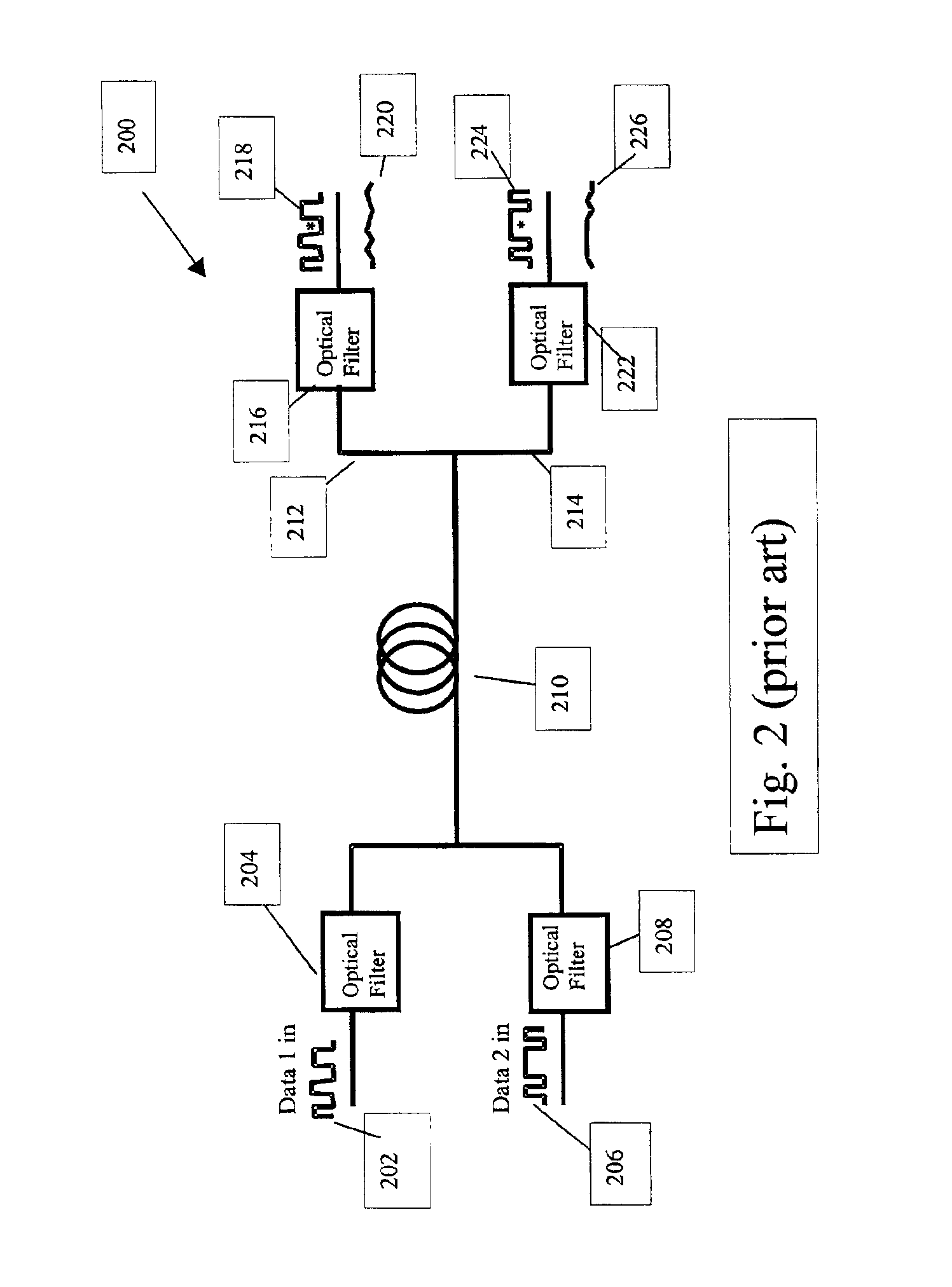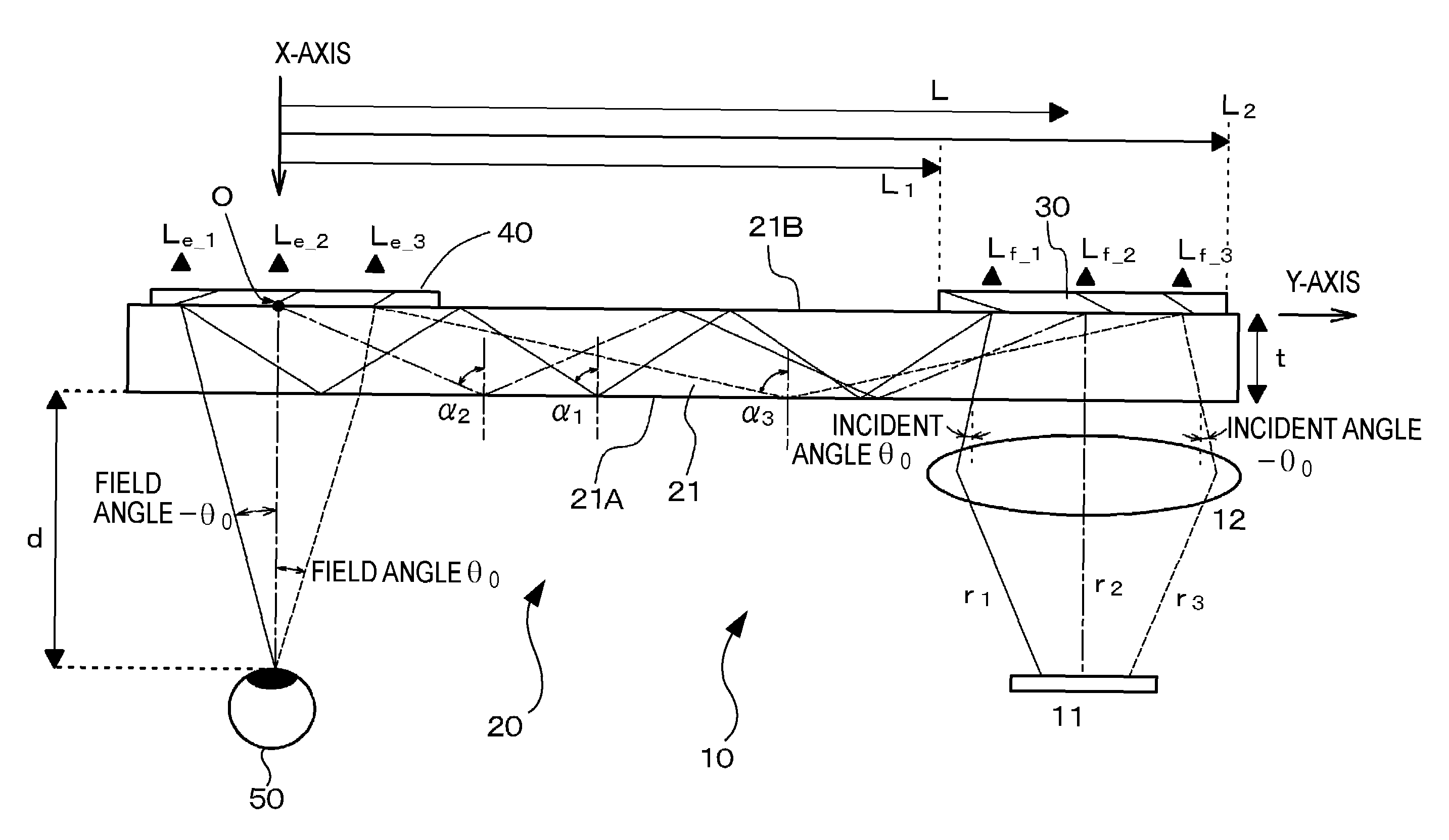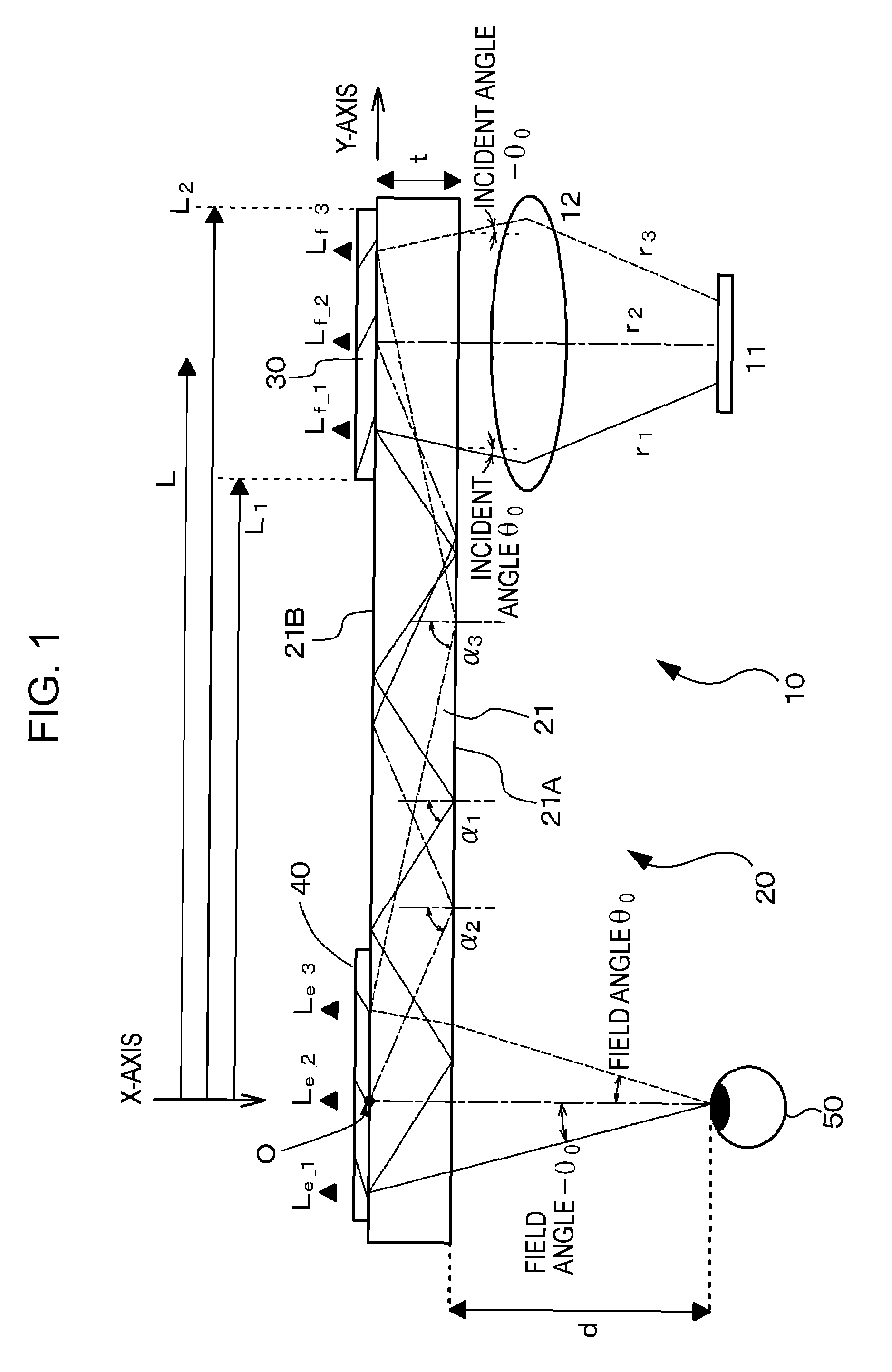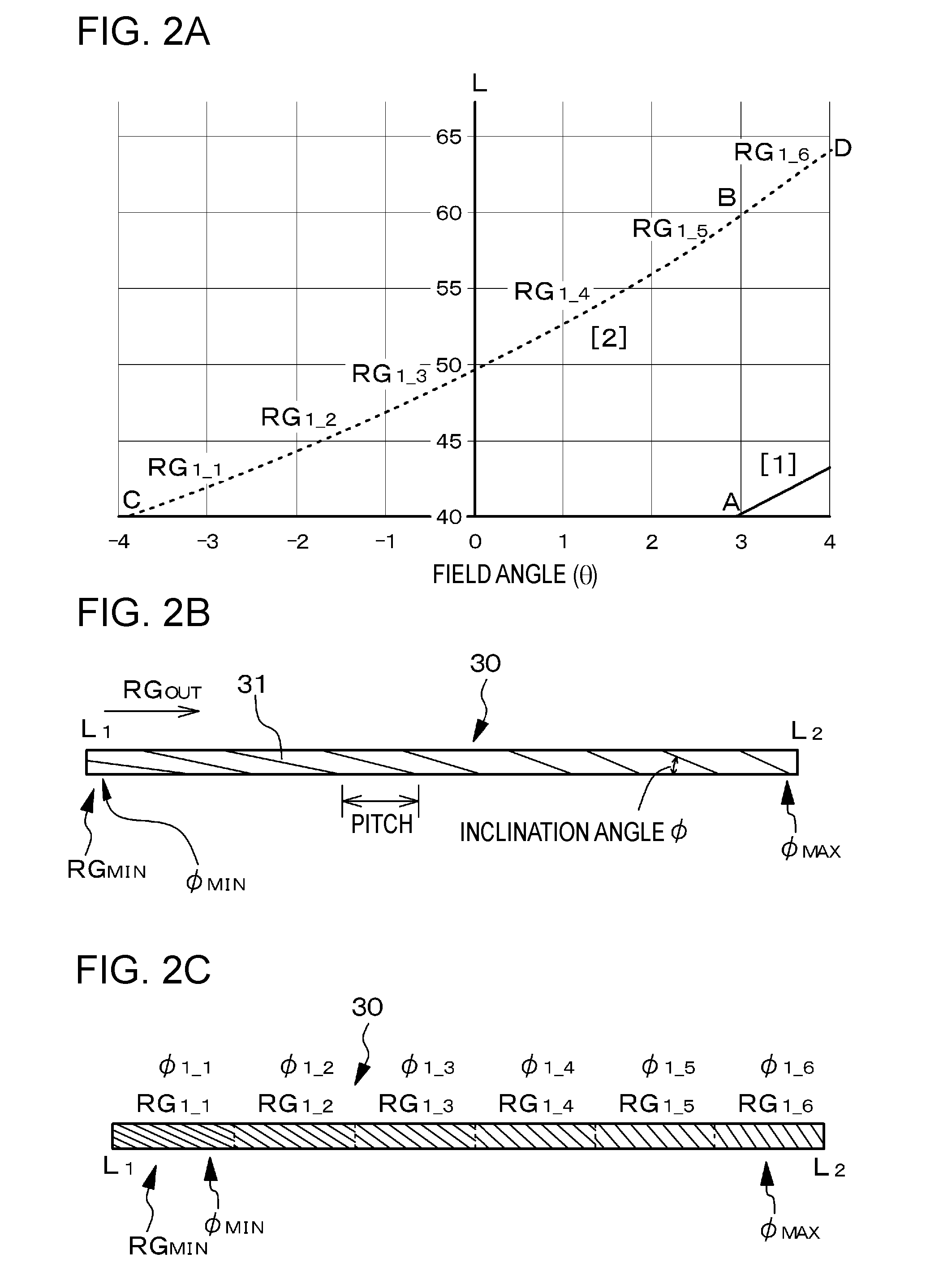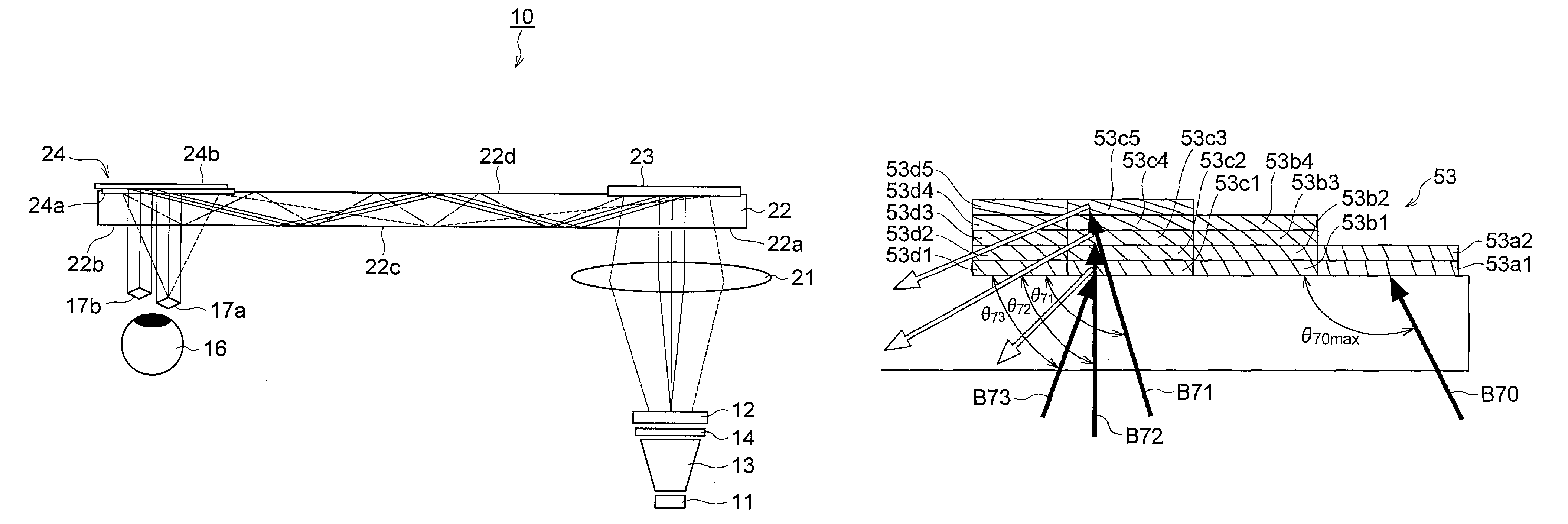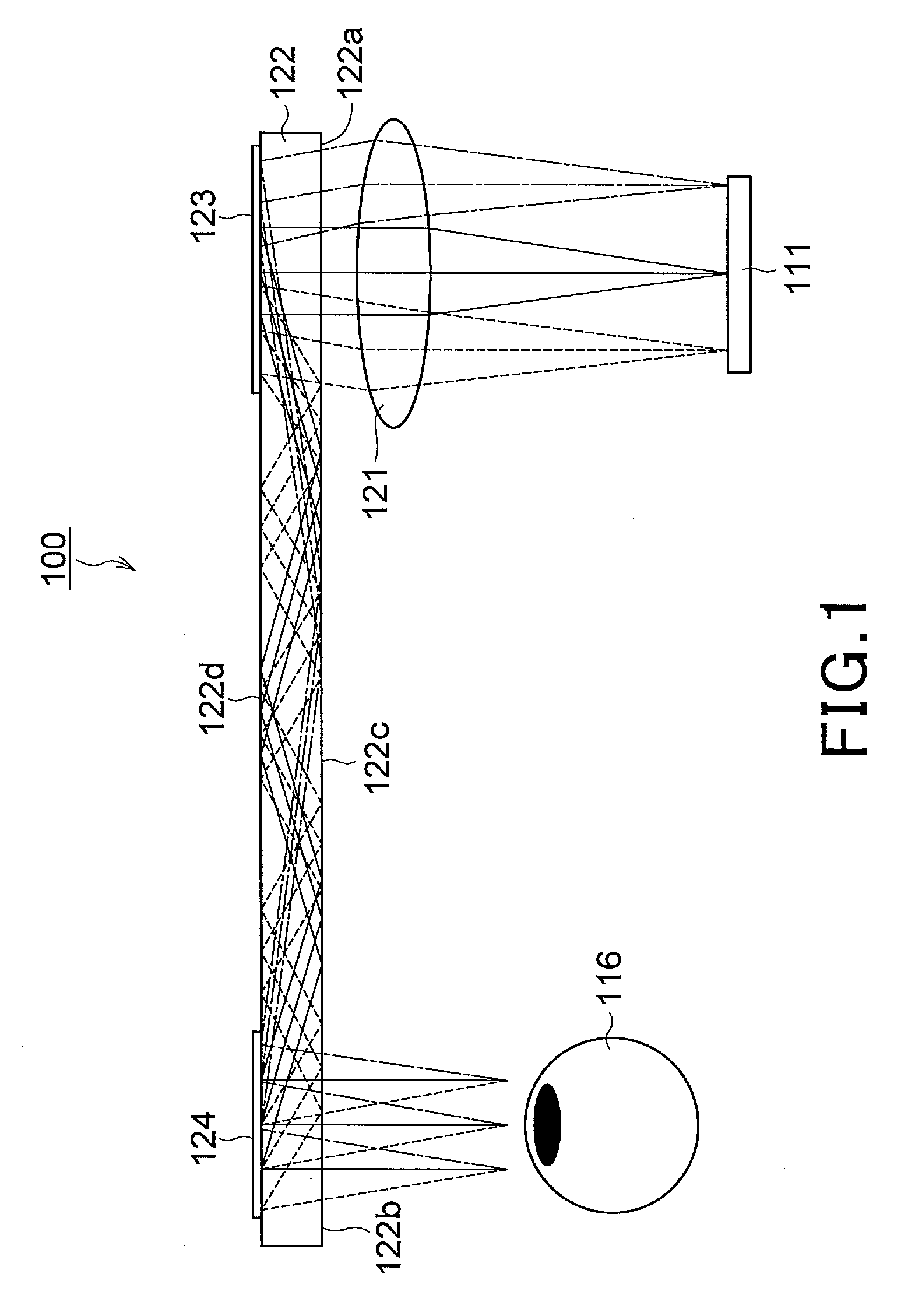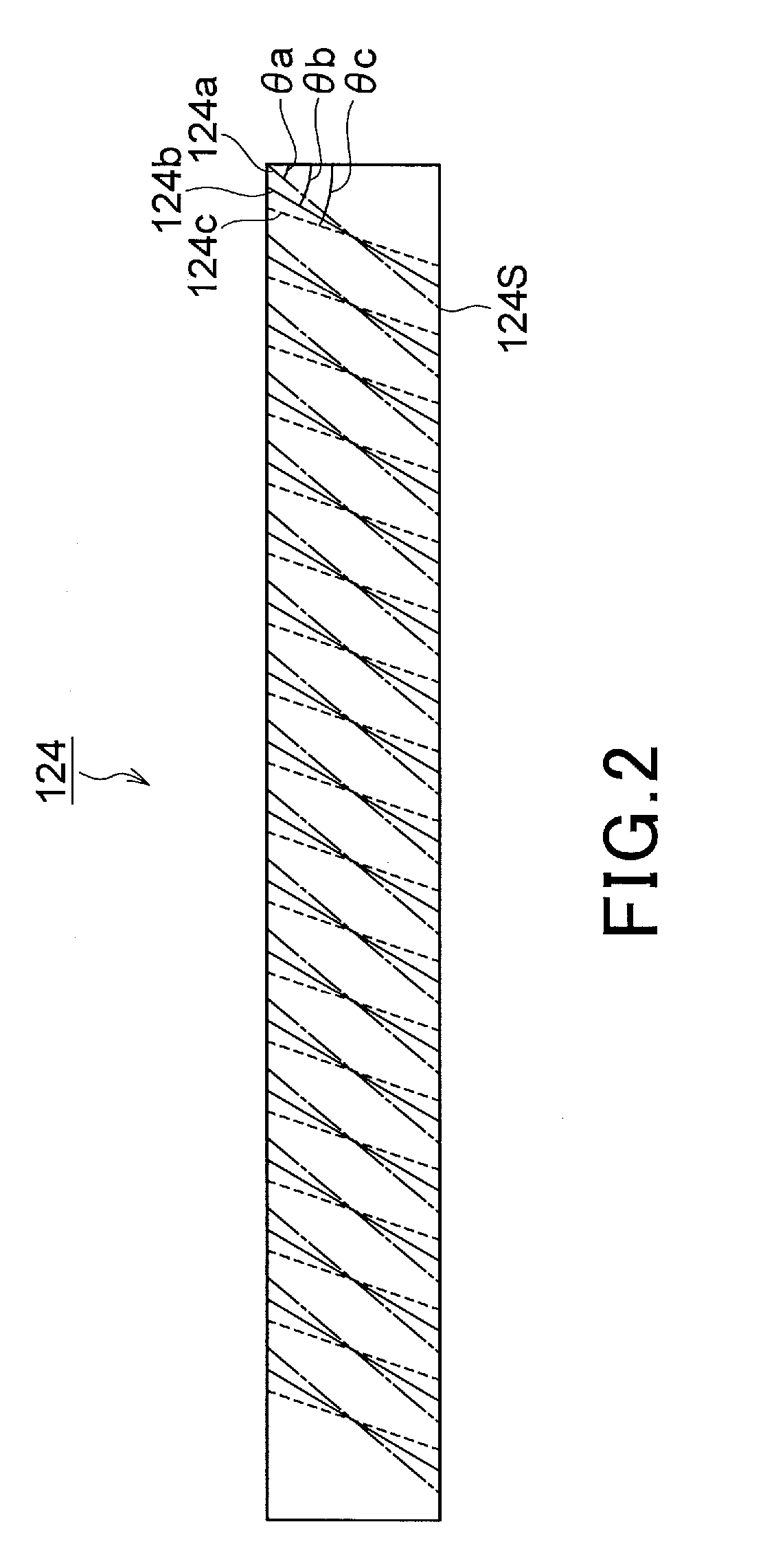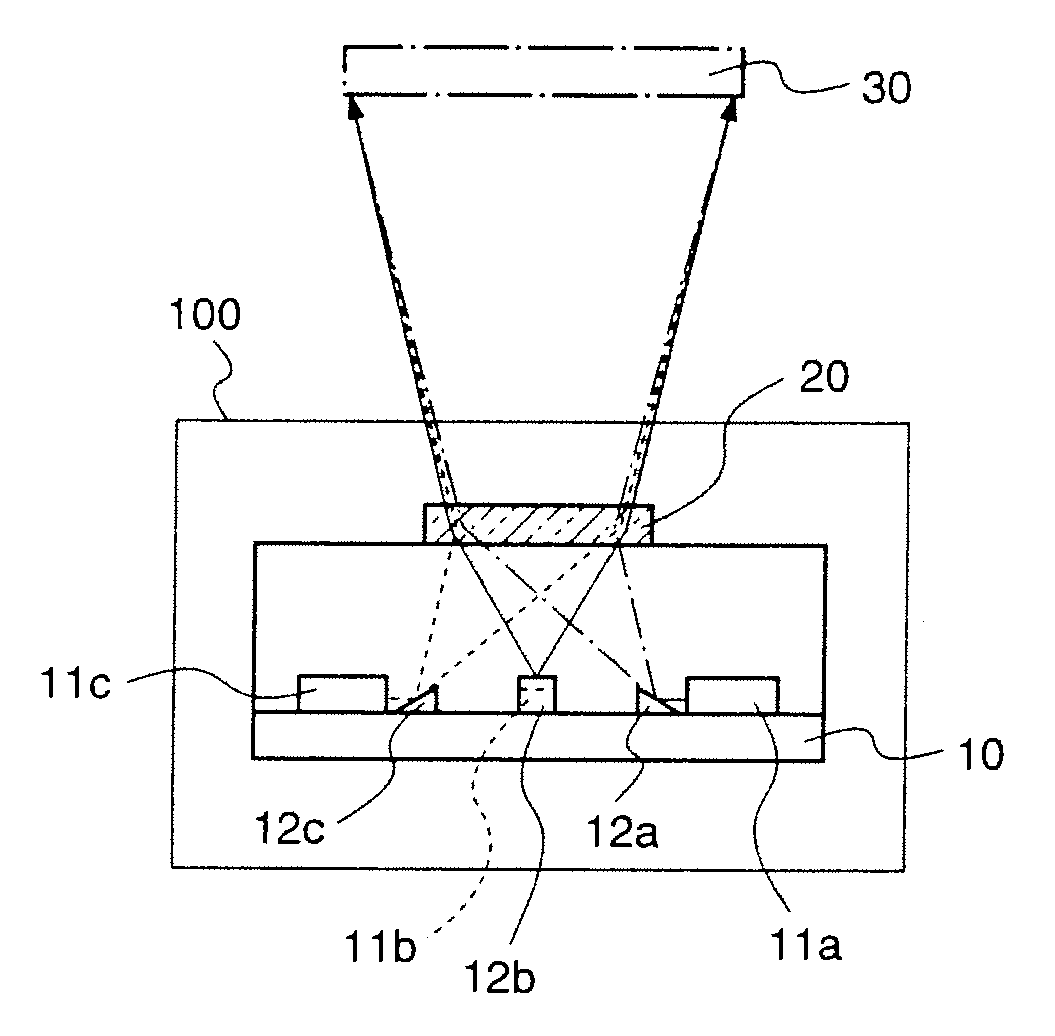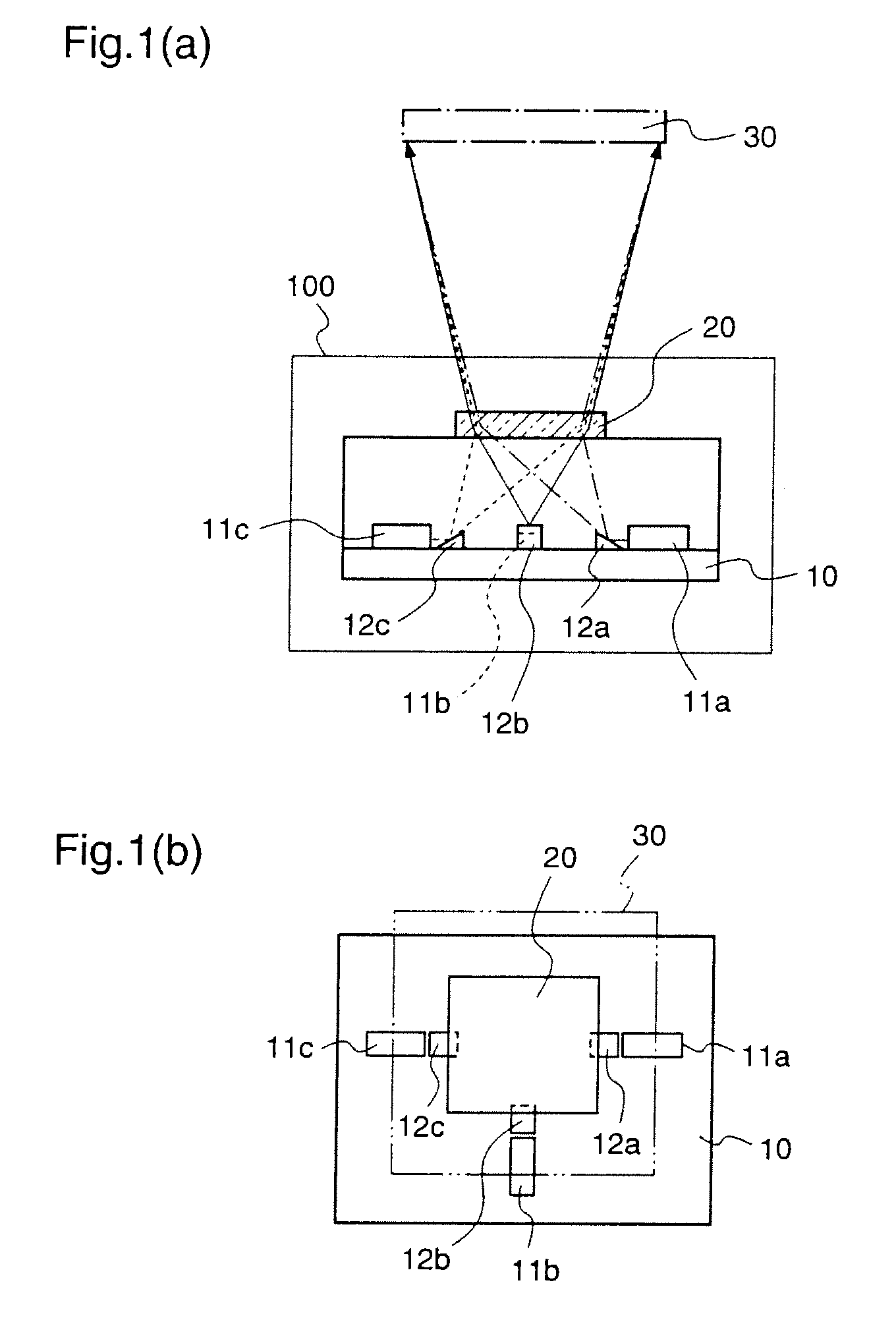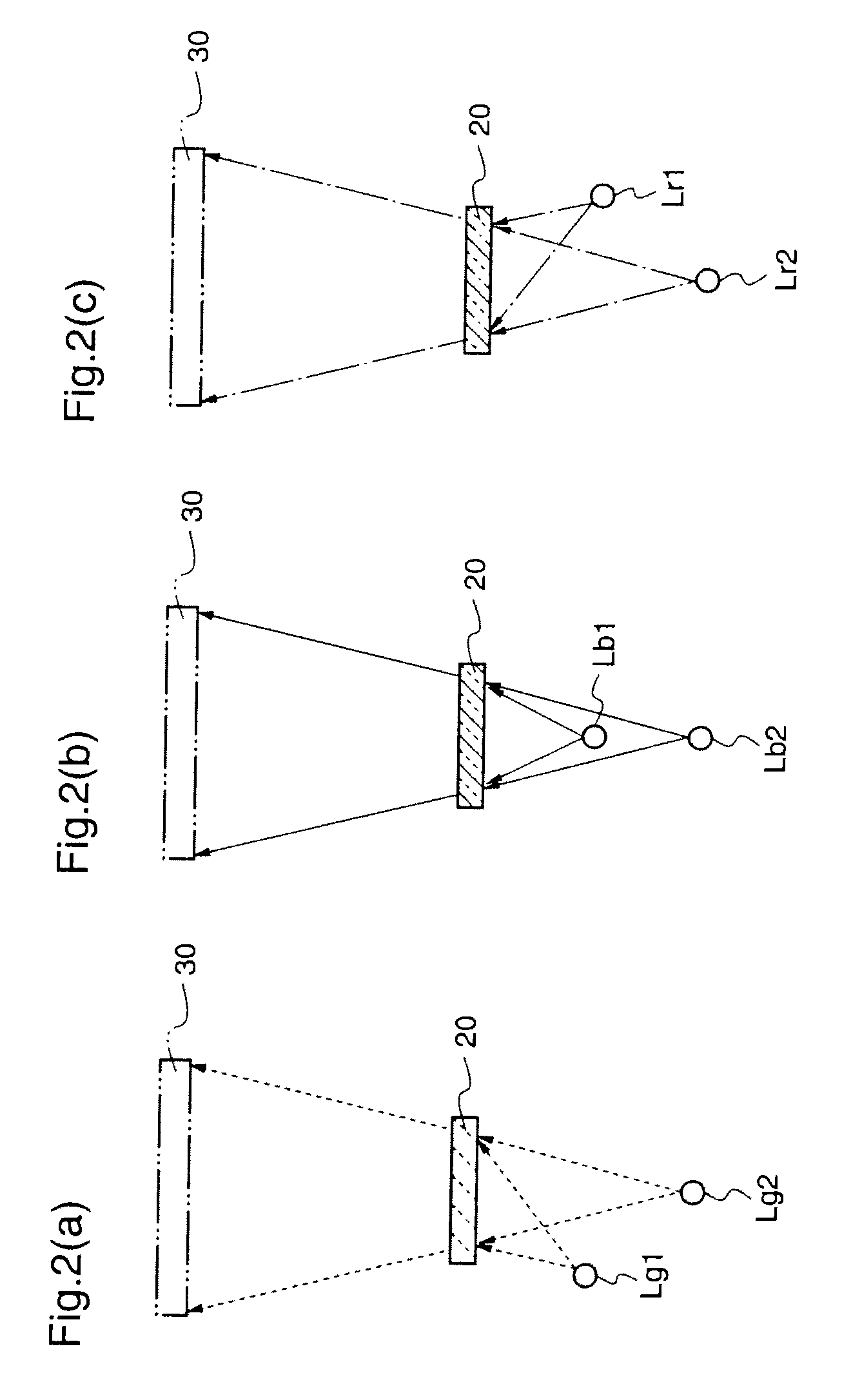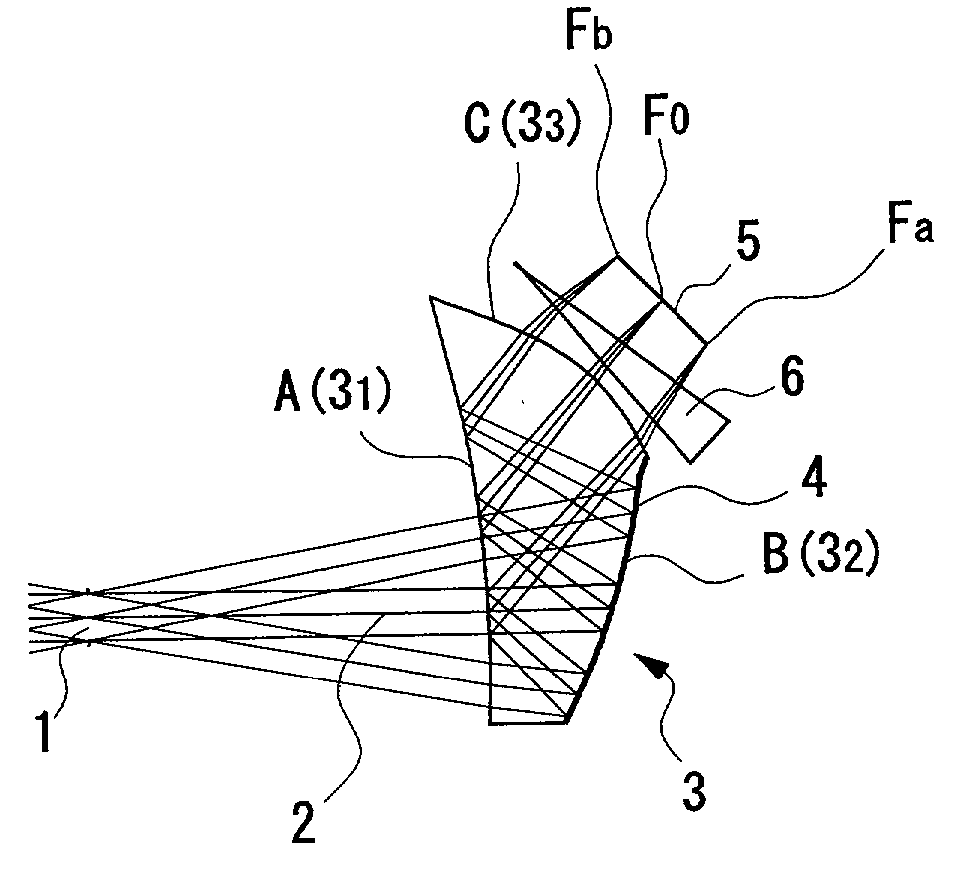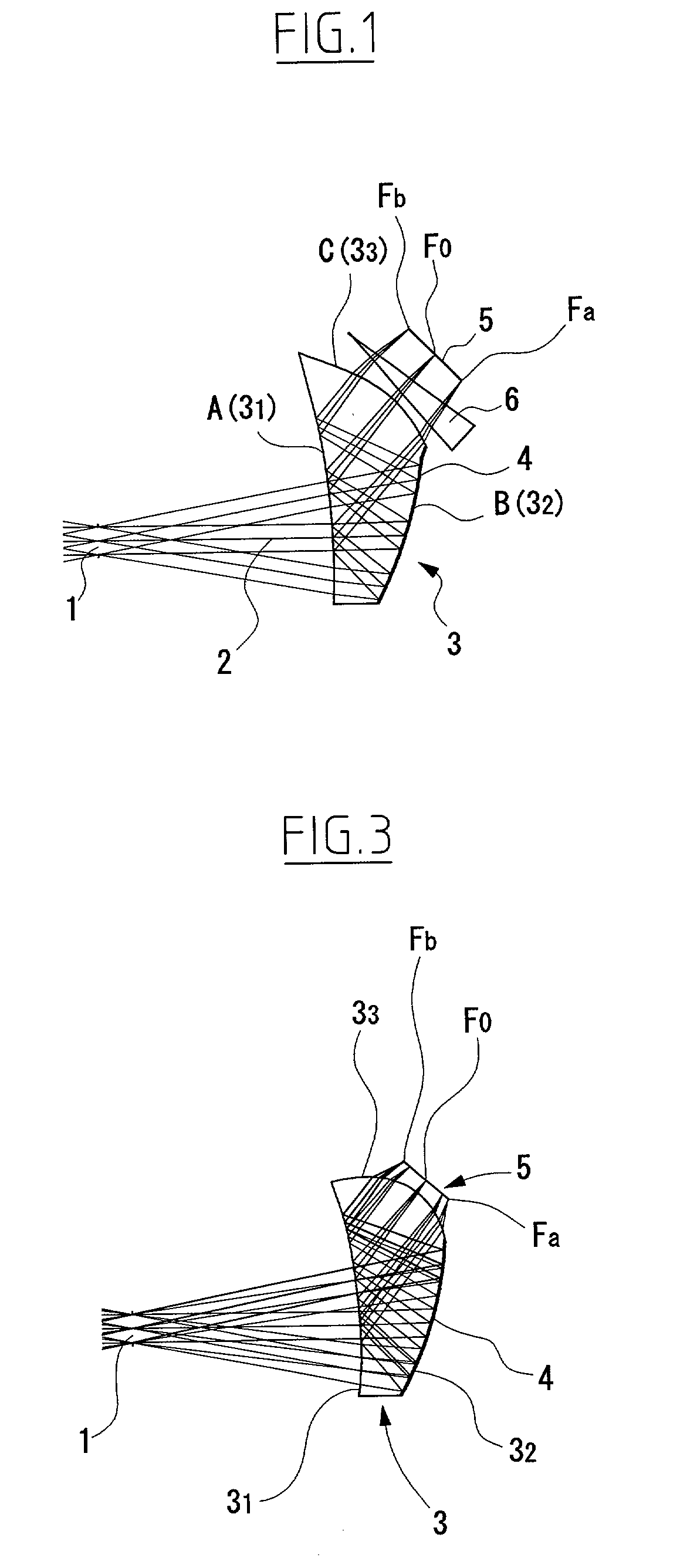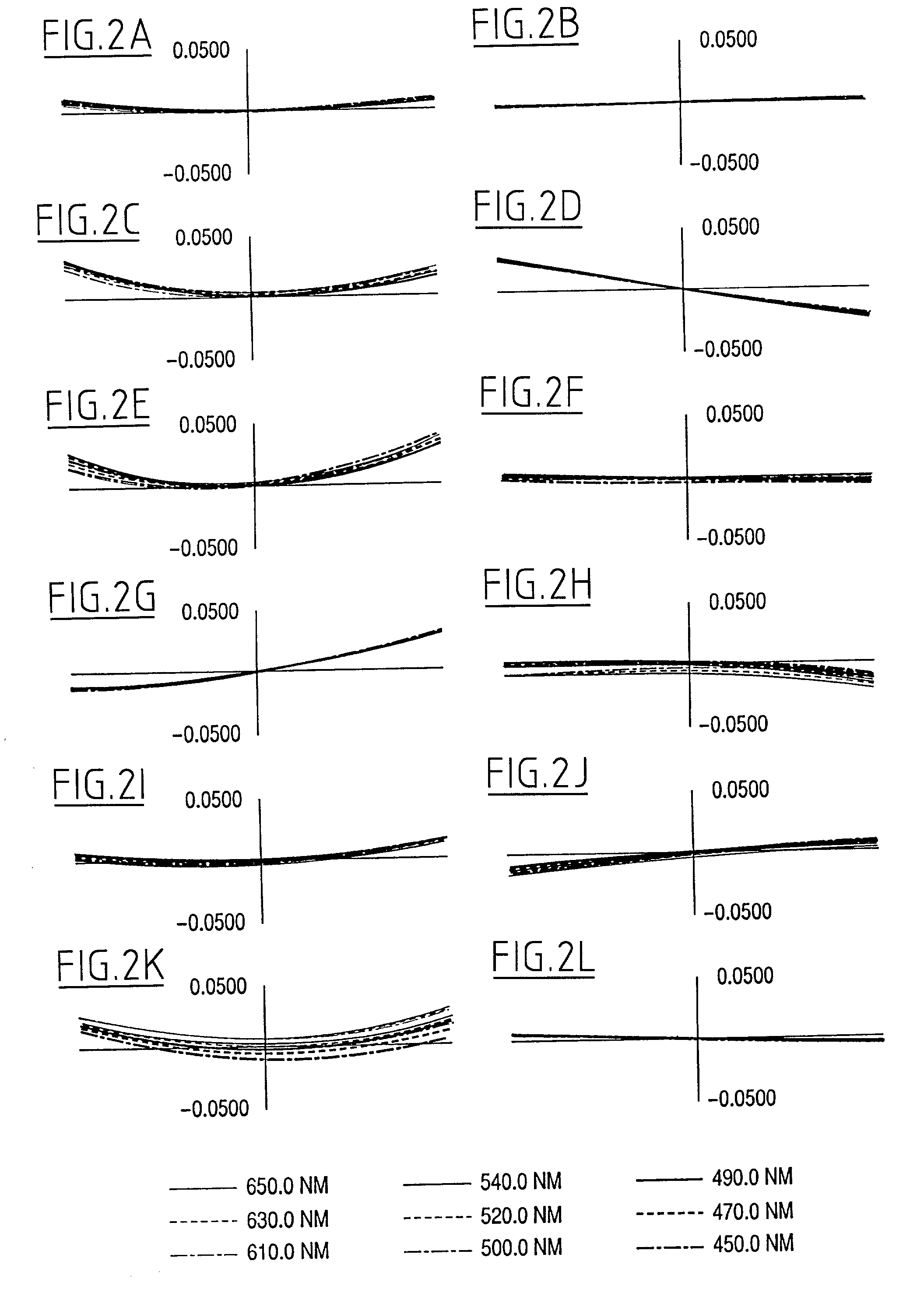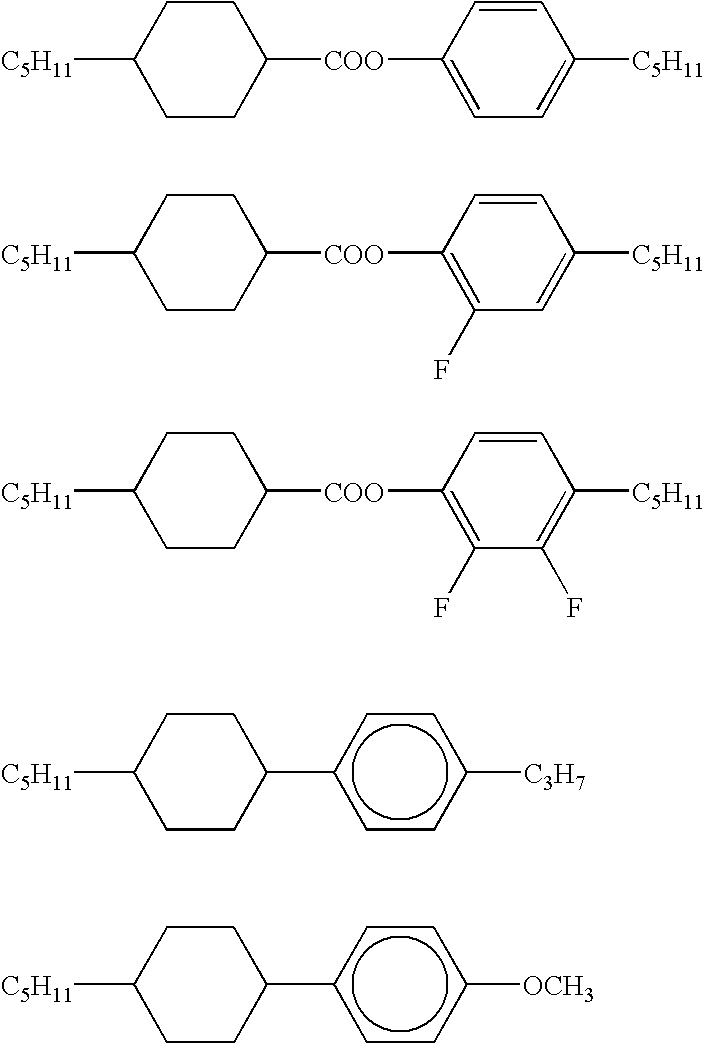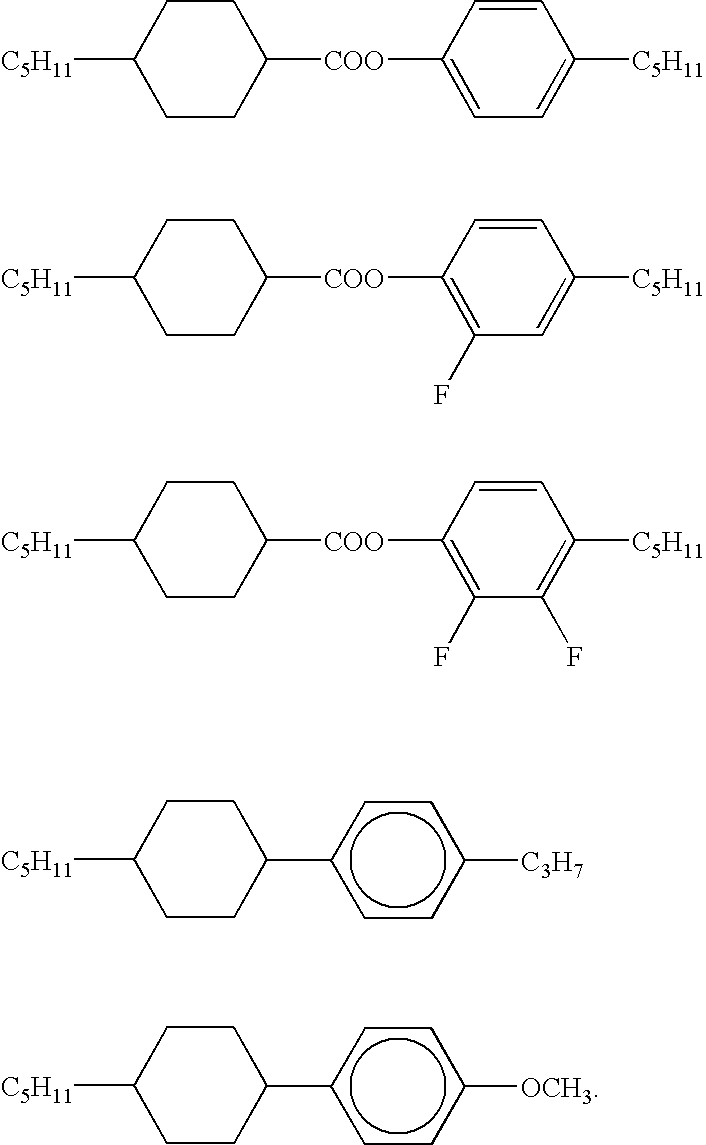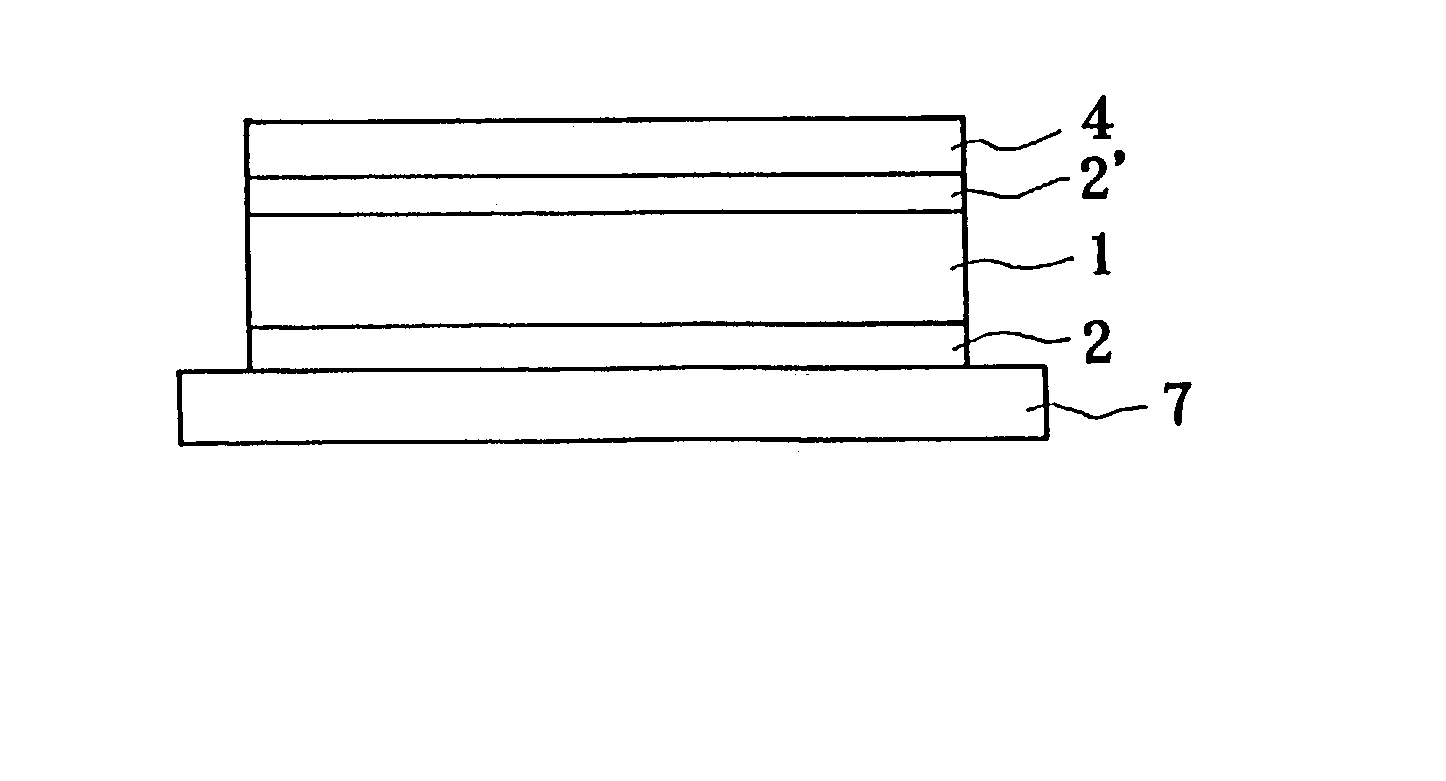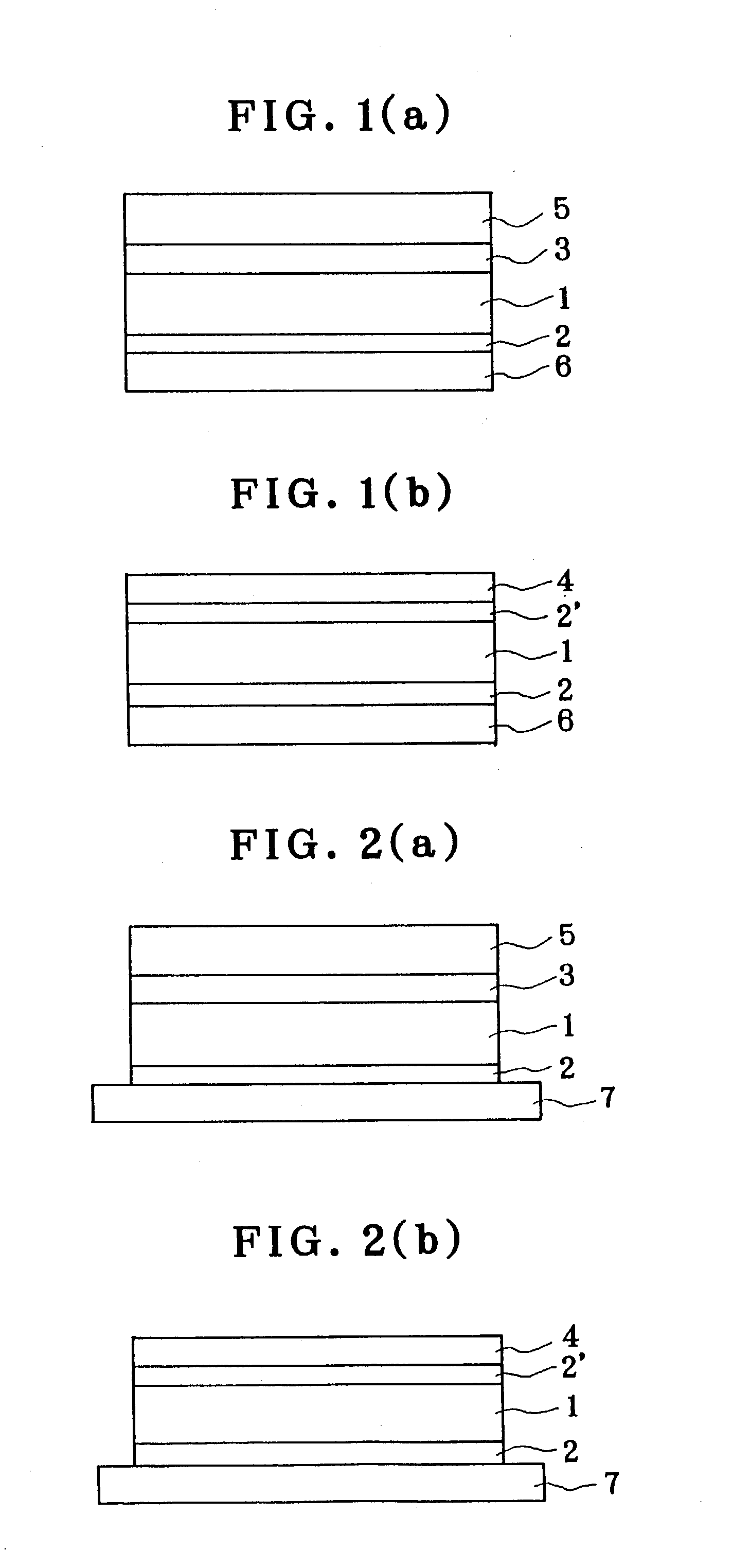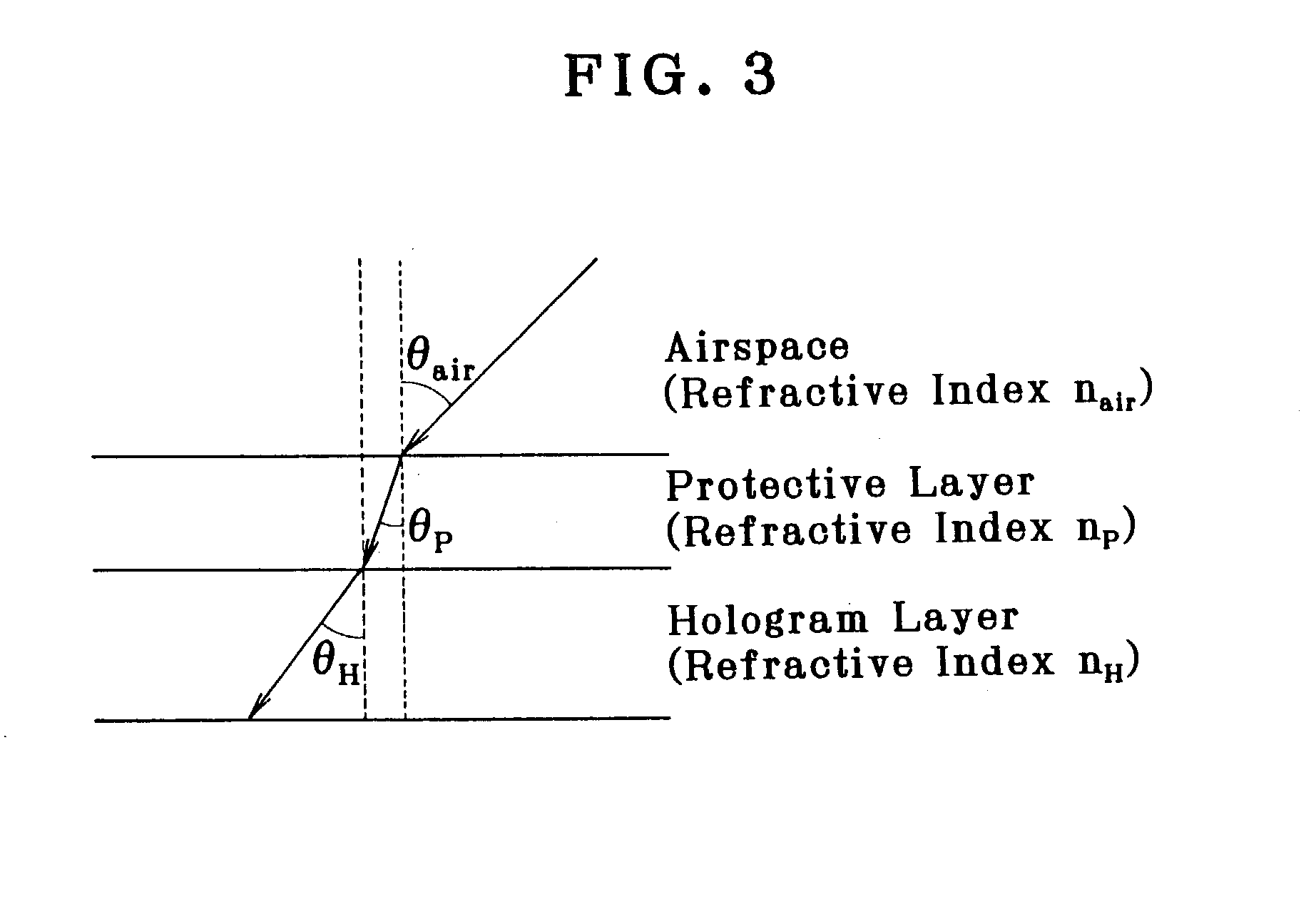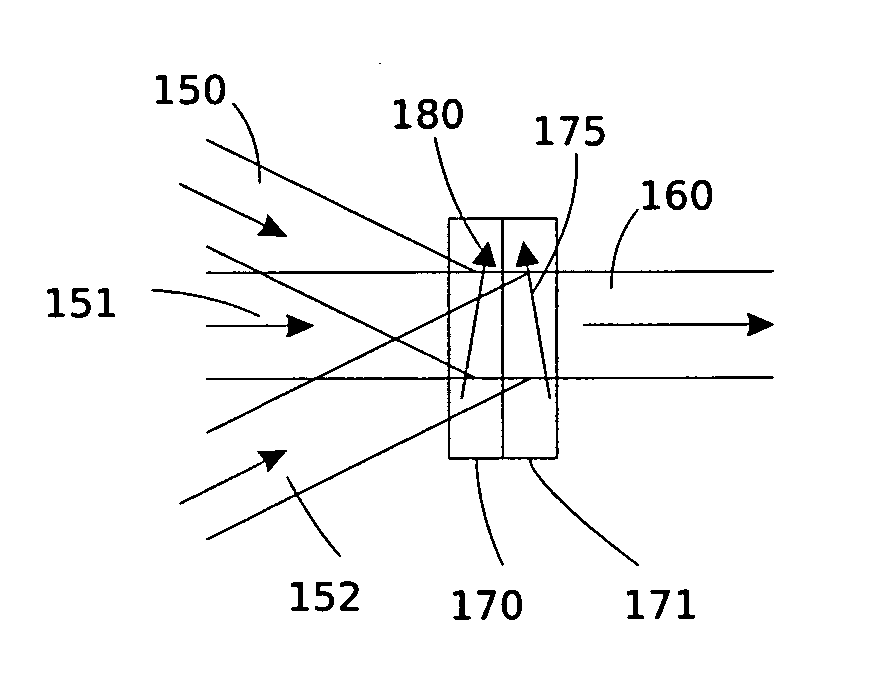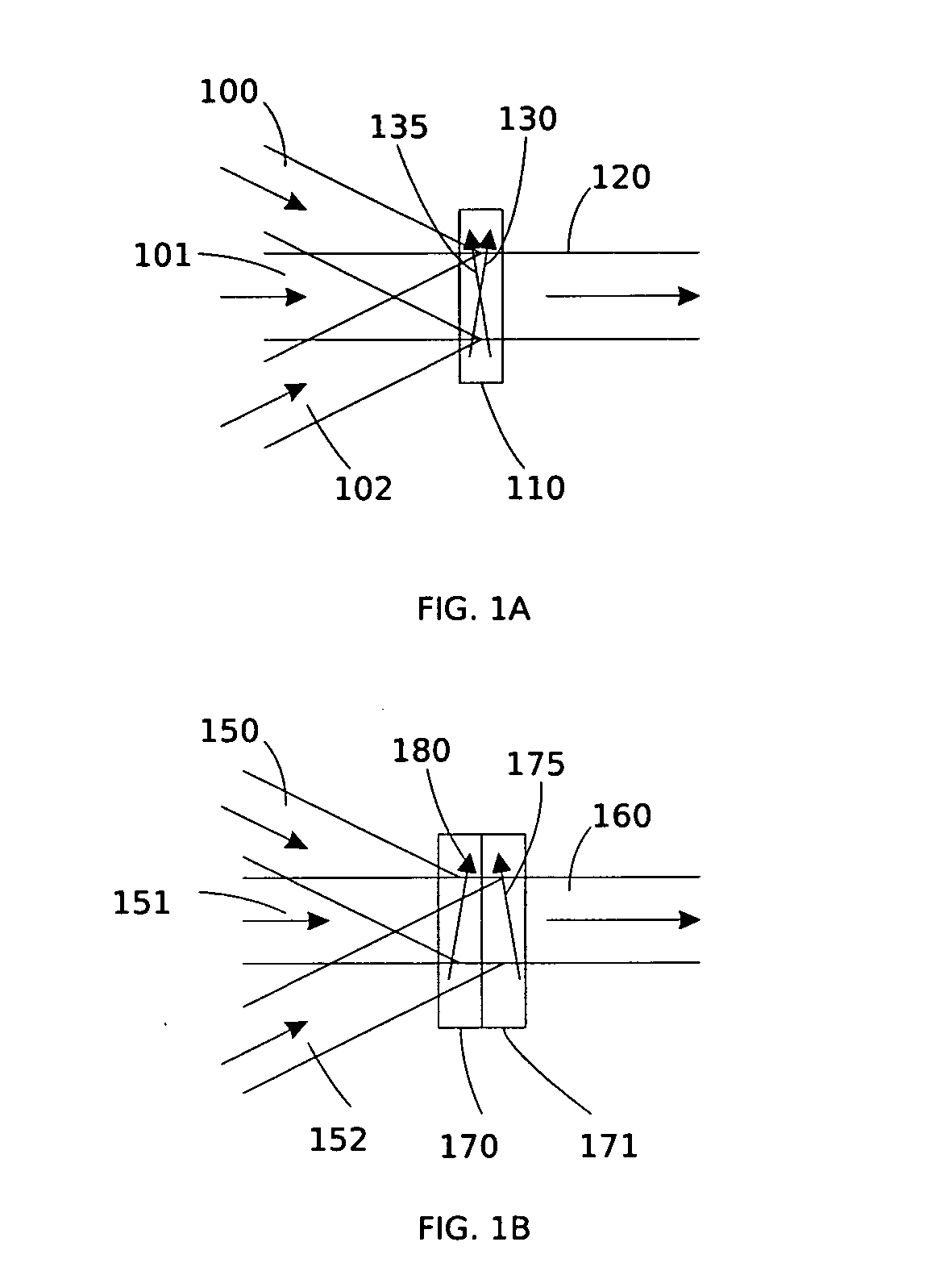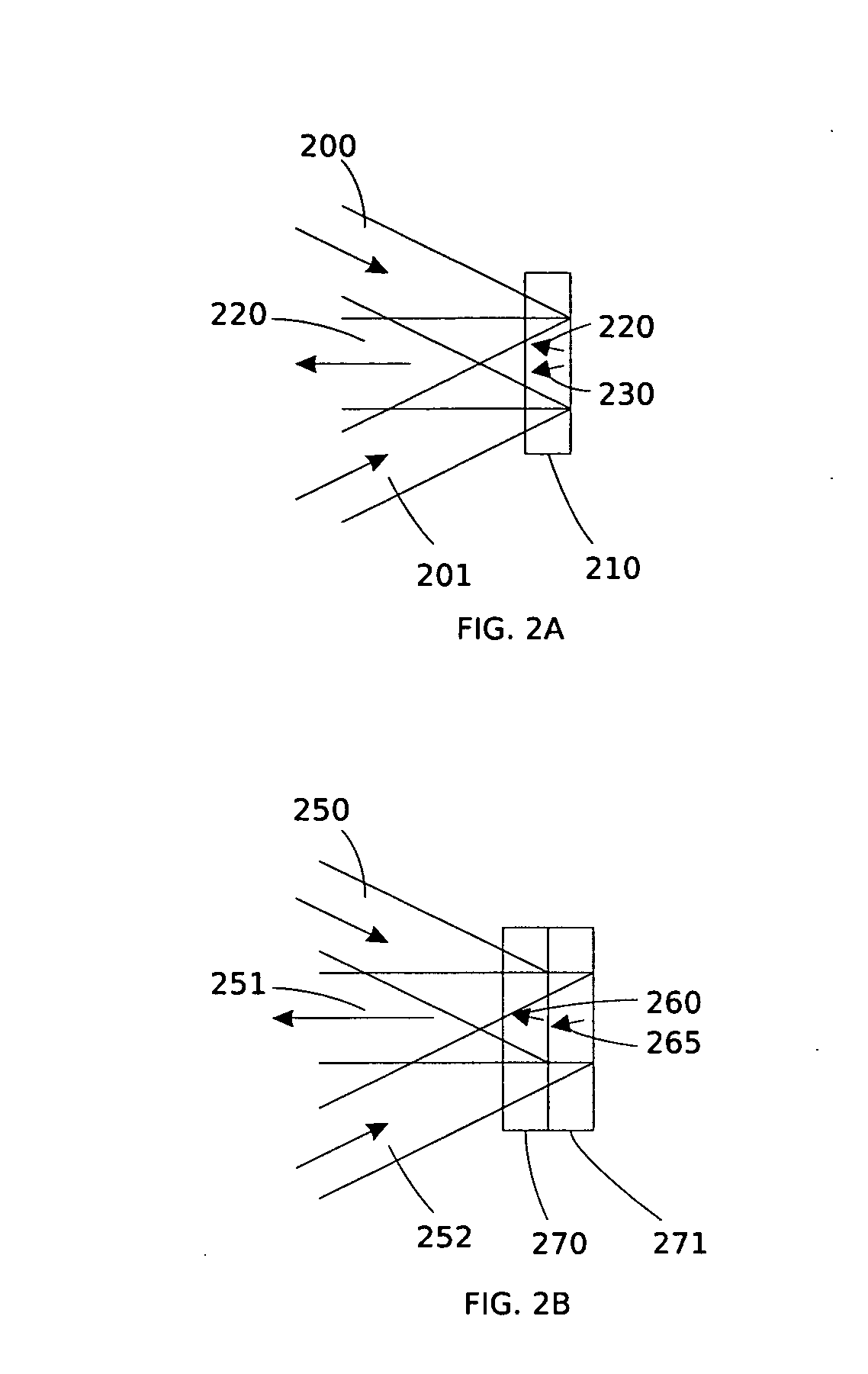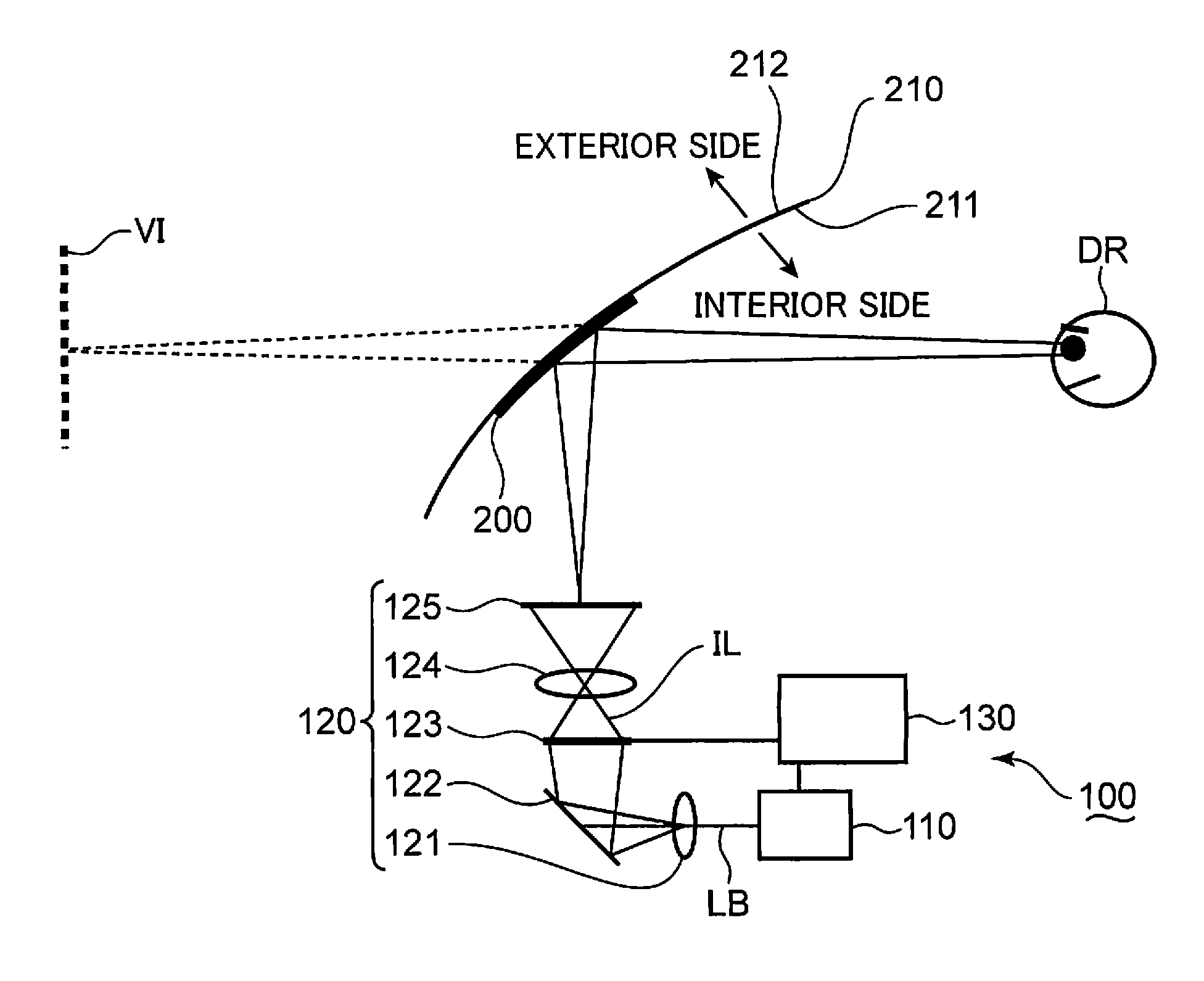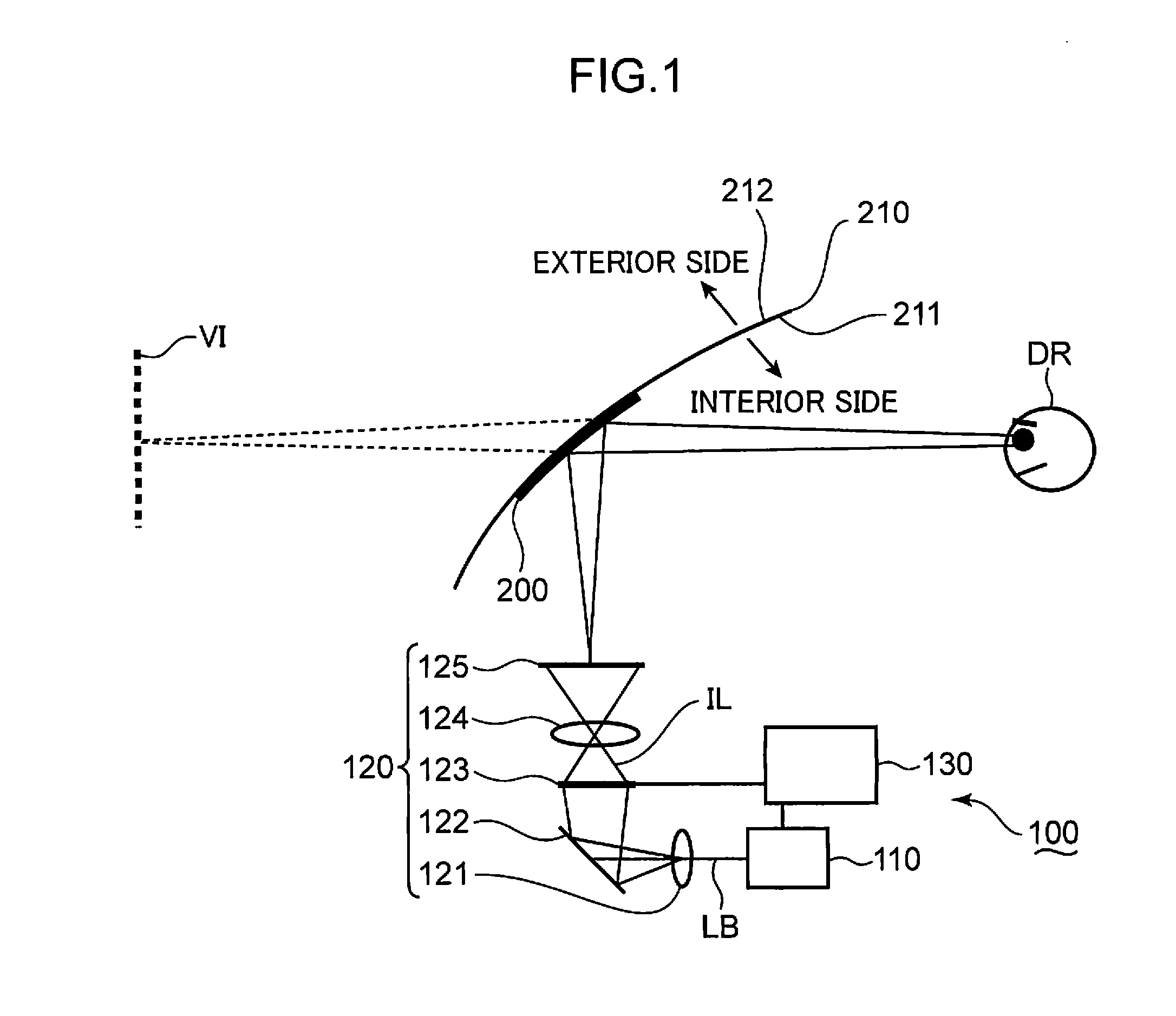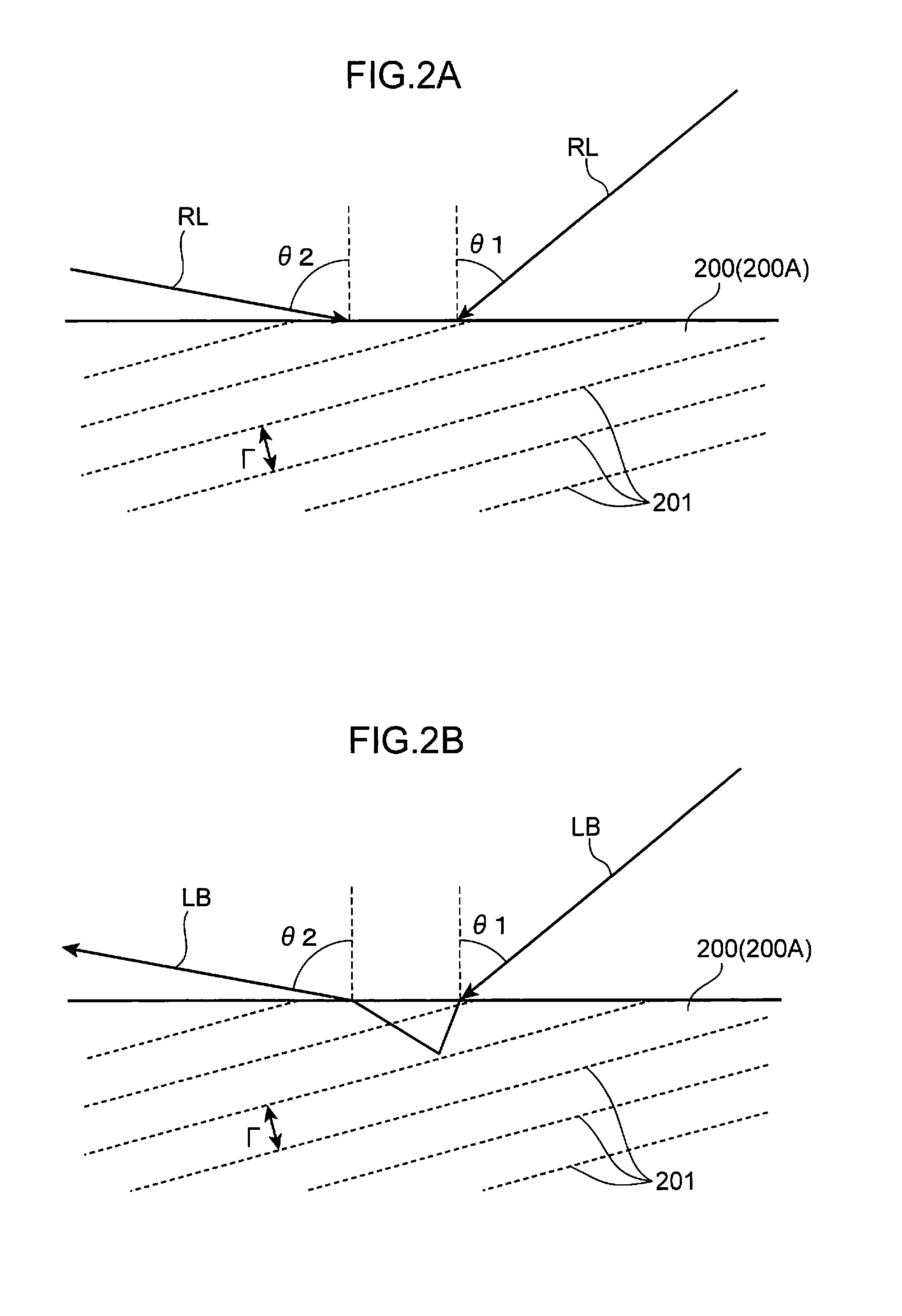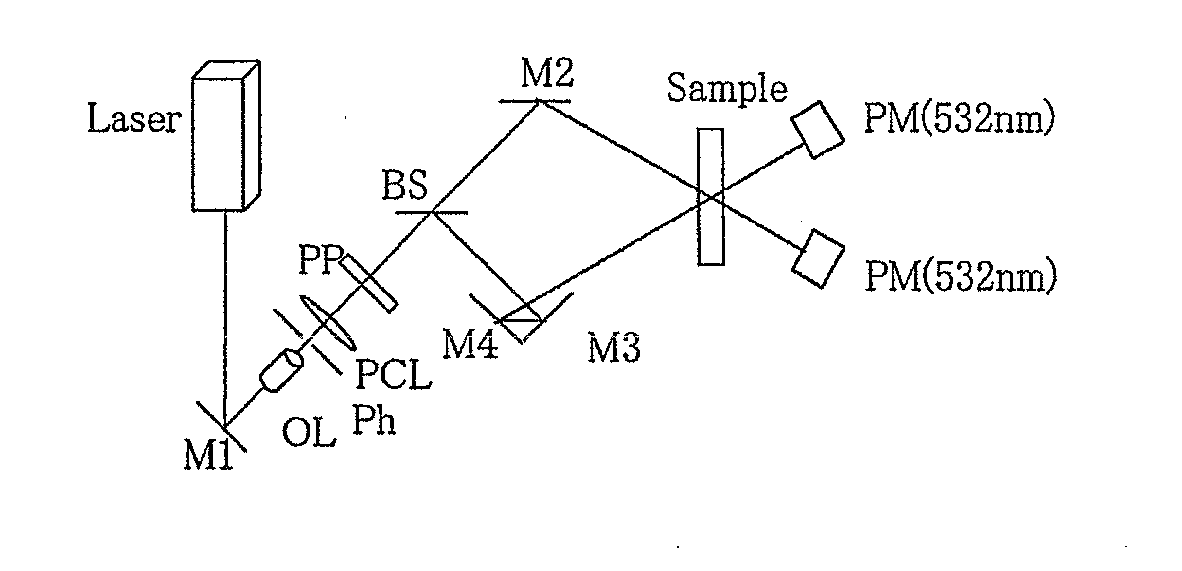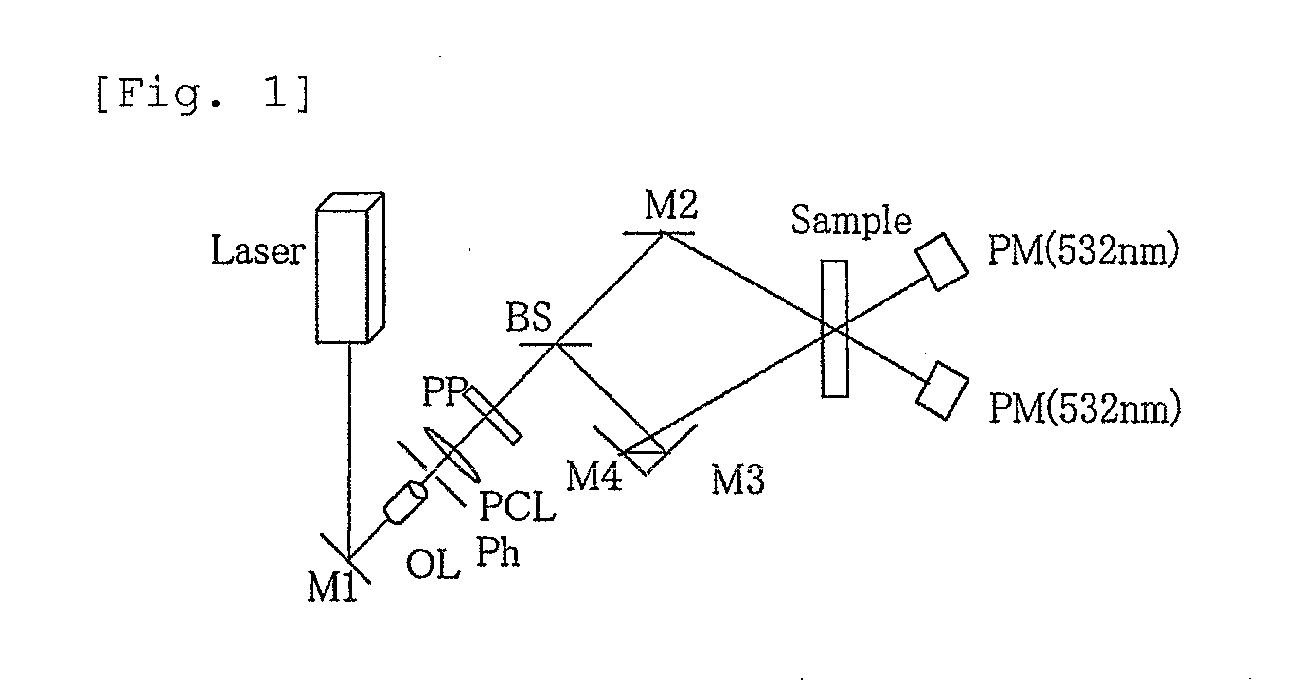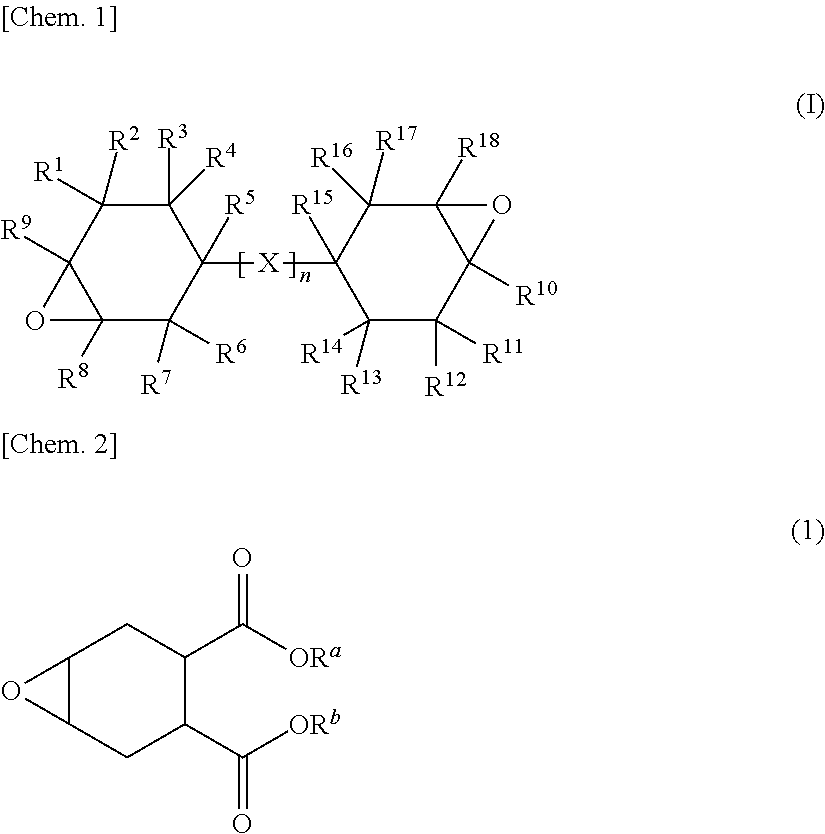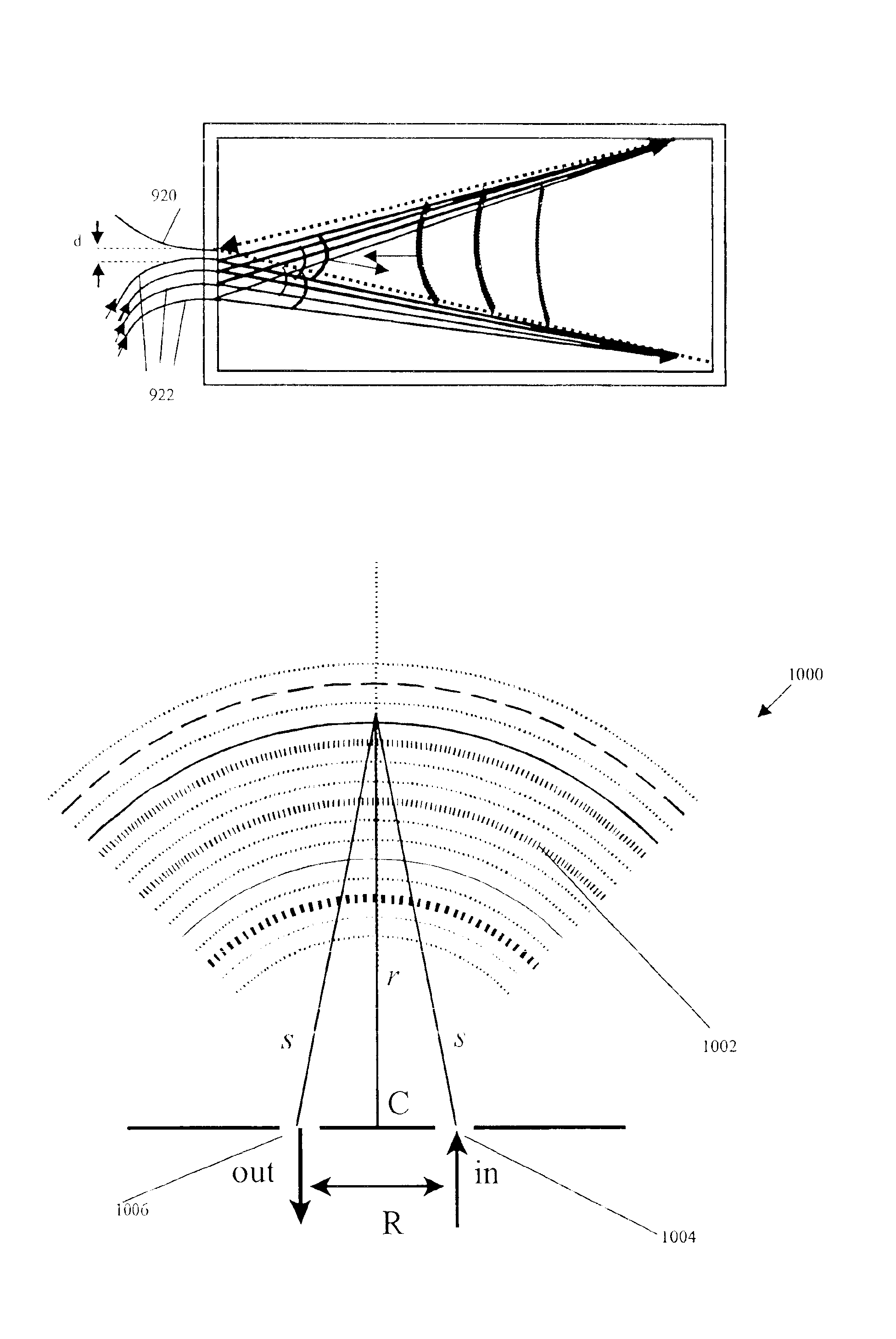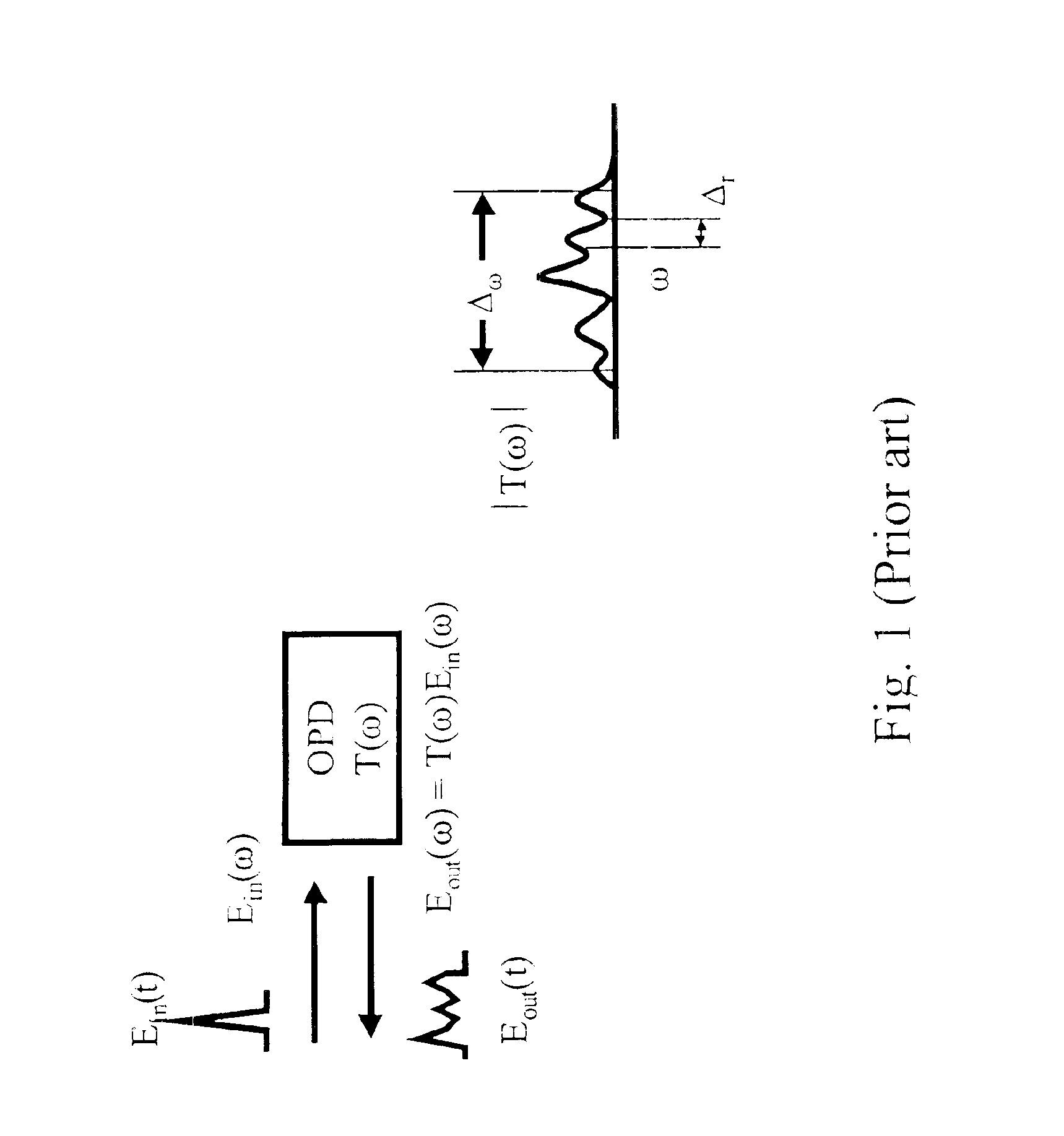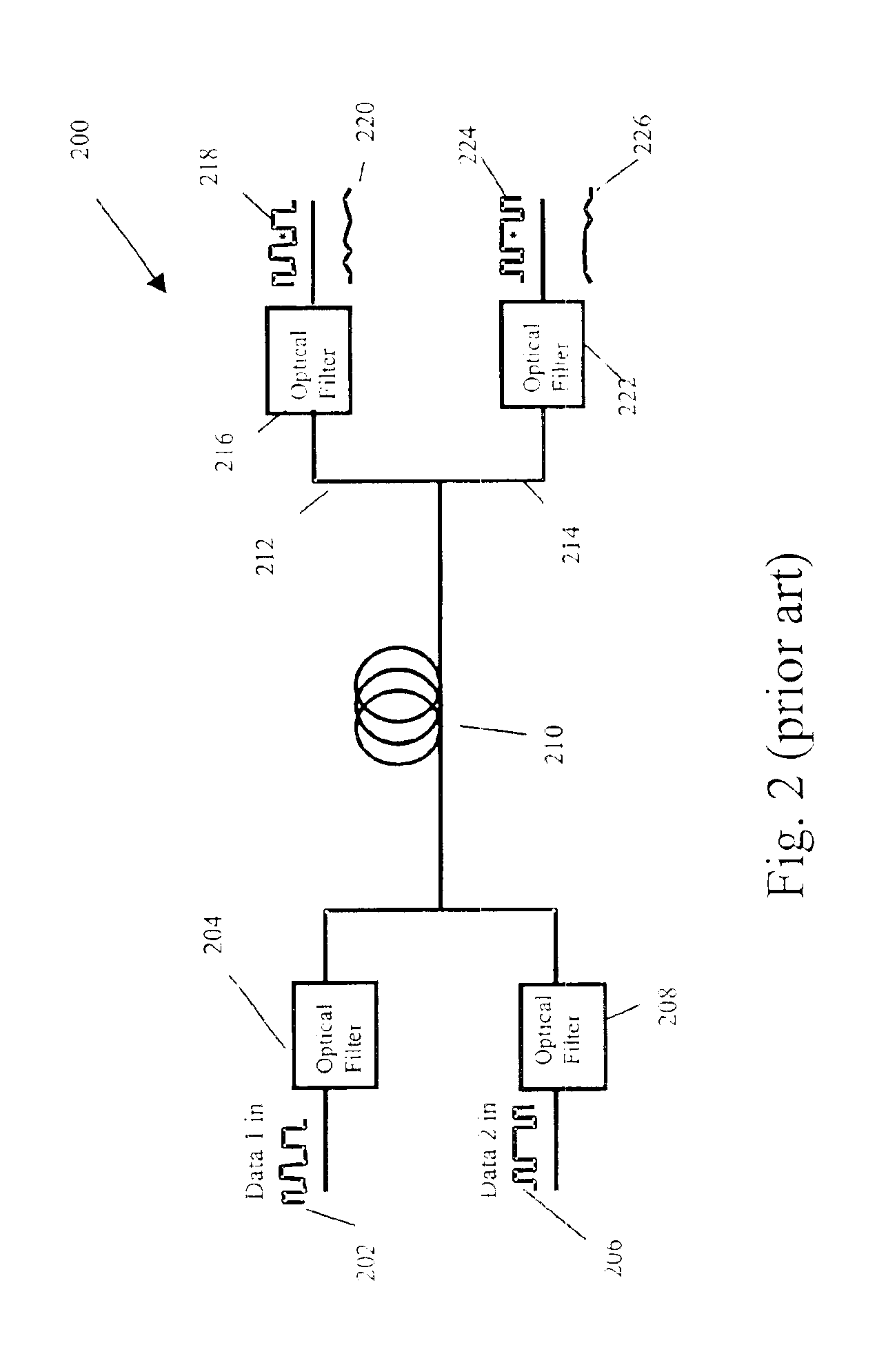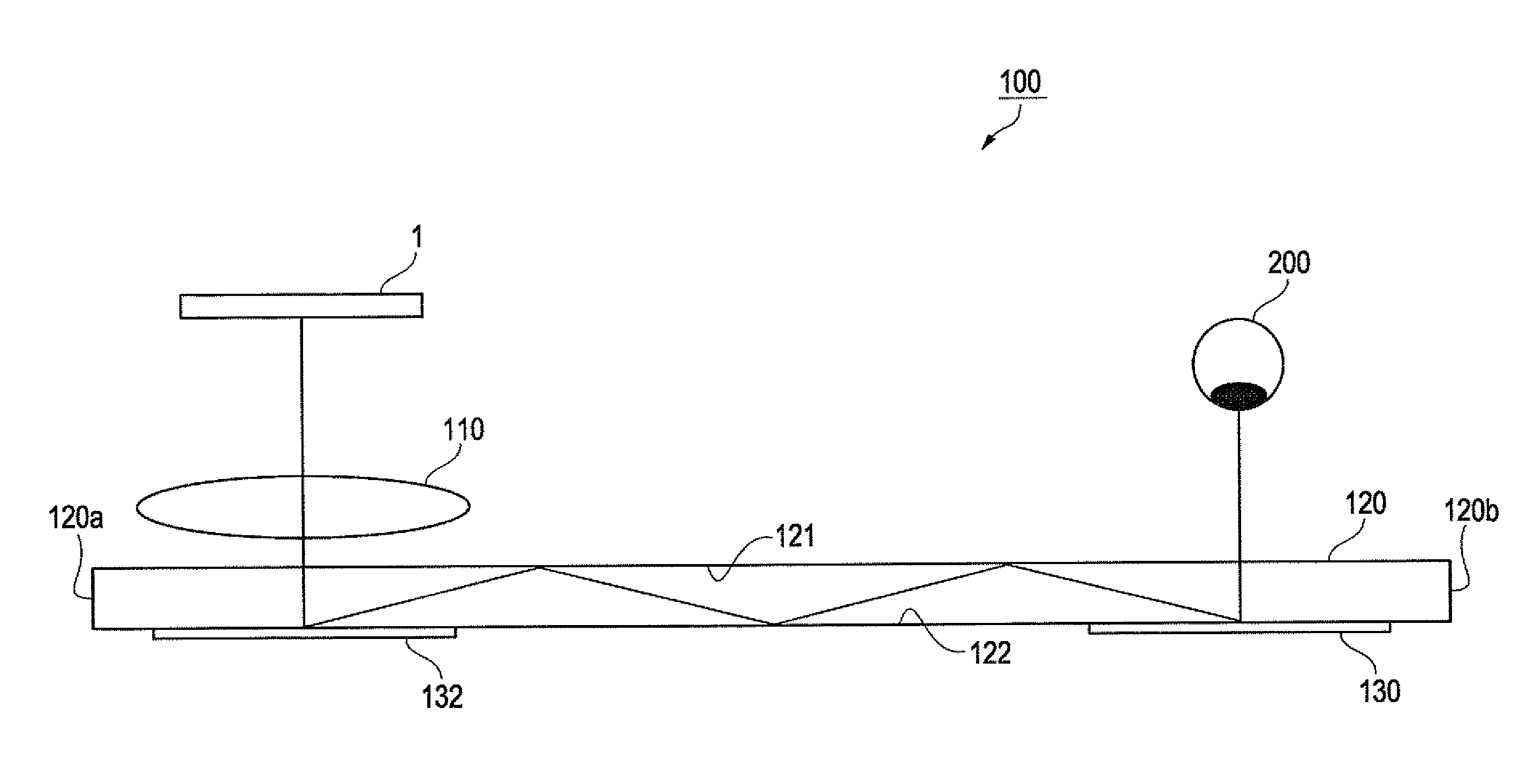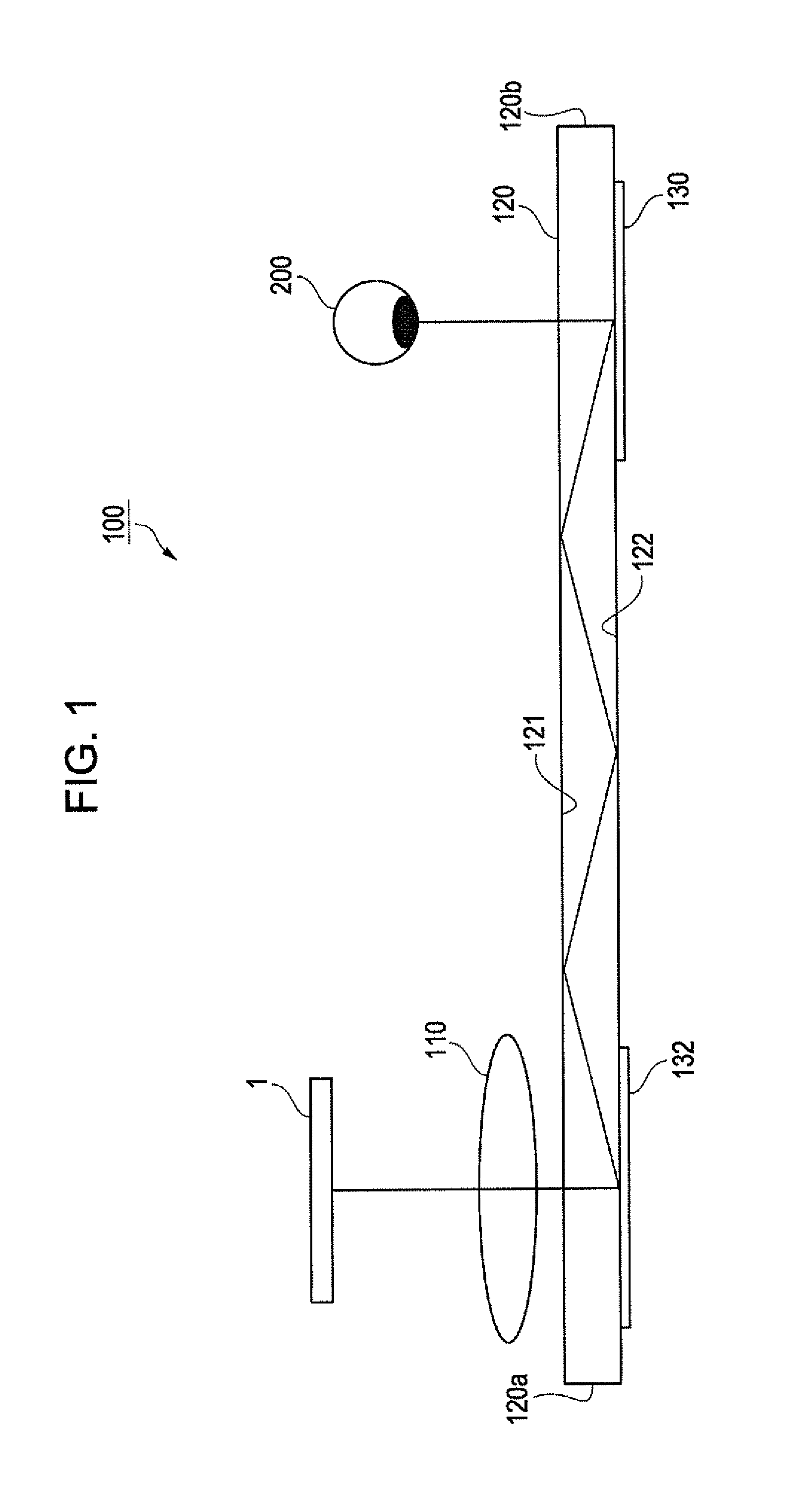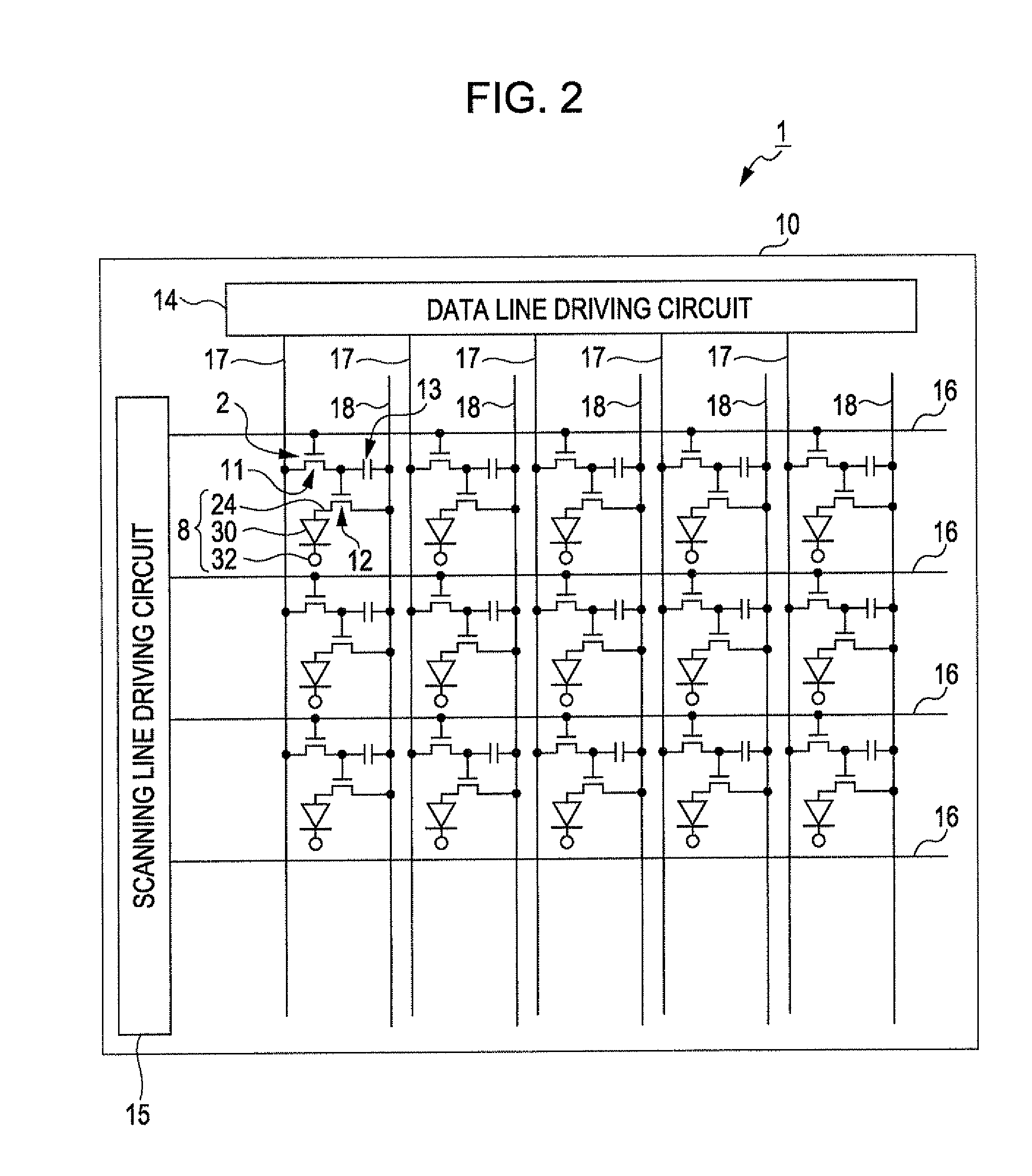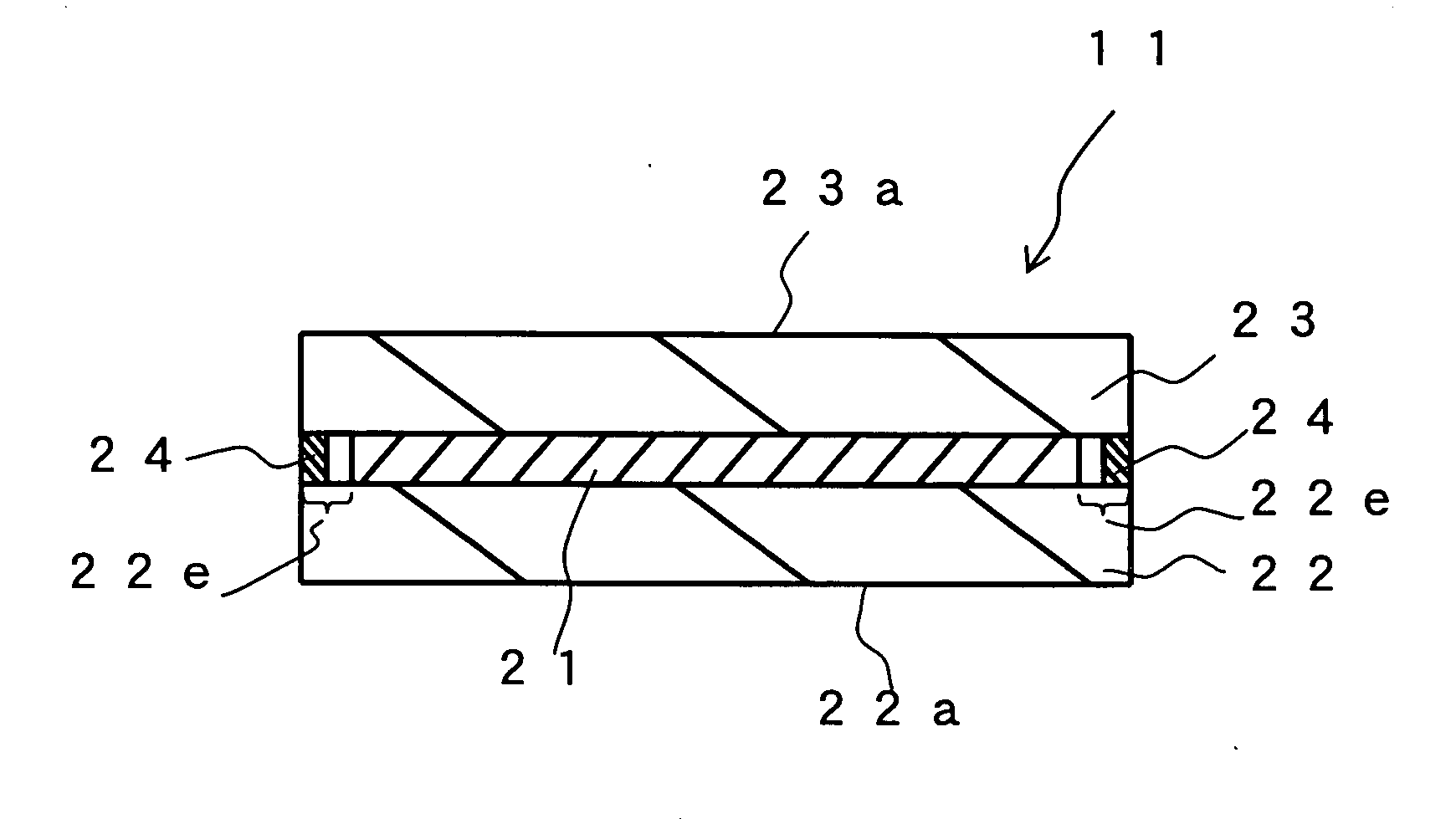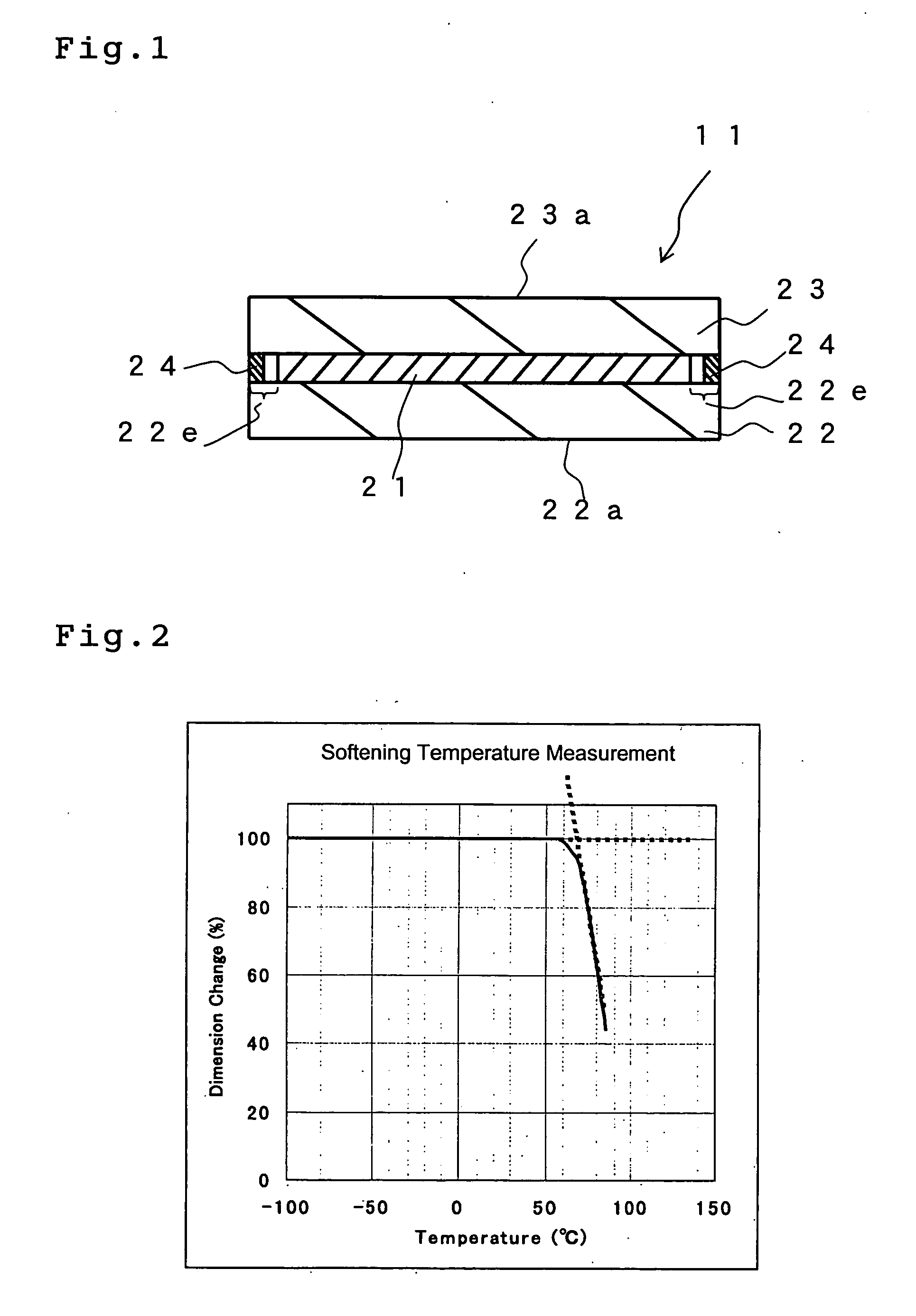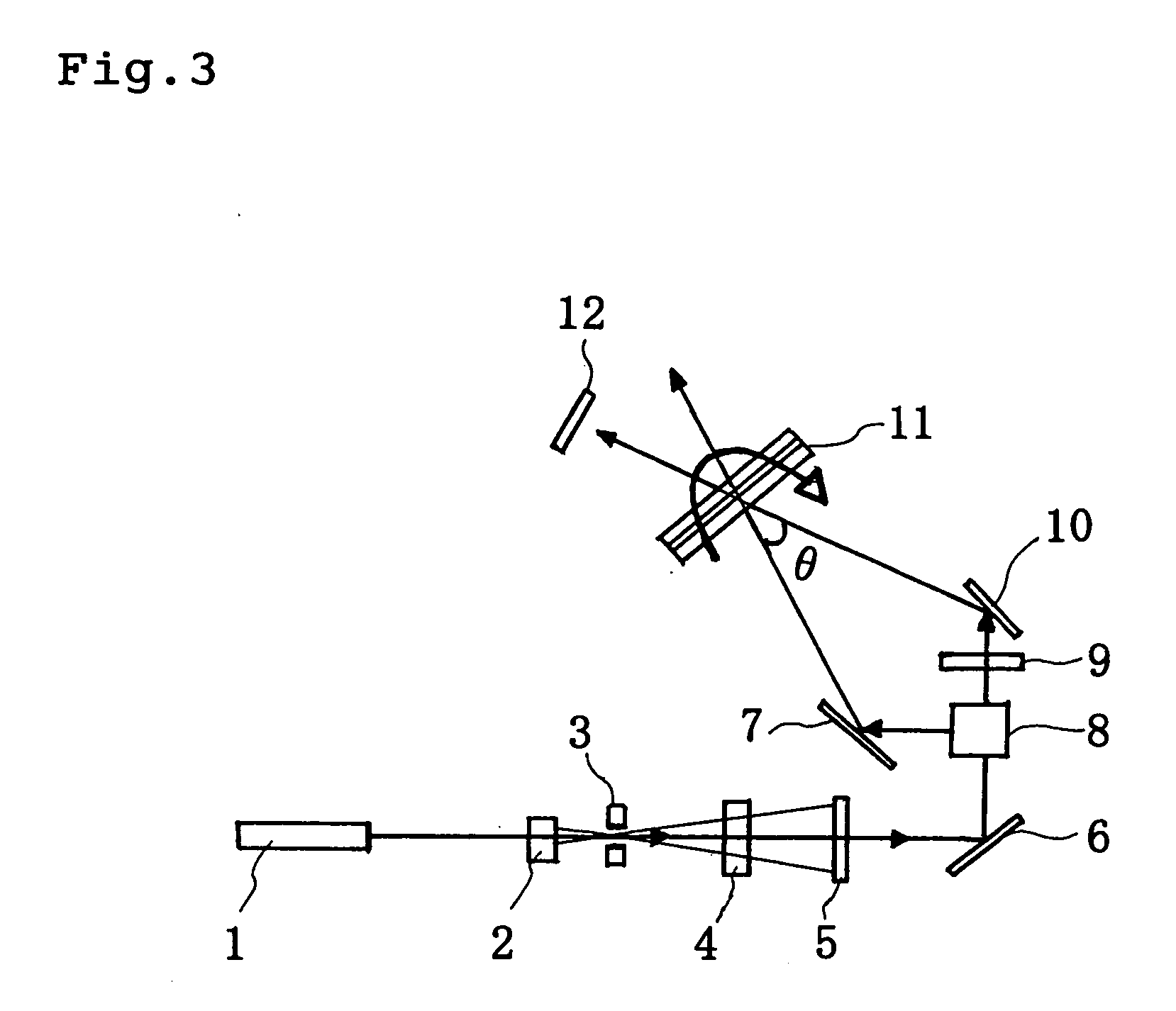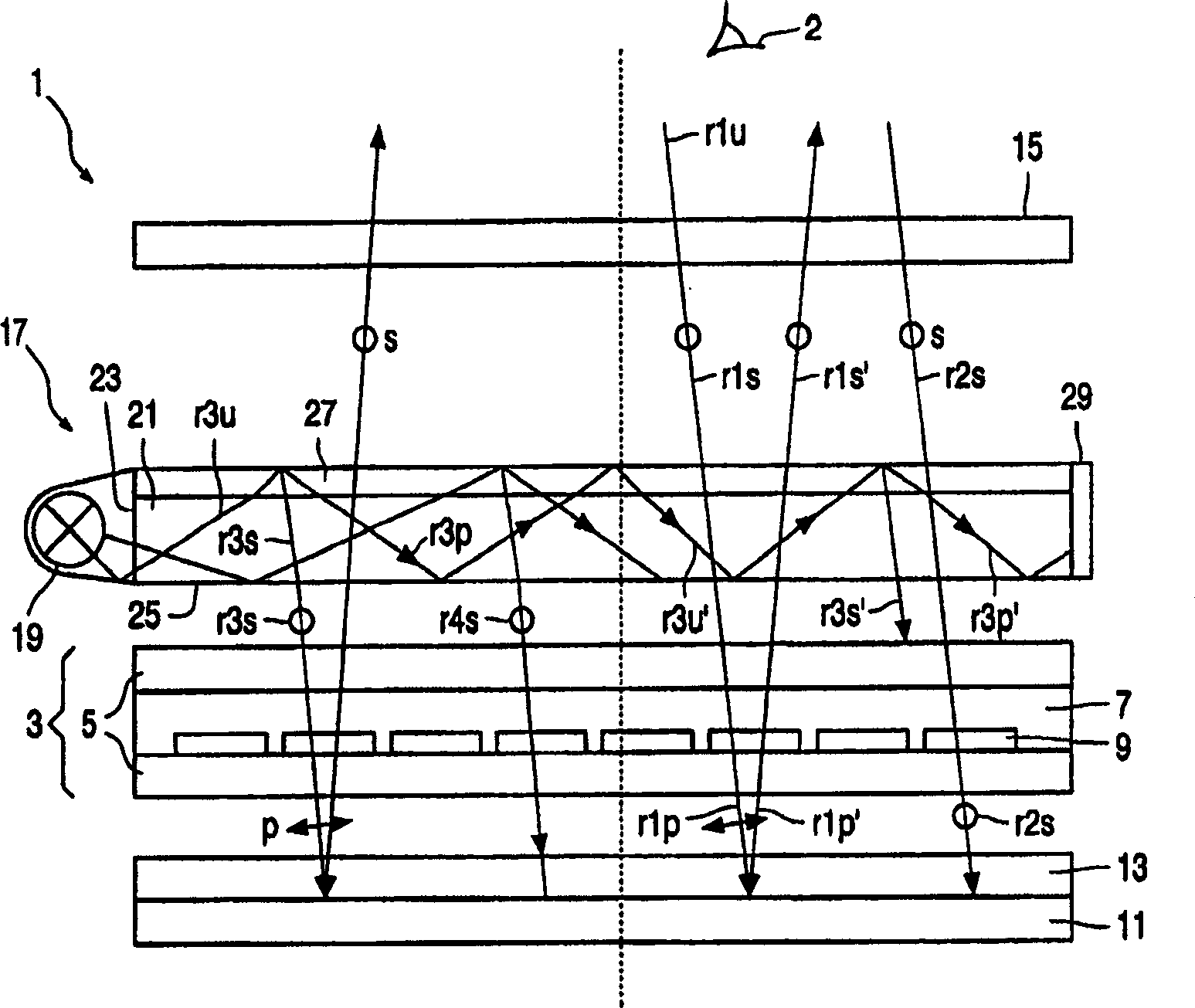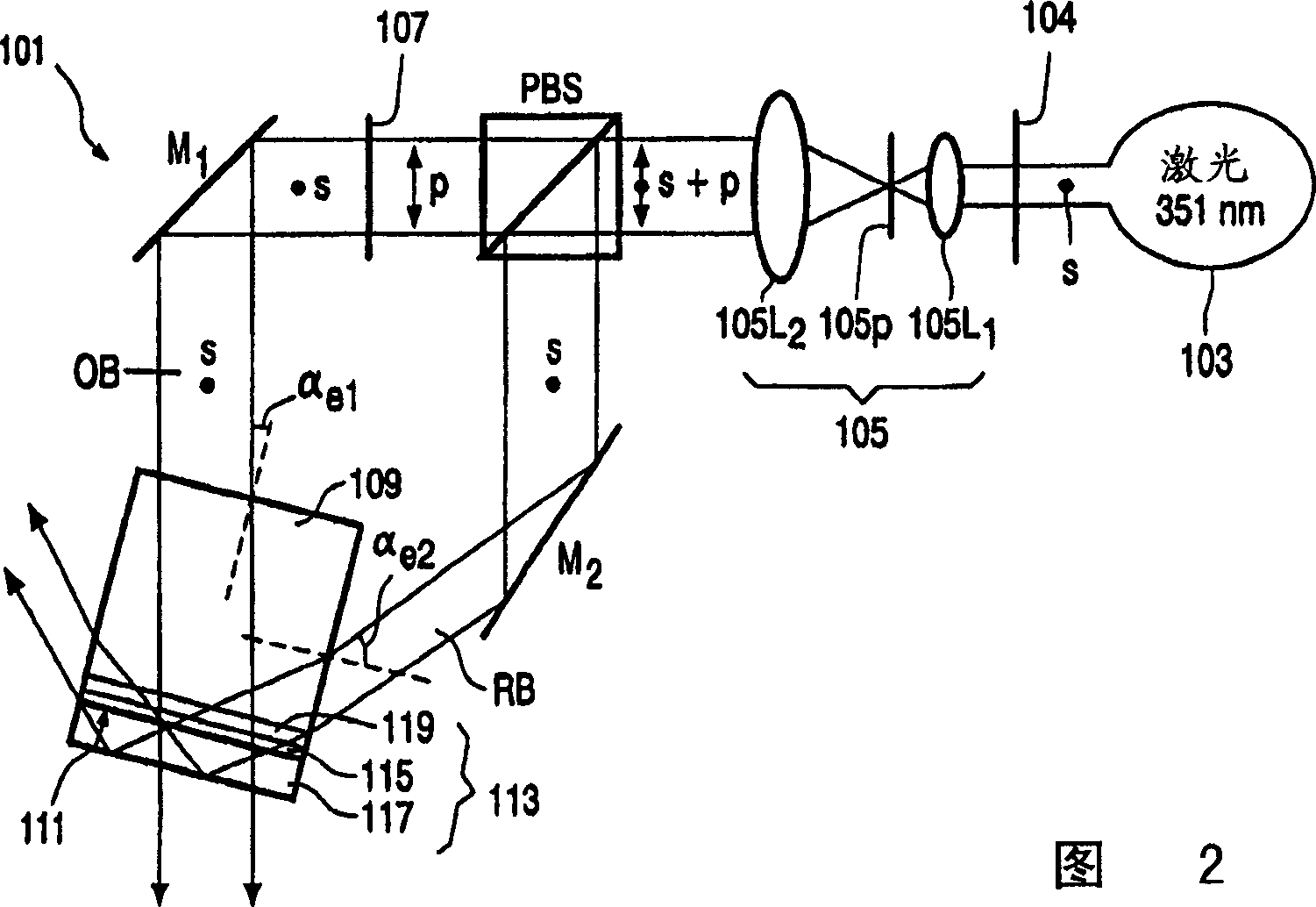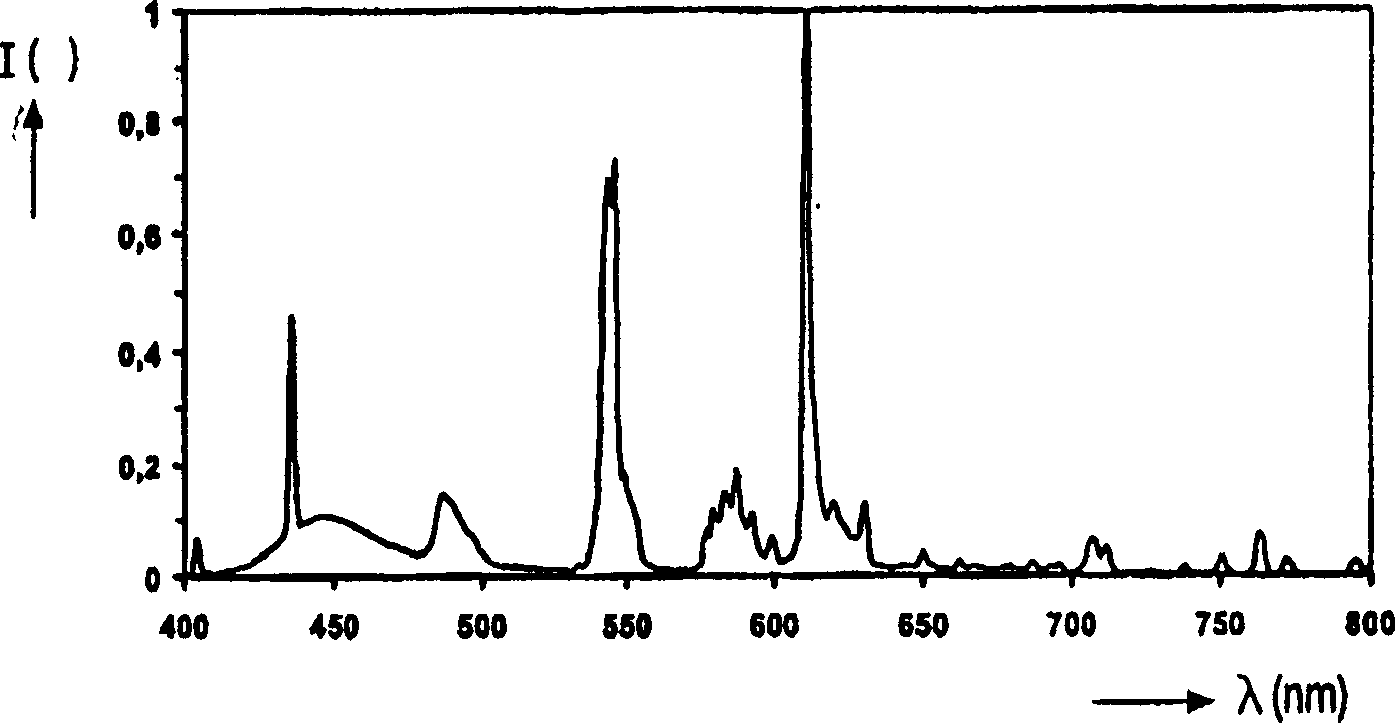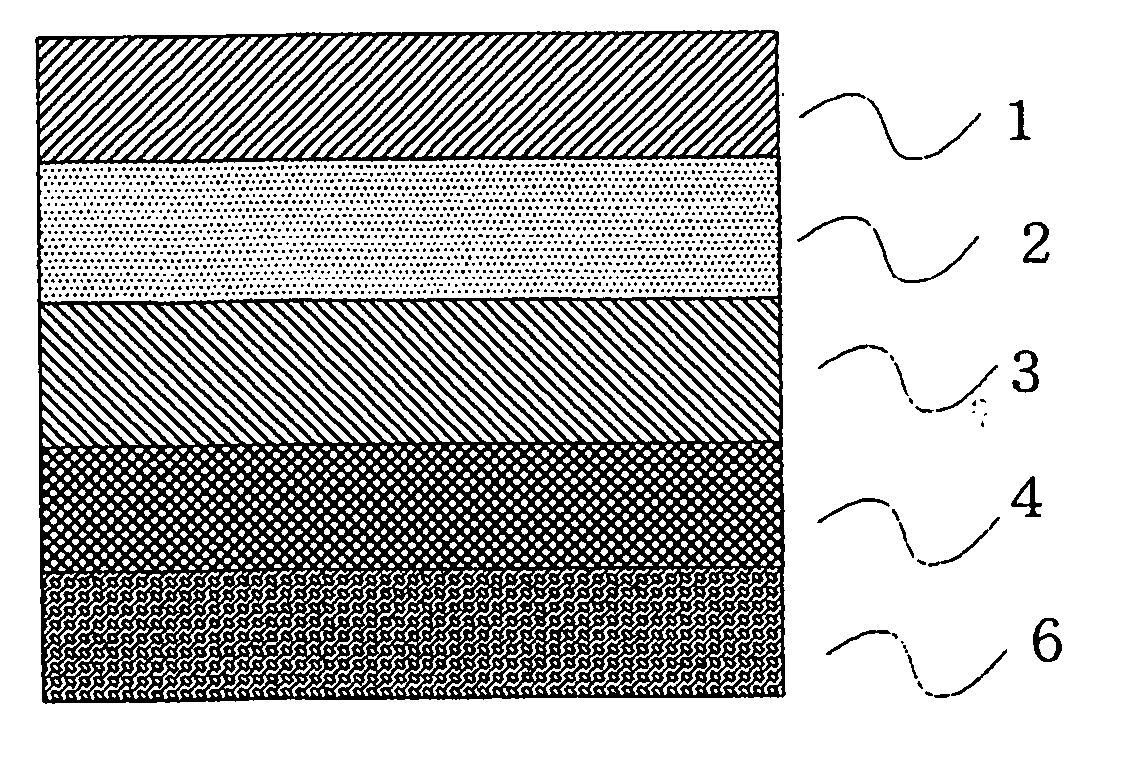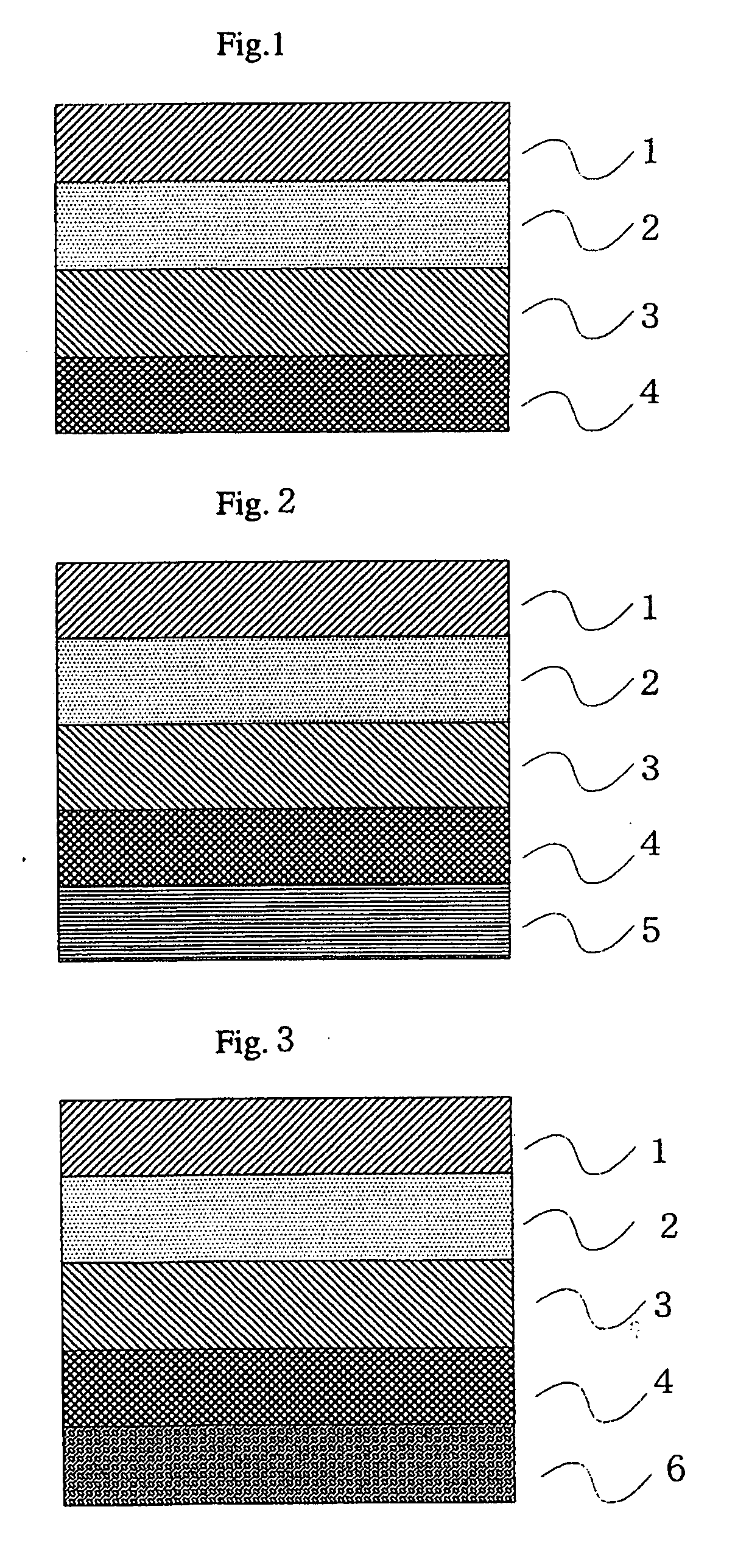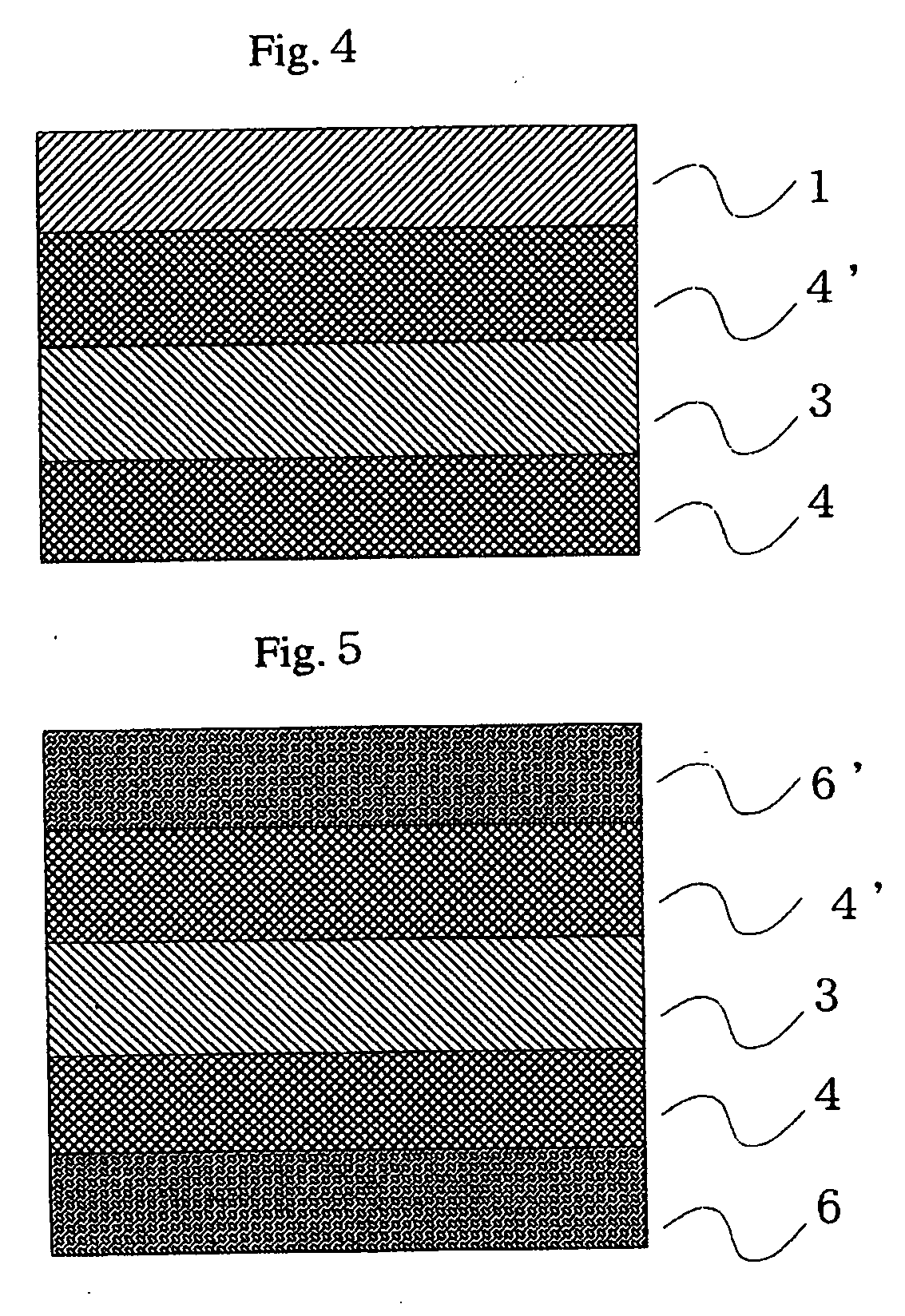Patents
Literature
251 results about "Volume hologram" patented technology
Efficacy Topic
Property
Owner
Technical Advancement
Application Domain
Technology Topic
Technology Field Word
Patent Country/Region
Patent Type
Patent Status
Application Year
Inventor
Volume holograms are holograms where the thickness of the recording material is much larger than the light wavelength used for recording. In this case diffraction of light from the hologram is possible only as Bragg diffraction, i.e., the light has to have the right wavelength (color) and the wave must have the right shape (beam direction, wavefront profile). Volume holograms are also called thick holograms or Bragg holograms.
Optical device and virtual image display device
ActiveUS20060228073A1Improve imaging resolutionReduce aberrationDiffraction gratingsPlanar/plate-like light guidesGratingDisplay device
A virtual image display device is provided which displays a two-dimensional image for viewing a virtual image in a magnified form by a virtual optical system. The virtual image display device includes an optical waveguide (13) to guide, by internal total reflection, parallel pencil groups meeting a condition of internal total reflection, a first reflection volume hologram grating (14) to diffract and reflect the parallel pencil groups incident upon the optical waveguide from outside and traveling in different directions as they are so as to meet the condition of internal total reflection inside the optical waveguide and a second reflection volume hologram grating (15) to project the parallel pencil groups guided by internal total reflection inside the optical waveguide as they are from the optical waveguide by diffraction and reflection thereof so as to depart from the condition of internal total reflection inside the optical waveguide. Some of the parallel pencil groups guided through the optical waveguide being totally reflected different numbers of times for a period from external incidence upon the optical waveguide until outgoing from the optical waveguide.
Owner:SONY CORP
Optical device and virtual image display device
ActiveUS7418170B2Improve imaging resolutionReduce aberrationPlanar/plate-like light guidesDiffraction gratingsGratingTotal internal reflection
A virtual image display device is provided which displays a two-dimensional image for viewing a virtual image in a magnified form by a virtual optical system. The virtual image display device includes an optical waveguide (13) to guide, by internal total reflection, parallel pencil groups meeting a condition of internal total reflection, a first reflection volume hologram grating (14) to diffract and reflect the parallel pencil groups incident upon the optical waveguide from outside and traveling in different directions as they are so as to meet the condition of internal total reflection inside the optical waveguide and a second reflection volume hologram grating (15) to project the parallel pencil groups guided by internal total reflection inside the optical waveguide as they are from the optical waveguide by diffraction and reflection thereof so as to depart from the condition of internal total reflection inside the optical waveguide. Some of the parallel pencil groups guided through the optical waveguide being totally reflected different numbers of times for a period from external incidence upon the optical waveguide until outgoing from the optical waveguide.
Owner:SONY CORP
Holographic fingerprint device
InactiveUS6061463AIncrease contrastLittle and no aberration and distortionCharacter and pattern recognitionImage detectionIntensity modulation
PCT No. PCT / US95 / 02155 Sec. 371 Date Dec. 22, 1997 Sec. 102(e) Date Dec. 22, 1997 PCT Filed Feb. 21, 1995 PCT Pub. No. WO95 / 22804 PCT Pub. Date Aug. 24, 1995A method and ultra-compact system has been developed for illuminating and detecting the surface topography of an object such as the finger (4) of an individual. The system (8) is capable of producing high-contrast images which can be electronically transmitted in real-time, or stored using electronic or photographic recording devices. Light traveling within a light transmitting substrate (2) is redirected by a slanted-fringed light diffractive grating preferably embodied within a volume hologram (3). The volume hologram (3), either of the reflection or transmission type, is attached to the light transmitting substrate (2). and functions to diffract light striking thereupon and illuminate an object having topographical surface structure. After being spatially and intensity modulated in accordance with topographical details of the illuminated object, the insulated light passes back through the light transmitting substrate (2) and the volume hologram (3), onto an image detection array. for subsequent analysis. Each of the disclosed embodiments has a compact geometry suitable for use in diverse object identification applications.
Owner:KREMEN MR STANLEY H
Optical device, and virtual image display
ActiveUS20060291021A1Reduce color unevennessReduce unevennessDiffraction gratingsOptical light guidesGratingLight beam
There is provided an optical device including an optical waveguide upon which a group of parallel light beams different in traveling direction from each other are incident and from which the group of parallel light beams go out after propagated by repeated total reflection through it. The optical waveguide includes a first reflection-type volume hologram grating, and a second reflection-type volume hologram grating. The pitches of interference fringes on the hologram surfaces of the first and second reflection-type volume hologram gratings are equal to each other. In at least the second reflection-type volume hologram grating, the angle formed between the interference fringes and hologram surfaces are varied continuously or stepwise within the hologram in relation to the main incident light beam so as to meet the Bragg condition. Therefore, it is possible to reduce the unevenness of color and brightness due to angles of view.
Owner:SONY CORP
Optical device and image display apparatus
InactiveUS20070070504A1Increase rangeReduce thicknessDiffraction gratingsOptical light guidesLight guideSlant angle
An optical device includes a light guide plate, and first and second reflective volume hologram diffraction grating members. The first member has interference fringes extending from therewithin towards surfaces thereof and arranged at an equal pitch. Each interference fringe and each surface of the first member form an inclination angle therebetween. The first member has the following conditions. (a) In an outer region positioned farther away from the second member than a minimum inclination angle region having a minimum inclination angle, the inclination angles of the interference fringes increase with increasing distance from the minimum inclination angle region. (b) In an inner region positioned closer to the second member than the minimum inclination angle region, the inclination angles of the interference fringes include a maximum inclination angle in an inner area disposed adjacent to the minimum inclination angle region and decrease with increasing distance from the minimum inclination angle region.
Owner:SONY CORP
Image displaying apparatus and optical Apparatus
InactiveUS20110019250A1Small sizeReduce weightMirrorsOptical light guidesOptoelectronicsDiffraction grating
The image displaying apparatus includes an image production apparatus, a first light conduction section and a second light conduction section. The first light conduction section includes a first light conduction plate which propagates part of incident light thereto by total reflection in the inside thereof and emits the propagated light, and a reflection type volume hologram diffraction grating disposed on the first light conduction plate. The second light conduction section includes a second light conduction plate, a first deflection section and a second deflection section.
Owner:SONY CORP
Electrically switchable polymer-dispersed liquid crystal materials including switchable optical couplers and reconfigurable optical interconnects
InactiveUS6821457B1Lower switching voltageDiffusing elementsPhotomechanical apparatusWavelengthOptical coupler
A new photopolymerizable material allows single-step, fast recording of volume holograms with properties that can be electrically controlled. Polymer-dispersed liquid crystals (PDLCs) in accordance with the invention preferably comprise a homogeneous mixture of a nematic liquid crystal and a multifunctional pentaacrylate monomer in combination with photoinitiator, coinitiator and cross-linking agent. Optionally, a surfactant such as octancic acid may also be added. The PDLC material is exposed to coherent light to produce an interference pattern inside the material. Photopolymerization of the new PDLC material produces a hologram of clearly separated liquid crystal domains and cured polymer domains. Volume transmission gratings made with the new PDLC material can be electrically switched between nearly 100% diffraction efficiency and nearly 0% diffraction efficiency. By increasing the frequency of the switching voltage, switching voltages in the range of 50 Vrms can be achieved. The optional use of a surfactant allows low switching voltages at lower frequencies than without a surfactant. In an alternative embodiment, a PDLC material in accordance with the invention can be utilized to form reflection gratings, including switchable reflection gratings. In still further embodiments, a PDLC material in accordance with the invention can be used to form switchable subwavelength gratings. By further processing, static transmission, reflection, and subwavelength PDLC materials can be formed. In addition, PDLC materials in accordance with the present invention can be used to form switchable slanted transmission gratings suitable for switchable optical coupling and reconfigurable optical interconnects.
Owner:LEIDOS
Holographic light panels and flat panel display systems and method and apparatus for making same
InactiveUS20050259302A9Reduce physical sizeMechanical apparatusChromate compound compositionsColor imageDisplay device
An illumination panel for illuminating an object, comprising a substrate, a light diffractive grating and a light source. The substrate is made from an optically transparent material having first and second area surfaces disposed substantially parallel to each other and a light input surface for conducting a light beam into the substrate. The light diffractive grating is mounted to the first areal surface and has a slanted fringe structure embodied therein for diffracting the light beam falling incident thereto, along a first diffractive order of the slanted fringe structure. The light source produces a light beam for transmission through the input surface and direct passage through the substrate to the slanted fringe structure so as to produce an output light beam of areal extent that emerges from either the first or second areal surface along the first diffractive order, for use in illuminating an object. A spatial-intensity modulation panel can be mounted to the illumination panel to form a color image display device. In the illustrative embodiments, the light diffractive grating is a volume hologram that is pixelated and spectrally-tuned in order to carry out spectral filtering functions within the color image display device.
Owner:KREMEN STANLEY H
Photosensitive composition for volume hologram recording and photosensitive medium for volume hologram recording
InactiveUS7323275B2Increase resistanceHigh strengthPhotosensitive materialsPhotomechanical apparatusMetal chelateHydroxy group
A photosensitive composition and A photosensitive medium for volume hologram recording comprises a photopolymerization reactive compound (a monomer) and any one of the following binder: (a) an organic-inorganic hybrid polymer obtainable by copolymerizing an organometallic compound of the formula 1 “R1m M1 (OR2)” and an ethylenic monomer and / or its hydrolyzed polycondensate; (b) an organic-inorganic hybrid polymer obtainable by copolymerizing an organometallic compound of the formula 3 “R4m Si (OR5)n” and an ethylenic monomer and / or its hydrolyzed polycondensate; and (c) a binder resin bonded to a metal or a combination use of a binder resin containing a hydroxyl group and / or carboxyl group and a metal chelate compound.
Owner:DAI NIPPON PRINTING CO LTD
Transflective holographic film for head worn display
InactiveUS20150362734A1Improve toleranceEasy to viewOptical articlesOptical partsProjection opticsHolographic screen
A display panel assembly comprises a transflective holographic screen, i.e., a transparent screen that reflects light from a projection system, comprising at least a volume hologram, a first protective element and a second protective element, each arranged in contact with the volume hologram such that the volume hologram is sandwiched between the first protective element and the second protective element. The display panel assembly further comprises a projection system focusing an image on the volume hologram comprising at least projection optics, mounting means arranged to fixedly mount the projection system relatively to the transflective holographic screen. The volume hologram comprises a plurality of diffractive patterns disposed in sequence across the volume hologram, each of the plurality of diffractive patterns being configured to diffuse the light rays from the projection system in a determined direction corresponding to the specific diffractive pattern and oriented towards a position of an intended eye of a user wearing the display panel assembly.
Owner:GOOGLE LLC
Observation optical system
An observation optical system includes an image display element, a relay optical system having a plurality of lenses 4 and a first reflection-type volume hologram element (HOE), and an eyepiece optical system having a second reflection-type HOE. The observation optical system is arranged along the face to the side head of the observer. The first reflection-type HOE has a power and is configured to compensate for chromatic aberrations. The plurality of lenses is configured to compensate for decentered aberrations and chromatic aberrations. The second reflection-type HOE is a configured to exert power on bundles of rays and to compensate for chromatic aberrations. A light-transmitting plate is sandwiched between the first reflection-type HOE and the second refection-type HOE.
Owner:OLYMPUS CORP
Grazing incidence holograms and system and method for producing the same
InactiveUS6151142AThin geometryUltra-compact overall geometryMechanical apparatusHolographic light sources/light beam propertiesCouplingLight diffraction
A method and system are disclosed for recording and displaying grazing-incidence (i.e., steep reference beam angle) holograms supported on a substrate having thin edge-illuminatable geometry. The system and process use thin edge-illuminated substrates that facilitate optimal coupling of the reference light beam at steep angles approaching grazing incidence, while maximizing the contrast of the slanted fringe structures thereof. Different recording techniques are employed when the index of refraction of the substrate is greater than that of the recording medium, than when the index of refraction of the substrate is less than that of the recording medium. A recording and playback system of complementary design is provided for recording slanted-fringe volume holograms under relaxed conditions, without compromising the light diffraction efficiency of the holograms under different playback conditions.
Owner:KREMEN MR STANLEY H
Observation optical system
An observation optical system includes an image display element b 5, a relay optical system 6 having a plurality of lenses 4 and a first reflection-type volume hologram element (HOE) 8, and an eyepiece optical system having a second reflection-type HOE 9. The observation optical system is arranged along the face to the side head of the observer. The first reflection-type HOE 8 has a power and is configured to compensate for chromatic aberrations. The plurality of lenses is configured to compensate for decentered aberrations and chromatic aberrations. The second reflection-type HOE 9 is configured to exert power on bundles of rays and to compensate for chromatic aberrations. A light-transmitting plate 3 is sandwiched between the first reflection-type HOE 8 and the second reflection-type HOE 9. The light-transmitting plate 3 is configured so that light from the first reflection-type HOE 8 causes total reflection inside the light-transmitting plate 3 odd-numbered times equal to or greater than three times. These features provide an observation optical system that is so compact and lightweight as to be applicable to a head-mount-type virtual image observation apparatus, that provides a bright image with high resolution, and that is easily assembled.
Owner:OLYMPUS CORP
Holographic spectral filter
Method and apparatus are contemplated for receiving from an input, an optical signal in a volume hologram comprising a transfer function that may comprise temporal or spectral information, and spatial transformation information; diffracting the optical signal; and transmitting the diffracted optical signal to an output. A plurality of inputs and outputs may be coupled to the volume hologram. The transformation may be a linear superposition of transforms, with each transform acting on an input signal or on a component of an input signal. Each transform may act to focus one or more input signals to one or more output ports. A volume hologram may be made by various techniques, and from various materials. A transform function may be calculated by simulating the collision of a design input signal with a design output signal.
Owner:STEYPHI SERVICES DE
Optical device and image display apparatus
InactiveUS7502168B2Reduce resolutionShorten the lengthDiffraction gratingsOptical light guidesLight guideClassical mechanics
An optical device includes a light guide plate, and first and second reflective volume hologram diffraction grating members. The first member has interference fringes extending from therewithin towards surfaces thereof and arranged at an equal pitch. Each interference fringe and each surface of the first member form an inclination angle therebetween. The first member has the following conditions. (a) In an outer region positioned farther away from the second member than a minimum inclination angle region having a minimum inclination angle, the inclination angles of the interference fringes increase with increasing distance from the minimum inclination angle region. (b) In an inner region positioned closer to the second member than the minimum inclination angle region, the inclination angles of the interference fringes include a maximum inclination angle in an inner area disposed adjacent to the minimum inclination angle region and decrease with increasing distance from the minimum inclination angle region.
Owner:SONY CORP
Optical device, and virtual image display
ActiveUS7453612B2Reduce color unevennessReduce unevennessDiffraction gratingsOptical light guidesGratingWaveguide
An optical device including an optical waveguide upon which a group of parallel light beams different in traveling direction from each other are incident and from which the group of parallel light beams go out after propagated by repeated total reflection through it. The optical waveguide includes a first reflection-type volume hologram grating, and a second reflection-type volume hologram grating. The pitches of interference fringes on the hologram surfaces of the first and second reflection-type volume hologram gratings are equal to each other. In at least the second reflection-type volume hologram grating, the angle formed between the interference fringes and hologram surfaces are varied continuously or stepwise within the hologram in relation to the main incident light beam so as to meet the Bragg condition. Therefore, it is possible to reduce the unevenness of color and brightness due to angles of view.
Owner:SONY CORP
Light source device, and two-dimensional image display device
There is provided a light source device which can miniaturize a two-dimensional image display device as small as possible. The light source device is provided with three coherent light sources (11a), (11b), and (11c) corresponding to red, blue, and green; prisms (12a) and (12c) for reflecting lights emitted from the coherent light sources (11a) and (11c); and a diffraction part (20) comprising a single volume hologram on which plural gratings are multiply-formed, which gratings diffract the light emitted from the coherent light source (11b), and the lights that are emitted from the coherent light sources (11a) and (11c) and reflected by the prisms (12a) and (12b) so that these lights propagate in the same optical path.
Owner:PANASONIC CORP
Observation optical system using volume hologram
Owner:OLYMPUS CORP
Electrically switchable polymer dispersed liquid crystal materials including transmissive holographic gratings
InactiveUS6667134B1Fast curingImprove clarityLiquid crystal compositionsPhotomechanical apparatusElectricityCrystallography
A new photopolymerizable material allows single-step, fast recording of volume holograms with properties that can be electrically controlled. Polymer-dispersed liquid crystals (PDLCs) in accordance with the invention preferably comprise a homogeneous mixture of a nematic liquid crystal and a multifunctional pentaacrylate monomer, in combination with photoinitiator, coinitiator and cross-linking agent. Optionally, a surfactant such as octanoic acid may also be added. The PDLC material is exposed to coherent light to produce an interference pattern inside, the material. Photopolymerization of the new PDLC material produces a hologram of clearly separated liquid crystal domains and cured polymer domains. Volume transmission gratings made with the new PDLC material can be electrically switched between nearly 100% diffraction efficiency and nearly 0% diffraction efficiency. By increasing the frequency of the switching voltage, switching voltages in the range of 50 Vrms can be achieved.
Owner:LEIDOS
Switchable volume hologram materials and devices
InactiveUS20030197157A1Fast curingImprove clarityLiquid crystal compositionsStatic indicating devicesCrystallographyActive agent
A new photopolymerizable material allows single-step, fast recording of volume holograms with properties that can be electrically controlled. Polymer-dispersed liquid crystals (PDLCs) in accordance with the invention preferably comprise a homogeneous mixture of a nematic liquid crystal and a multifunctional pentaacrylate monomer, in combination with photoinitiator, coinitiator and cross-linking agent. Optionally, a surfactant such as octanoic acid may also be added. The PDLC material is exposed to coherent light to produce an interference pattern inside the material. Photopolymerization of the new PDLC material produces a hologram of clearly separated liquid crystal domains and cured polymer domains. Volume transmission gratings made with the new PDLC material can be electrically switched between nearly 100% diffraction efficiency and nearly 0% diffraction efficiency. By increasing the frequency of the switching voltage, switching voltages in the range of 50 Vrms can be achieved. The optional use of surfactant allows low switching voltages at lower frequencies than without surfactant. In an alternative embodiment, a PDLC material in accordance with the invention can be utilized to form reflection gratings, including switchable reflection gratings. In still further embodiments, a PDLC material in accordance with the invention can be used to form switchable subwavelength gratings. By further processing, static transmission reflection, and subwavelength PDLC materials can be formed.
Owner:LEIDOS
Counterfeit-proof volume hologram multilayer structure, and counterfeit-proof volume hologram seal
InactiveUS20030134105A1Large outputOscillation stabilityStampsOther printing matterRefractive indexVolume hologram
The present invention relates to a counterfeit-proof volume hologram multilayer structure capable of securely preventing a counterfeiter from replicating a volume hologram recorded therein. The multilayer structure comprises a transparent surface protective layer, a volume hologram layer, and an adhesive layer which are sequentially laminated and is characterized in that particles having particle diameter of 350 nm or more are dispersed in at least one of the transparent surface protective layer, the volume hologram layer, and the adhesive layer and that the refractive index ratio (nF / nB) is set to be not less than 1.05 or not greater than 0.95, wherein nF is the refractive index of the particles and nB is the refractive index of the medium in which the particles are dispersed, or characterized in that at least either the refractive index ratio (nP / nH) between the transparent surface protective layer and the volume hologram layer or the refractive index ratio (nH / nA) between the volume hologram layer and the adhesive layer is set to be not less than 1.08, wherein nP is the refractive index of the transparent surface protective layer, nH is the refractive index of the volume hologram layer, and nA is the refractive index of the adhesive layer.
Owner:DAI NIPPON PRINTING CO LTD
Photosensitive composition for volume hologram recording and photosensitive medium for volume hologram recording
InactiveUS20020110740A1Increase resistanceHigh strengthPhotomechanical apparatusOrgano-metallic compound compositionChemical compoundMetal chelate
A photosensitive composition and A photosensitive medium for volume hologram recording comprises a photopolymerization reactive compound (a monomer) and any one of the following binder: (a) an organic-inorganic hybrid polymer obtainable by copolymerizing an organometallic compound of the formula 1 "R1m M1 (OR2)" and an ethylenic monomer and / or its hydrolyzed polycondensate; (b) an organic-inorganic hybrid polymer obtainable by copolymerizing an organometallic compound of the formula 3 "R4m Si (OR5)n" and an ethylenic monomer and / or its hydrolyzed polycondensate; and (c) a binder resin bonded to a metal or a combination use of a binder resin containing a hydroxyl group and / or carboxyl group and a metal chelate compound.
Owner:DAI NIPPON PRINTING CO LTD
System and methods for spectral beam combining of lasers using volume holograms
Volume holographic gratings are used to spectrally combine the emissions from multiple sources into a single output beam. Transmission or reflection gratings are utilized with either laser diode bars, fiber lasers, or fiber collimated light sources. The volume holographic spectral combiner can also be used to feedback and stabilize the wavelength of the sources in an external cavity configuration.
Owner:ONDAX
See-through display and head-up display
A see-through display including a light source for emitting light, a projection optical system for projecting the light emitted by the light source, and a volume hologram for deflecting the light projected by the projection optical system. The volume hologram has a linear expansion coefficient of α ( / ° C.) and interference fringes recorded with recording light having a wavelength of Λ (nm). The wavelength of the light emitted by the light source has a temperature dependency of K (nm / ° C.), and the wavelength Λ (nm) and the temperature dependency K (nm / ° C.) satisfy the relationship of 0≦K / Λ≦2α.
Owner:PANASONIC CORP
Photosensitive composition for volume hologram recording, volume hologram recording medium using same, method for manufacturing volume hologram recording medium, and hologram recording method
InactiveUS20150086907A1Stay rigidGood resistance stabilityPhotomechanical apparatusRecord information storagePolymerPhotochemistry
Provided is a photosensitive composition for volume hologram recording capable of forming a volume hologram recording medium that less shrinks upon curing in hologram recording (in hologram formation) and resists cracking. The photosensitive composition for volume hologram recording contains an alicyclic epoxy compound (A) represented by Formula (I); a thermal acid generator (B); a radically polymerizable compound (C); a radical polymerization initiator (D); and at least one epoxy compound (E) selected from the group consisting of compounds represented by Formula (1), epoxidized fatty acid esters, and epoxidized conjugated diene polymers.
Owner:DAICEL CHEM IND LTD
Method for forming a holographic spectral filter
Method and apparatus are contemplated for receiving from an input, an optical signal in a volume hologram comprising a transfer function that may comprise temporal or spectral information, and spatial transformation information; diffracting the optical signal; and transmitting the diffracted optical signal to an output. A plurality of inputs and outputs may be coupled to the volume hologram. The transformation may be a linear superposition of transforms, with each transform acting on an input signal or on a component of an input signal. Each transform may act to focus one or more input signals to one or more output ports. A volume hologram may be made by various techniques, and from various materials. A transform function may be calculated by simulating the collision of a design input signal with a design output signal.
Owner:OL SECURITY LIABILITY CO
Virtual image display apparatus
InactiveUS20130250380A1Increase image brightnessImprove lighting efficiencySolid-state devicesSemiconductor/solid-state device manufacturingLight guideOptical resonance
A virtual image display apparatus includes an organic EL device that outputs light having one kind of wavelength band, a light guide member, and a reflection-type volume hologram that is disposed on a first face of the light guide member and diffracts and reflects light of a predetermined wavelength band of the light that has entered. The organic EL device includes an optical resonance structure that causes the above-mentioned light of one-kind wavelength band to resonate.
Owner:SEIKO EPSON CORP
Hologram Recording Material and Hologram Recording Medium
InactiveUS20070243473A1Polymerization reactionPhotosensitive materialsRecord information storageRefractive indexHigh multiplicity
The present invention provides a hologram recording material which is not required to be subjected to pre-exposure treatment at the time of recording, attains high refractive index change, high sensitivity, low scattering, environment resistance, durability, low dimensional change, and high multiplicity, and is suitable for volume hologram recording. Also, the present invention provides a hologram recording medium. A hologram recording material comprising a matrix material having a softening temperature of 50° C. or higher, and a photopolymerizable monomer which is in a liquid phase state at room temperature. The matrix material is preferably contained in an amount of 50% by weight or more and 90% by weight or less of the whole of the hologram recording material. A softening temperature of the hologram recording material is preferably 0° C. or higher.
Owner:TDK CORPARATION
Waveguide, edge-lit illumination arrangement and display comprising such
InactiveCN1559000AReduce the numberImprove efficiencyMechanical apparatusElongate light sourcesDisplay deviceEffect light
A polarized light-emitting waveguide for use in an edge-lit lighting arrangement / 77) has polarization-selective outcoupling means including at least a volume hologram (87) for selectively diffracting waveguided light towards the exit surface of the waveguide with high contrast and efficiency. The light emitted by the waveguide is selectively emitted to one side thereof , highly polarized, highly collimated and may be homogeneously distributed across the exit surface. Also, light emission may be normal or near-normal to the exit surface. If combined with light recycling means (89) the contrast, brightness and / or efficiency of the edge-lit illumination arrangement may be further increased.
Owner:KONINKLIJKE PHILIPS ELECTRONICS NV
Volume hologram transfer foil, and volume hologram multilayer structure
The invention provides (1) a volume hologram transfer foil comprising a substrate and protective layer, a volume hologram layer and a heat seal layer stacked on the substrate in this order, wherein a multilayer structure comprising the protective layer, the volume hologram layer and the heat seal layer in this order is releasable from the substrate, and (2) a volume hologram transfer foil wherein the above protective layer is used as a heat seal layer. The heat seal layer comprises a polyester resin having a glass transition temperature of −10° C. to −30° C. With the invention, thermo-compression adhesion of the volume hologram layer to any application member, especially a polyester resin card is improved, so that the invention provides a volume hologram transfer foil useful for prevention of illegal copying, and a volume hologram multilayer structure formed using such a transfer foil.
Owner:DAI NIPPON PRINTING CO LTD
Features
- R&D
- Intellectual Property
- Life Sciences
- Materials
- Tech Scout
Why Patsnap Eureka
- Unparalleled Data Quality
- Higher Quality Content
- 60% Fewer Hallucinations
Social media
Patsnap Eureka Blog
Learn More Browse by: Latest US Patents, China's latest patents, Technical Efficacy Thesaurus, Application Domain, Technology Topic, Popular Technical Reports.
© 2025 PatSnap. All rights reserved.Legal|Privacy policy|Modern Slavery Act Transparency Statement|Sitemap|About US| Contact US: help@patsnap.com
